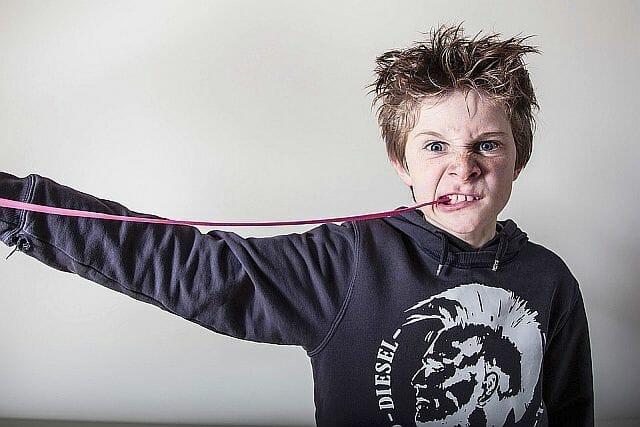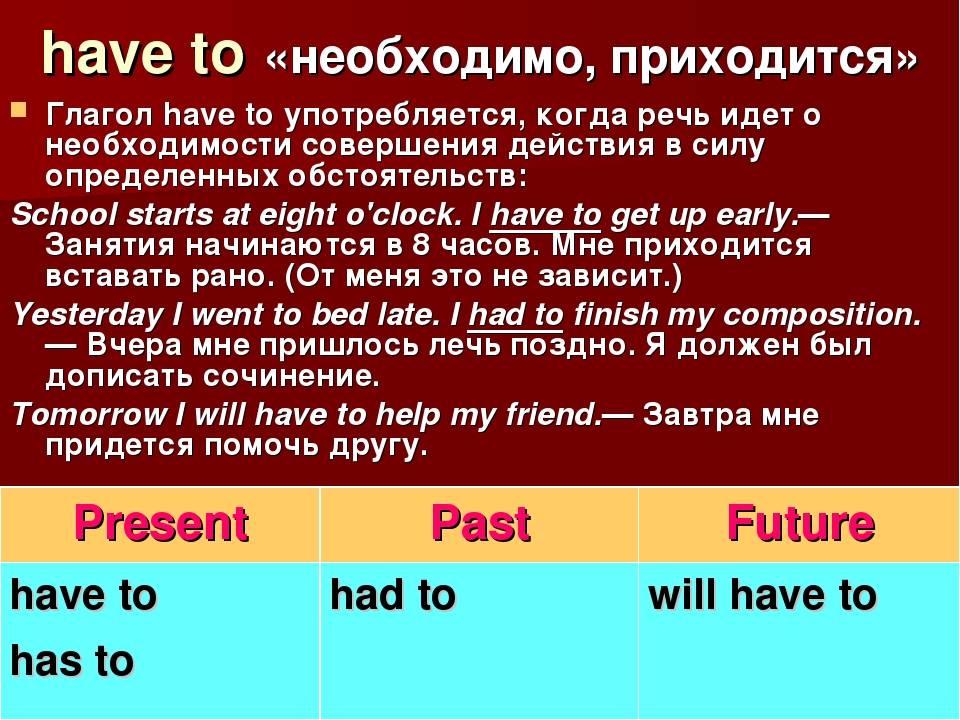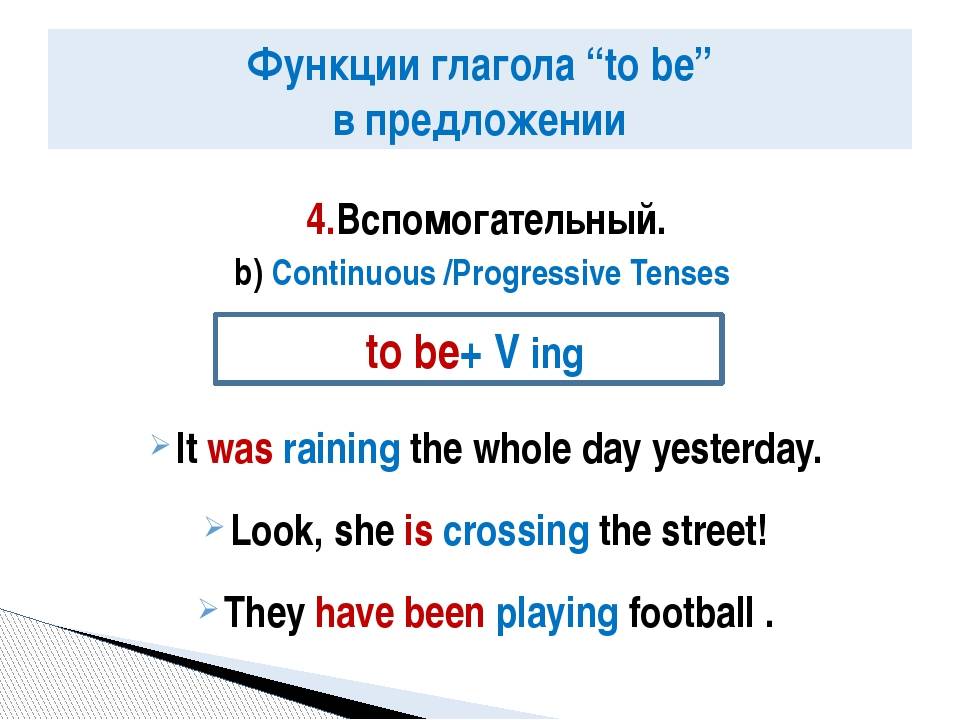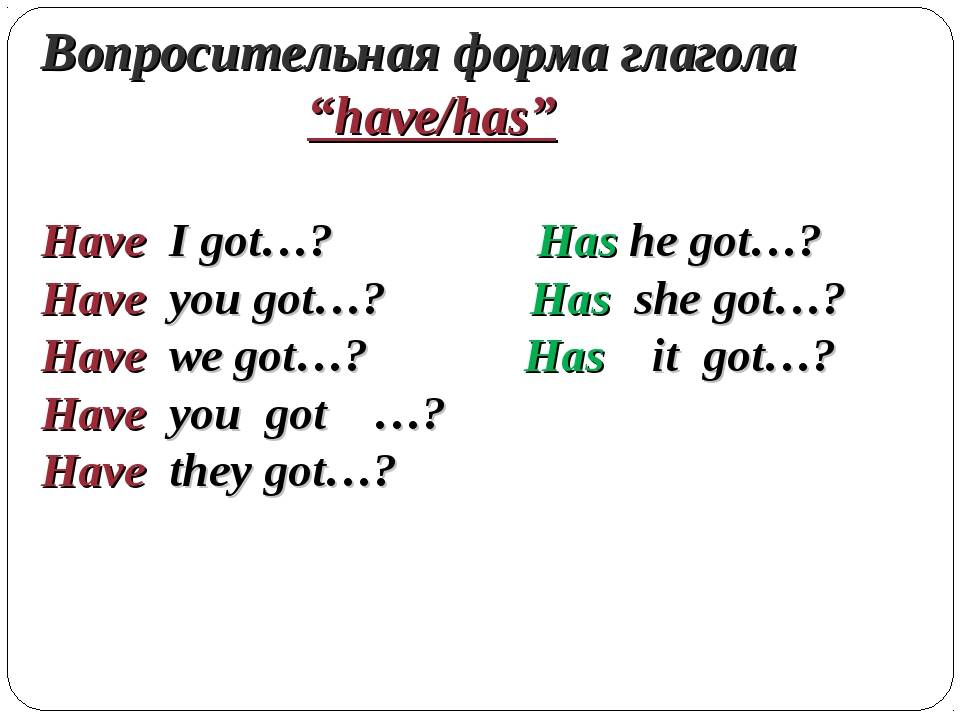You have got
You have got
have you (got)
1 have you (got)
The form «do you have» is both more formal and more technically correct, and therefore if you insisted on preferring one over the other, then «do you have» should be preferred to «have you got».
2 have you (got)
The form «do you have» is both more formal and more technically correct, and therefore if you insisted on preferring one over the other, then «do you have» should be preferred to «have you got».
The form «do you have» is both more formal and more technically correct, and therefore if you insisted on preferring one over the other, then «do you have» should be preferred to «have you got».
4 have you got all you require?
5 have you got any brass on you?
6 have you got a pencil on you?
7 Have you got pratique?
8 Have you got that?
9 have you got a match?
10 have you got a pencil to spare?
11 have you got the gen on the new house?
12 have you got transport?
13 have you got your cholera jabs yet?
14 have you got your cholera jobs yet?
15 have you got anything special to do?
16 Have you got anything special to do?
17 have you got pratic?
18 have you got pratique?
19 Have you got a screw loose?
20 have you got anything to declare?
См. также в других словарях:
Have You Got Any Castles? — Infobox Hollywood cartoon cartoon name = Have You Got Any Castles series = Merrie Melodies (re issued as Blue Ribbon) caption = Blue Ribbon title card director = Frank Tashlin story artist = Jack Miller animator = Ken Harris voice actor = Mel… … Wikipedia
how long have you got? — how long have you ˈgot? idiom (BrE) (NAmE how long do you ˈhave?) (informal) used to say that sth is going to take a long time to explain • … Useful english dictionary
what have you got to say for yourself? — spoken phrase used for asking someone what explanation or excuse they have for their bad behaviour Thesaurus: ways of asking questions and making requestshyponym to ask a question or questionssynonym Main entry: say … Useful english dictionary
You Got the Right One, Baby — was a popular slogan for Pepsico s Diet Pepsi brand in the United States and Canada from 1990 to 1993. A series of television ads featured singer Ray Charles, surrounded by models, singing a song about Diet Pepsi, entitled You Got the Right One,… … Wikipedia
Have You Seen Your Mother, Baby, Standing In The Shadow? — Single par The Rolling Stones extrait de l’album Big Hits (High Tide and Green Grass) Face B Who s Driving Your Plane? Sortie 23 septembre 1966 (UK) 24 septembre 1966 (US) … Wikipédia en Français
Have You Seen Your Mother, Baby, Standing in the Shadow — Have You Seen Your Mother, Baby, Standing in the Shadow? Have You Seen Your Mother, Baby, Standing in the Shadow? Single par The Rolling Stones extrait de l’album Big Hits (High Tide and Green Grass) Face B Who s Driving Your Plane? Sortie 23… … Wikipédia en Français
Have You Seen Your Mother Baby — Have You Seen Your Mother, Baby, Standing in the Shadow? Have You Seen Your Mother, Baby, Standing in the Shadow? Single par The Rolling Stones extrait de l’album Big Hits (High Tide and Green Grass) Face B Who s Driving Your Plane? Sortie 23… … Wikipédia en Français
Have You Seen Your Mother Baby? — Have You Seen Your Mother, Baby, Standing in the Shadow? Have You Seen Your Mother, Baby, Standing in the Shadow? Single par The Rolling Stones extrait de l’album Big Hits (High Tide and Green Grass) Face B Who s Driving Your Plane? Sortie 23… … Wikipédia en Français
you have only (got) yourself to blame — phrase to say or think that someone or something is responsible for an accident, problem, or bad situation He’s only got himself to blame if no one will talk to him. Thesaurus: ways of making or receiving criticism or blamehyponym to criticize,… … Useful english dictionary
Have You Seen Your Mother, Baby, Standing in the Shadow? — Single par The Rolling Stones extrait de l’album Big Hits (High Tide and Green Grass) Face B Who s Driving Your Plane? Sortie 23 septembre 1966 (UK) 24 septembre 1966 (US) Enregistr … Wikipédia en Français
You have got
Вчера соседи англичане устроили коллективное «лечение» моего английского. У них так периодически бывает. Слушают они, слушают мою «английскую речь», а потом собираются хором и начинают мой английский «лечить».
Короче, узнал кое-какие детали, которые думаю, могут быть интересны для многих.
Итак, как известно, в английском языке есть по крайней мере два способа сказать «у меня есть», «я имею».
Оба способа, как уверяют учебники — равнозначны и какой из них употреблять — это исключительно «на усмотрение говорящего». Впрочем, у выпускников российских школ такого выбора обычно нет, в российских массовых учебниках английского присутствует исключительно «I have anything», а второй вариант даже не упоминается.
Кроме того, в английском языке есть как минимум три способа спросить «есть ли у вас?», «имеется ли у вас?»
Большинство современных учебников английского уверяют, что на 100% корректный — только третий вариант. Второй — вполне допустим, но «более английский, чем американский». А первый — лучше не употреблять, так как он — устаревший или, как говорят преподаватели любимой мною онлайн школы Puzzle-English, — «остался в ограниченном употреблении только в Англии».
Так вот основной причиной, по которой меня начали «лечить» англичане было как раз то, что я старательно употреблял в общении с ними (в том числе и в переписке — это важно) именно «Do you have», старательно избегая «Have you…».
Итак, прежде всего меня заверили, что «Have you anything?» – it’s correct!
Потом я узнал, что с глаголом to have много проблем, так как основная его функция, это не иметь значение «иметь» (сорри за тавтологию), а образовывать перфекты, а кроме того, служить для выражения разных степеней обязанности и всяких действий не связанных с владением или обладанием.
Ну, например, если вы говорите «I have a bath», то это не означает, что у вас имеется ванна. Это означает, что вы моетесь, так как смысл слова have в этой устойчивой фразе не «иметь», а «употреблять».
А как быть, если вы хотите сообщить собеседнику, что вы являетесь именно владельцем ванны, а не моетесь в ней?
Вот для этого случая и служит конструкция «I have got a bath». Как только вы добавили got, то ваше have утратило все иные смыслы и осталось только «иметь». Именно в этом и есть смысл использования «have got».
Есть еще один момент. В английском языке, в отличие от славянских языков, гораздо чаще бывает, что смысл фразы зависит от контекста. Вспомните хотя бы знаменитую фразу-перевертыш «Panda eats shoots and leaves», которою с равным успехом можно перевести и как «Панда ест побеги и листья» и как «Панда ест, стреляет и уходит». Понять, о чем идет речь, не дослушав фразу полностью в английском (как и во французском) зачастую невозможно. И это — кошмар переводчиков-синхронистов.
Когда собеседник начинает фразу I have … это может означать, что угодно, что он что-то имеет или что-то употребляет, или хочет построить фразу в одном из перфектных времен. Причем, последнее — скорее «да», чем «нет».
Так вот, чтобы ваш собеседник сразу, не ожидая конца фразы понял, что вы хотите сказать ему об «имении», а не о чем-то другом, будет правильным поставить got сразу после have. Услышал собеседник «I have got» — и сразу все понял, не слушая до конца. А потому у моих знакомых англичан считается хорошим тоном говорить have got, а не просто have, каждый раз, когда речь идет о наличии чего-то у кого-то. Но только в устной речи. В письменной же наоборот используется просто Have, потому что там написанное сразу видно и голову относительно того, как используется Have ломать не надо.
На самом деле все еще сложнее, так как мои друзья англичане используют Have got по большей части с посторонними, с малознакомыми или незнакомыми людьми. А в тесном семейном или дружеском кругу предпочитают простой Have. Ну просто потому, что настоящие англичане общаются между собой при помощи телепатии.
Та же история и с построением вопросов.
Когда вы начинаете вопрос словами Have you…, собеседник инстинктивно ожидает, что после you последует глагол третьей формы, а не существительное. Он ожидает, что вы строите вопрос в перфекте, что-то вроде Have you lost your keys? Ну просто потому, что 90% случаев использования Have — это именно перфект. Ему надо прослушать все предложение до конца и переосмыслить его заново, чтобы понять, что спрашиваете не о том, что у него случилось или что он сделал, а о том, что он имеет.
Именно поэтому для того, чтобы сразу обозначить, что вопрос идет об «имении» принято после you поставить got.
Have you got anything? — и все сразу же понятно.
Но какой может быть got между истинными друзьями! Для общения в своем узком кругу друзей и соседей приято использовать старый добрый Have you anything? Это вовсе не «устаревшая» форма. И не «локальная» форма. Это форма общения в тесном кругу среди жителей старой доброй Англии. Это как перейти с «вы» на «ты».
Поэтому моё абсолютно правильное по всем учебниками «Do you have?» соседи-англичане инстинктивно воспринимали как мое стремление удержать дистанцию и избежать соседского сближения. И лишь понимание того, что я всего лишь иностранец с забавным англоподобным языком, не понимающий всех этих тонкостей, избавило меня от соседских обид.
Что же касается Do you have…, то это и вправду самая универсальная, и, следовательно, самая правильная для современного английского языка конструкция, которая будет нормально воспринята и понятна в любой точке мира как выпускнику советской школы, так и королеве Соединенного Королевства. Тем более, что Have you… по отношению к королеве будет однозначно воспринято, как совсем неуместная и нелепая фамильярность.
1″ :pagination=»pagination» :callback=»loadData» :options=»paginationOptions»>
Британия:’Do you have. ‘ теснит «Have you got’/ Britain:»Do you have’ vs. «Have you got. ‘
Насколько же американцы предпочитают (2) вместо (1)? Очень намного. Подсчёты показывают, что у американцев ‘Do you have. ‘ встречается в 31 раз чаще, чем ‘Have you got‘.
А насколько британцы предпочитают (1) вместо (2). Не так уж намного. У британцев ‘Have you got‘ встречается в 1,8 раза чаще, чем ‘Do you have. ‘ (т.е. меньше 2:1)
So we can say ‘Have you got?’ gives up to ‘Do you have?’ in Britain (but still leads the race)
Так что можно сказать, что ‘Have you got?’ в Британии уступает своё место ‘Do you have?’ (но пока всё ещё лидирует)
Here are some internet COMMENTS on this matter:
Вот несколько комментариев на эту тему из интернета:
3) I live in Britain. I am 70. When I was younger, I would tend to ask a shop assistant Have you got? to mean ‘Is there one in stock right now?’ but would have ask Do you have? to mean ‘Do you stock it at all?’
Я британец. Мне 70 лет. Когда был молодой, спрашивал в магазине Have you got? в смысле «У вас есть (сейчас)?». Do you have? для меня означало «У вас (вообще) бывает в продаже?»
Another distinction I used to make. Have you got the time? would invite an answer like Half past two, whereas Do you have the time? would invite something like Well, I can spare you five minutes.
Ещё одно различие я делал. Вопрос Have you got the time? подразумевал ответ типа «Половина третьего», а Do you have the time? ответ типа «Ну, пять минут для вас найдётся»
Nowadays I use do most of the time with have. I still use have got, but not nearly as much as fifty years ago.
Сегодня я почти всегда говорю Do you have. Могу сказать и have got, но далеко не так часто, как 50 лет назад
Активизируем английский
Сайт для тех, кто хочет научиться свободно говорить по-английски
Как пользоваться сайтом и учить слова
Какими онлайн-словарями пользоваться
Have / Have got
(useful phrases)
Part 2
✓ We had the audience laughing and clapping for five minutes.
✓ They had him doing all the hard work for them.
Chiefly AmE:
✓ I’ll have them call you tomorrow.
✓ Legend has it that no one could defeat them.
BrE (rumour):
✓ Rumour has it that we’ll have a new boss soon.
AmE (rumor):
✓ Rumor has it that we’ll have a new boss soon.
✓ Word has it they’re leaving soon. Do you know anything about it?
✓ Can I have the bill, please?
✓ Could I have my pen back?
✓ I’ll have a cup of coffee, please.
✓ They always want me to do all the hard work for them, but I won’t have it any longer!
✓ I won’t have people laughing at us all the time.
✓ I can’t have people laughing at us all the time.
✓ We weren’t surprised when she left him – he’d had it coming for a long time.
✓ We weren’t surprised when she left him – he’d had it coming to him for a long time.
✓ I’ve got it! We can do it in a different way.
✓ You have me there. I hadn’t thought of that.
✓ You’ve got me there. I hadn’t thought of that.
(логическое ударение: you `have me there; you’ve `got me there)
✓ I’ll have you know we’re two hours late.
✓ I didn’t know why he had it in for me.
(логическое ударение падает на in: he had it `in for me)
(the car’s had it = the car has had it)
✓ I’ve had it! I’m going to bed.
✓ He’s drunk again. I’ve had it with him!
✓ He’s drunk again. I’ve had it up to here with him!
Комментарии
1. Полезные выражения и конструкции с глаголом have и оборотом have got (первую часть см. в предыдущем уроке):
have smb laughing
– (дословно) иметь кого-л. смеющимся, плачущим и т.д.:
We had the audience laughing and clapping for five minutes – Публика смеялась и аплодировала нам пять минут
have smb doing smth
– заставлять кого-л. делать что-л.:
They had him doing all the hard work for them – Он делал за них всю тяжёлую работу
I’ll have them call you tomorrow – Я скажу им, чтобы они позвонили вам завтра
(chiefly AmE)
legend has it (that. )
– по легенде, по слухам, говорят (поговаривают), что.
Legend has it that no one could defeat them – По легенде, их никто не мог победить
Rumour has it that we’ll have a new boss soon – По слухам, у нас скоро будет новый начальник
(BrE)
Rumor has it that we’ll have a new boss soon – По слухам, у нас скоро будет новый начальник
(AmE)
Word has it they’re leaving soon. Do you know anything about it? – Говорят, они скоро уедут. Ты что-нибудь знаешь об этом?
have smth (all) to yourself
– иметь что-л./кого-л. в своём полном распоряжении:
Now I had the car all to myself – Теперь машина была в моём полном распоряжении
– могу ли я получить. не мог бы я получить.
Can I have the bill, please? – Можно счёт, пожалуйста
Could I have my pen back? – Я могу забрать свою ручку?
– я буду / мы будем (в ресторане), я возьму / мы возьмём (в магазине):
I’ll have a cup of coffee, please – Мне чашечку кофе, пожалуйста
– не допущу (не допустим и т.д.) чего-л.;
– не могу (не можем и т.д.) допустить чего-л.:
They always want me to do all the hard work for them, but I won’t have it any longer! – Они всё время хотят, чтобы я делал за них всю тяжёлую работу, но я этого больше не допущу!
won’t have smb doing smth
– не позволю (не позволим и т.д.), чтобы кто-л. делал что-л.; не допущу (не допустим и т.д.), чтобы кто-л. делал что-л.;
– не могу (не можем и т.д.) позволить (допустить), чтобы кто-л. делал что-л.:
I won’t have people laughing at us all the time – Не допущу, чтобы люди всё время над нами смеялись
I can’t have people laughing at us all the time – Не могу допустить, чтобы люди всё время над нами смеялись
– к этому всё шло, этого следовало ожидать, сам напросился, заслужил это, получил по заслугам:
We weren’t surprised when she left him – he’d had it coming (to him) for a long time – Мы не удивились, когда она ушла от него: у него всё давно к этому шло
(he’d = he had)
– Есть!, Придумал!, У меня идея!, Я знаю!, Я наконец-то понял!, До меня дошло!:
I’ve got it! We can do it in a different way – Придумал! Мы можем это сделать по-другому
you have me there
– тут вы меня поймали (подловили), тут ты меня поймал (подловил):
You have me there. I hadn’t thought of that – Тут ты меня подловил. Я и не подумал об этом
You’ve got me there. I hadn’t thought of that – Тут ты меня подловил. Я и не подумал об этом
Логическое ударение падает на have и got соответственно: you `have me there; you’ve `got me there.
Более вольный, но, скажем так, естественный для русского языка перевод – Да, тут ты прав. Я и не подумал об этом.
I’ll have you know
– к твоему (вашему) сведению, чтоб ты знал (чтоб вы знали), да будет тебе (вам) известно:
I’ll have you know we’re two hours late – К вашему сведению, мы опаздываем на два часа
have it in for smb
– иметь зуб на кого-л., затаить злобу на кого-л., ополчиться на кого-л.:
I didn’t know why he had it in for me – Я не знал, почему у него зуб не меня
Логическое ударение падает на in: to have it `in for smb.
not having any (of it)
– не желать даже слышать об этом:
I tried to persuade her, but she wasn’t having any – Я пытался её убедить, но она и слышать об этом не хотела
I tried to persuade her, but she wasn’t having any of it – Я пытался её убедить, но она и слышать об этом не хотела
I tried to persuade her, but she wasn’t having any of that – Я пытался её убедить, но она и слышать об этом не хотела
Выражение характерно для разговорного (informal) языка.
smb has been had
– кого-л. надули, надурили, «поимели»:
You paid 50 dollars for this? You’ve been had! – Ты заплатил за это 50 долларов? Тебя надули!
– кому-л. конец, кранты и т.д. (во всех смыслах, т.е. «погибнуть», «проиграть», «попасть в беду», «оказаться в неприятном положении» и т.д.):
Stick your head out and you’ve had it – Высуни голову, и тебе конец (кранты)
Say another word and you’ve had it – Скажи ещё слово, и тебе конец (кранты)
smth has had it
(BrE) – чему-л. конец, кранты, что-л. сдохло, накрылось и т.д. (говорится о технике, механизмах и т.д. в значении «сломаться и больше не подлежать ремонту»):
The car’s had it – Машине конец, Машине кранты, Машина сдохла, Машина накрылась
(BrE)
• – «Ну всё, с меня хватит!», «Ну всё, я устал (устала) уже!», «Не могу больше, я устал (устала)!»:
I’ve had it! I’m going to bed – Ну всё, с меня хватит! Пойду спать
(говорится, когда человек уже устал и больше не может продолжать делать то, что делал)
• – «Ну всё, с меня хватит!», «Я сыт(а) этим по горло!», «Ну всё, ты (он и т.д.) уже достал меня!»:
He’s drunk again. I’ve had it with him! – Он опять пьян. Я сыта этим по горло!
(говорится, когда выходки другого человека больше нет сил терпеть)
He’s drunk again. I’ve had it up to here with him! – Он опять пьян. Я сыта этим по горло!
3. В следующем уроке представлены фразовые глаголы с have и have got.
4. Проверьте правильность произношения следующих слов [BrE || AmE]:
Have got
1 have got
2 have got
got any baccy? — табачок есть?, закурить найдётся?
3 have got
4 have got to do
5 Have got
6 have got both feet on the ground
I don’t worry about her — she’s got both feet on the ground and I know she won’t do anything silly.
7 have got cold feet
The planned burglary never took place. Fred’s accomplice got cold feet and Fred couldn’t do it on his own.
8 have got one’s head in the clouds
She walks around all day with her head in the clouds. She must be in love.
He’ll never be able to run the business — he’s always got his head in the clouds.
9 have / have got
I ‘ve got two brothers. — У меня два брата.
Have you got a headache? — у тебя болит голова?
Did you have good teachers when you were at school? (* Had you got good teachers. ) — У тебя в школе были хорошие учителя?
I would like to have (* have got) a new car. — Я бы хотел иметь новую машину.
We don’t usually have beer in the house. — Мы обычно не держим в доме пива.
He does not deny that astrology may contain the truth, but he realises that men have not knowledge enough to find it. — Он не отрицает, что в астрологии может содержаться истина, но сознает, что у человечества недостаточно знаний, чтобы ее обнаружить.
But I ‘ve some news for you first. (брит.) — Но сначала у меня для тебя есть новости.
I got something to tell you. (амер.) — Я хочу тебе что-то сказать.
* She got something to tell you — Она хочет тебе что-то сказать.
10 have got it bad
Mrs. George: «You seem to have got it pretty bad, Sinjon.» (B. Shaw, ‘Getting Married’) — Миссис Джордж: «Похоже, что вы влюбились по уши, Синджон.»
11 have (got) one’s heart in the right place
12 have (got) what it takes
13 have had it/have got it
14 have (got) a (or one’s) finger in smth.
15 have (got) bats in one’s (or the) belfry
16 have (got) a head (or memory) like a sieve
17 have (got) a lot (much or plenty) on the ball
18 have (got) all the time in the world
19 have (got) an ax(e) to grind
20 have (got) the hang of smth.
См. также в других словарях:
have got — demonstrate (a personal attribute): → have have got see have. 7》 catch, apprehend, or thwart. → get … English new terms dictionary
have got to — To be obliged to • • • Main Entry: ↑get … Useful english dictionary
have got on — phrasal verb have on or have got on [transitive, never progressive] Word forms have on : present tense I/you/we/they have on he/she/it has on present participle having on past tense had on past participle had on 1) have something on to be wearing … English dictionary
have\ got\ to — v. phr. Must; be in great need to do something; be obliged to. I am sorry but we have got to leave, otherwise, we ll miss the last train. See: have to … Словарь американских идиом
have got to —
have got to —
have got someone or something covered — have (got) someone or something covered (informal) : to have done, gotten, or provided whatever is needed Don t worry about a thing. We ve got you covered. [=we have taken care of everything that you might need] You don t need to buy soda for the … Useful english dictionary
have got what it takes — have (got) what it takes ► to have the necessary qualities or abilities to do something: »Have you got what it takes to be in charge of a department? »If you don t have what it takes, you re not going to last long. Main Entry: ↑take … Financial and business terms
have (got) it made — spoken phrase to be in a very good situation You kids have it made. Your parents do everything for you. Thesaurus: in a good, better or pleasant situationsynonym Main entry: made * * * hav … Useful english dictionary
have (got) somebody taped — have (got) sb/sth ˈtaped idiom (BrE, informal) to understand sb/sth completely and to have learned how to deal with them/it successfully • He can t fool me I ve got him taped. • … Useful english dictionary
Do you have vs. Have you got
Ishtaril
Member
It is been one month since I moved from France to the UK. I’ve heard people using «do you have«, like for example in «Do you have the reference number of this product?«, but also «Have you got the reference number?«.
At school I was told that the later form should preferably be used. Since I hear both forms everyday, I am wondering if there is a particular rule to choose between them or if this really depends on the context of the sentence. I hope my question is not too general.
Thanks for your explanations
GreenWhiteBlue
Banned
The form «do you have» is both more formal and more technically correct, and therefore if you insisted on preferring one over the other, then «do you have» should be preferred to «have you got». I am surprised to learn that you were taught the opposite; was your teacher a native speaker?
It is also worth noting that to use «have got» in place of the simple «have» is much more common in informal British English speech than it is in other forms of English (such as formal British English, or common American English.)
panjandrum
Lapsed Moderator
There are many previous threads on this topic.
See have got
There are parts of the UK where the «have you got» form is used a great deal.
In other parts, it is a lot less common.
Thomas Tompion
Member Emeritus
It is been one month since I moved from France to the UK. I’ve heard people using «do you have«, like for example in «Do you have the reference number of this product?«, but also «Have you got the reference number?«.
At school I was told that the later form should preferably be used. Since I hear both forms everyday, I am wondering if there is a particular rule to choose between them or if this really depends on the context of the sentence. I hope my question is not too general.
Thanks for your explanations
Hi Ishtaril and welcome to the forum,
As people have explained, ‘Do you have. ‘ is a little more formal and therefore less used between friends and among young people than between people who wish to be very polite, like good shop assistants. Thus, ‘Have you got a preference as to colour?’ would be regarded as poor form by strict assistants in a dress shop, who would prefer ‘Do you have a preference as to colour, Madam?’ But many young people and spontaneous informal people prefer the ‘have you got’ form.
I was interested in Panj.’s comment that usage varies a lot over different parts of the UK. I can only speak of relatively recent usage in England, where I haven’t spotted a variation.
I hope the answers you are getting conform to your experience in your new surroundings.
kalamazoo
Senior Member

Реакции: DanRM
panjandrum
Lapsed Moderator
Ther are several aspects of usage that vary within the UK.
Generally, the variation relates to distance from the south-east, and often the shift is in the direction of US usage.
I don’t believe this is anything at all to do with US influence on elements of the UK, but more that the formative influences on US English were regional rather than London.
I have no evidence for this suggestion other than some surprising (to me) discoveries in this forum over the past four years (almost).

Реакции: DanRM
Ishtaril
Member
GreenWhiteBlue
Banned
I suspect she travelled in Britain, and was basing her opinion on familiar conversation there.
The simple present is rarely used in questions in modern English. To use it (instead of the emphatic present, with «do») seems archaic. While the old nursery rhyme may ask the Black Sheep «Have you any wool?», I would ask the yarn salesman «Do you have any wool?» On the other hand, it is perfectly natural to use «have» in declarative sentences, as in «I have a labrador retriever«, which seems much more natural to me than «I have got a labrador retriever.»
Ishtaril
Member
I’ve mostly heard the ‘do you have‘ form so far (especially at work), and the ‘have you got‘ form among young people only, though quite rarely. I haven’t come across the ‘have you‘ form at all. So this confirms the answers I got here.
Thanks all for your useful comments on this!
Wayland
Banned
mplsray
Senior Member
First, the American Heritage Dictionary of the English Language is much more likely to omit largely-British usages than do other dictionaries of American English with which I am familiar. Yet, on the subject of have got, it merely states, under the entry get, «[16 a.]To have current possession of. Used in the present perfect form with the meaning of the present: We’ve got plenty of cash.» No indication at all that there is anything unusual about the term in American usage.
The Merriam-Webster Dictionary of English Usage, which is primarily about American usage (although it does discuss usages from other branches of the language) recommends have got for use in writing which imitates the rhythms of speech. From its entry «have got»: «Have will do perfectly well in writing that avoids the natural rhythms of speech. But in speech, or prose that resembles speech, you will probably want have got.»
Урок 10: Have you got any sisters or brothers?
В этом уроке мы продолжаем изучать конструкцию have got. Она часто используется и выучить ее надо так, чтобы от зубов отлетало. Когда мы рассказываем о своей семье на английском, то мы говорим, например: I’ve got a sister — у меня есть сестра.
Также эта конструкция используется в разговорах об обладании чем-либо (I’ve got a skirt), о наличии болезней (I’ve got a flu), о запланированных событиях (I’ve got a meeting), но пока мы остановимся на семейных и дружеских связях.
Новые слова
Новые слова лучше запоминаются в предложениях, поэтому послушайте диалог менеджера банка и мистера Петрова, который хочет взять кредит. Постарайтесь услышать в этом диалоге новые слова. А затем вставьте недостающие слова в текст диалога и снова прослушайте и проверьте, правильно ли вы поняли текст.
Изменение have got по лицам и числам
Как видно из таблицы, здесь все очень просто: особенная форма has got только для третьего лица единственного числа, то есть для «он», «она» и «оно», а для всех остальных — have got.
Произношение краткой формы have got
Обратите внимание на произношение краткой формы глаголов have got, особенно для отрицаний, так как у них один гласный звук выпадает: haven’t [hævnt] hasn’t [ˈhæzənt]. Прослушайте несколько раз эти предложения:
I have got. She has got.
I’ve got. She’s got.
Have I got? Has she got?
I have not got. She has not got.
I haven’t got. She hasn’t got.
Соединение слов в английском предложении.
Если вы изучаете английский самостоятельно, то старайтесь как можно больше слушать и смотреть разного материала на английском языке, так как есть множество нюансов, которые касаются произношения. Хотя мы и опираемся на транскрипцию слова, но в сочетании друг с другом слова имеют несколько иное произношение. Подробнее об этом можно прочесть в статье про Английские звуки.
Здесь же, в наших первых уроках, обратите внимание на слияние слов, первое из которых заканчивается на согласный звук, а второе начинается с гласного звука:
Упражнения
A. Вставьте пропущенные слова. Сверьте ответы, прослушав аудиозапись.
1. I ______ got two children.
2. How many children have you ______?
3. My mother ______ got three sisters.
4. I ______ got any brothers.
5. Have you got ______ brothers or sisters?
6. I’ve ______ three children: two girls and a boy.
7. They haven’t ______ any children.
8. He has ______ one son.
9. My father ______ got any sisters.
B. Напишите полную форму вместо сокращенной. Ответы прослушайте.
Mark’s an accountant.
We’re British.
You’ve got four sisters.
Polly and John aren’t in Italy.
She hasn’t got any children.
He’s a shop assistant.
How’s their brother?
Andrew’s not very tall.
What’s her name?
I’m intelligent.
C. Замените по смыслу ‘s на is, his или her.
Where’s Paul’s book?
Matthew’s a doctor.
Tom’s secretary isn’t tall.
My sister’s coat’s under the table.
Linda’s about forty.
Are John’s parents Greek?
Ann’s bag’s on the table.
Is Kate’s boyfriend dark?
Are Mark’s parents divorced?
Julien’s tall and fair.
Надеемся, что после этого урока, вы сможете сказать I’ve got it! (это устойчивое выражение, которое означает «Я понял!»)
have you (got)
1 have you (got)
The form «do you have» is both more formal and more technically correct, and therefore if you insisted on preferring one over the other, then «do you have» should be preferred to «have you got».
2 have you (got)
The form «do you have» is both more formal and more technically correct, and therefore if you insisted on preferring one over the other, then «do you have» should be preferred to «have you got».
The form «do you have» is both more formal and more technically correct, and therefore if you insisted on preferring one over the other, then «do you have» should be preferred to «have you got».
4 have you got a card with a suitable sentiment?
5 have you got any paper?
6 have you got any jack?
7 have you got all you require?
8 have you got any brass on you?
9 have you got a pencil on you?
10 Have you got pratique?
11 Have you got that?
12 have you got a match?
13 have you got a pencil to spare?
14 have you got the gen on the new house?
15 have you got transport?
16 have you got your cholera jabs yet?
17 have you got your cholera jobs yet?
18 have you got anything special to do?
19 Have you got anything special to do?
20 have you got a camera with an automatic light meter
См. также в других словарях:
Have You Got Any Castles? — Infobox Hollywood cartoon cartoon name = Have You Got Any Castles series = Merrie Melodies (re issued as Blue Ribbon) caption = Blue Ribbon title card director = Frank Tashlin story artist = Jack Miller animator = Ken Harris voice actor = Mel… … Wikipedia
how long have you got? — how long have you ˈgot? idiom (BrE) (NAmE how long do you ˈhave?) (informal) used to say that sth is going to take a long time to explain • … Useful english dictionary
what have you got to say for yourself? — spoken phrase used for asking someone what explanation or excuse they have for their bad behaviour Thesaurus: ways of asking questions and making requestshyponym to ask a question or questionssynonym Main entry: say … Useful english dictionary
You Got the Right One, Baby — was a popular slogan for Pepsico s Diet Pepsi brand in the United States and Canada from 1990 to 1993. A series of television ads featured singer Ray Charles, surrounded by models, singing a song about Diet Pepsi, entitled You Got the Right One,… … Wikipedia
Have You Seen Your Mother, Baby, Standing In The Shadow? — Single par The Rolling Stones extrait de l’album Big Hits (High Tide and Green Grass) Face B Who s Driving Your Plane? Sortie 23 septembre 1966 (UK) 24 septembre 1966 (US) … Wikipédia en Français
Have You Seen Your Mother, Baby, Standing in the Shadow — Have You Seen Your Mother, Baby, Standing in the Shadow? Have You Seen Your Mother, Baby, Standing in the Shadow? Single par The Rolling Stones extrait de l’album Big Hits (High Tide and Green Grass) Face B Who s Driving Your Plane? Sortie 23… … Wikipédia en Français
Have You Seen Your Mother Baby — Have You Seen Your Mother, Baby, Standing in the Shadow? Have You Seen Your Mother, Baby, Standing in the Shadow? Single par The Rolling Stones extrait de l’album Big Hits (High Tide and Green Grass) Face B Who s Driving Your Plane? Sortie 23… … Wikipédia en Français
Have You Seen Your Mother Baby? — Have You Seen Your Mother, Baby, Standing in the Shadow? Have You Seen Your Mother, Baby, Standing in the Shadow? Single par The Rolling Stones extrait de l’album Big Hits (High Tide and Green Grass) Face B Who s Driving Your Plane? Sortie 23… … Wikipédia en Français
you have only (got) yourself to blame — phrase to say or think that someone or something is responsible for an accident, problem, or bad situation He’s only got himself to blame if no one will talk to him. Thesaurus: ways of making or receiving criticism or blamehyponym to criticize,… … Useful english dictionary
Have You Seen Your Mother, Baby, Standing in the Shadow? — Single par The Rolling Stones extrait de l’album Big Hits (High Tide and Green Grass) Face B Who s Driving Your Plane? Sortie 23 septembre 1966 (UK) 24 septembre 1966 (US) Enregistr … Wikipédia en Français
English grammar – Have & have got
Form & meaning
Additional points
Pronunciation
See the phonemic chart for IPA symbols used below.
Share this post:
Comments
have is passive, get is active. I don’t believe the two words are compatible. You either have it or you get it. I got it yesterday. I have it today. Have got is a sloppy, incorrect use of a combination of the two words.
If you’re a teacher the issue is simple;
If your text book is in British English (BE) you teach “have got”,
while,
if your text book is in American English (AE) you teach “have”,
however,
if you are not working from any text book you teach whatever your preference is.
Anyone who argues that “have got” is incorrect grammar is arguing that the Present Perfect Simple is incorrect grammar.
In BE “got” is the the past participle of “get”, we don’t use “gotten” that’s an AE invention.
You’re wrong that ‘have got’ is the Present Perfect tense. The present perfect is used when something in the past is now relevant to the present, like ‘I’ve gotten the drinks – we can all leave now’. “I have got a sister” is neither the present perfect not the past simple; it’s basically (wrongly) using the form of present perfect to express a past simple meaning.
“Have got” is like a kind of grammatical Frankenstein’s monster, when you think about it.
If you say ‘I’ve got this book that says…’, that’s acceptable (in spoken language), because ‘got’ still implies something that is relevant to the present moment (like I’m going to tell you something interesting from the book) and is usually something more temporary. But to say “I’ve got a sister” is plain nonsense. It should be “I have a sister”. A sister is something you either have or don’t.
Saying “I’ve got a sister” is not only redundant (one extra word) and violates grammatical categories (being neither truly past simple nor past perfect), it also sounds ugly. Doesn’t it grate on your ears? Just constantly hearing the word ‘got’ (which is usually pronounced with a glottal stop – like ‘GOK’). Today I GOK out of bed yeah, and GOK to work so late yeah, and now I’ve GOK so much work to do yeah, but that’s what we GOKa do yeah…
I am a native English speaker, but when I went to England for the first time I was surprised at how much the word ‘got’ was used, and I was particularly irritated by how people kept on saying ‘I’ve got’ when what they really meant is “I have”.
I myself use ‘have got’ sometimes (maybe more after having lived in the UK for some time), but only when in a situation where it’s something relevant to something else in the present moment, and if it’s something temporary rather than permanent – and I only ever ever use it in speech, never in writing.
To the person who said that ‘have got’ is ‘used naturally by nearly all native speakers’ – that is simply not true.
I agree with Kathy.
Thanks Kathy. So the fact that have got is used naturally by nearly all native speakers (I wonder if you yourself have NEVER uttered the words, “I’ve got to pick up the kids from school”) has no effect on your belief that it is “sloppy” and “incorrect”?
I’ve got to do something is different from the have got possession form, because the former goes with a verb and the latter goes with a noun.
I’ve got a headache. (a headache is a noun)
I’ve got to pick up the kids from school. (pick up is a verb) (verb phrase)
I’ve got a car or I have a car is just a difference between BE and AE. The Americans tend to use I have and the Brits I have got. In the British sense, the got part could be seen as the past of get, and means that you already have got something so you already own it, it is there with you now. It suggests that at sometime or other you actually went out and bought a car for example, or that you have lived with ‘a brother’ (I’ve got a brother) for sometime.
We use both forms all the time yet we just don’t think about it… in fact, if you start thinking about it, you start to wonder whether it is correct, but it is! You can say I’ve got a new house or I have a new house, it’s the same thing.
Finally, gotten is an American thing… although there are similarities in the idea with the British have got it is used in the present perfect in American English… he has gotten himself into trouble.
It’s not really so much a case of BrE and AmE, I think. It’s more to do with spoken and written language. We tend to write I have…, but say I’ve got… However, it is true that Americans say I have…, while British people say I’ve got… more often. You can still often hear Americans saying I’ve got… and Brits saying I have… though!
Hi, I’m slightly worried about all the posts bashing the use of have got.
I’ve got black hair or
She’s got a big nose.
These are both natural and perfectly correct, NOT sloppy and incorrect!
By the way – I’ve a car is definitely a big no-no and something we would want our students to avoid… I challenge the anonymous poster to find a credible example! Seems like some people need to re-consult their grammar reference books…
Just my two cents 😉
If it is correct:
She/He’s got a car
Or
Jane’s got a car
Is it also correct or not if I say
They’ve got a car
Or
James and Jane’ve got a car
.
Yes, these are correct:
“They’ve got a car.”
“James and Jane have got a car” (it’s not common to use the contraction for this one).
I always focus on the fact that the use of have and have got differs more in the form rather than in the function – it’s a grammar issue. I point out for instance that have, like most other verbs needs an aux verb for the negative and interrogative forms and that have got doesn’t. I also like to highlight the fact that have got whenever possible should use short forms (I’ve got / he’s got) and have should always use the full forms (I have, he has, etc).
Hello to everyone. We, English teachers in Spain, are suposed to teach HAVE GOT rather than HAVE and it is shown in all grammar books we use in our schools. I agree with Jon (two posts above) and with the fact that we use full forms of HAVE and short forms of HAVE GOT.
Paul, regardless if every American (myself included) is saying something incorrectly, it’s still incorrect… and sloppy. Anyone who actually paid attention in grammar class, knows that we Americans continually bastardize the English language. Why is this a bad thing? Take a trip to the US Virgin Islands and see what happens when a language is left to evolve on it’s own for a couple centuries. You can hardly understand what the native people are saying.
No way Jon, John and Lucia! Right on Tai! We should feel remorse for the ESL students in Spain and in many other places. English grammar strictly states that have got is incorrect and rightly so: have (pres) and got (past tense) should never be used together or taught as a correct usage in English, regardless of its idiomatic usage.
The formula for constructing this type of sentence is present auxiliary plus past participle, not present aux. plus past tense. Jon and Lucia, do you teach your students to say “Today, I have saw a car or I have ate a pizza, today?” Well, if not, then please don’t teach them to use have-present aux. with got-past tense verb. Even though I, myself, often use it for comic, emphatic or obvious, grammar-abandoning reasons, or, even, simple laziness, I would never use it in the classroom or use it when teaching, unless as an example.
We Americans once learned this throughout elementary, middle and junior high school. The declining of grammar usage is despicable and even pervades most of today’s authors. Grammar is the verbal (linguistic) mechanism which helps to preserve the habit of forethought. Lucia, to respond to your quandary, “I’ve a car” is a possible, grammatically correct usage; however, it’s pragmatically hard to imagine. It’s foreseeable to be practical when many people need to sequentially state or affirm that they have something; however, communicating via writing, in itself, may preclude the above scenario and repeated use of I’ve an object.
Aaron–I submit that there is a difference in meaning between “I have got something” and “I have gotten something“. The first is a matter of present possession. The second is present perfect, indicating that something has been received in the past. (as with your examples of “I have seen a car” etc.) Hence the question of what exactly “have got” is, and how to teach it… You may simply be correct that this mysterious phrase is simply bad English, but I have my doubts. There are situations where it really does seem to be the more natural utterance. (Q: “Hey! Where’s my stapler?” A: “Oh sorry. I’ve got it. Here.”—“I have it” sure seems odd sounding in this case.)
And to Tai’s point regarding the Virgin Islands and a ‘language evolving on its own’, that’s a living language for you. Unless you’re dealing with a dead language like Latin, it will continue to change, evolve, or devolve. Sorry. Language can’t be permanently fixed in a grammar book.
Well, the British form is get-got-got and the American form is get-got-gotten. In my point of view, there’s a great difference between them. It´s clear that we´re talking about Present Perfect, which means that there’s a connection with past and present. “I’ve got a car” (means that you got it at a certain time in the past and you still have it) But, if I didn´t have a car and I decided to buy one, for example, the right form at that time is: “I have a car” and not, “I´ve got a car” because there´s no connection with the past, just with the present.
We can use ‘have got‘ to speak about something very personal, something we “owe” and ‘have‘ for something that can’t last, that is not ‘ours’.
I have got blond hair. (I was born with it, it’s mine)
I have blond hair on my jacket. (where does it come from?)
I’ve got a car. (it’s a statement about the object: a car belongs to me)
I have a car. (it’s a statement about an opportunity: I can go there, or I can drive you there.)
Still a lot of snobbery in the English speaking world I see. Have got is a perfectly valid form of speaking seeing how so many people use it. It is not sloppy as it takes longer to say than just ‘have‘ and it is not incorrect as so many people use it. It is not present perfect either it is just a special unique verb that has evolved. If you think it is incorrect you are obviously a snob, a moron or just not a native speaker. Language changes all the time. Think about it.
I don’t understand why people bother saying ‘I’ve got‘. It’s grammatically incorrect and longer and more complicated than merely saying ‘I’ve‘ or ‘I have‘. I think that Aaron explained it well enough; there is no logical reason to say ‘I’ve got‘ in any context, whether talking about the past or the present.
“I’ve got” as in “I’ve got a car” is perfectly correct. You may consult any grammar book if you don’t believe this. It is very basic grammar and is rather shocking that some people on here are not aware of that. It isn’t a good idea to post something on here if you don’t understand English grammar. Some people may be refering to this for reference so please don’t state something as fact unless you are sure.
Of course “have got” is a correct form… there’s no argument about it. It’s neither sloppy nor incorrect. It’s rather worrying though that so many people don’t seem to realise this. Let’s leave giving advice on the English language to the professionals!
I am new to teaching English, so this is fascinating for me! The one idea that immediately springs to mind (which i think is a new one and not yet mentioned) is that using have got instead of simply have is illustrating a grammatical tautology.
I don’t know whether usage of have got is correct or not. But i do know I simply don’t like the sound of the word got!
If the English language is going to evolve in this way, so be it – but it won’t be anything to do with me!!
I like the explanation of the different implications suggested by cdelphine64…
I remember being taught at school (in England) that to say I’ve got (I doubt any native speaker would say I have got?) is unnecessary, like saying I have have. If I’m attempting to be ‘correct’ I’ll say, for example, I have a car but generally every day I say I’ve got a car along with the majority. I like to think about these things though, and I’d like to see what others think… If I take the meaning of got to be ‘acquire’, then I would use I’ve got to mean ‘I’ve acquired’. Then it sounds correct to me. I’ve got a new car, I like that! Plain I’ve got a car meaning ‘I own/have in my possession a car’, I’d rather say I have a car. Personally, I believe both should be taught, as it is so common and people just can’t agree on which is correct. 😉
So to come back to the subject – How do you teach have got? I make sure whenever pertinent, to mention differences between British English and American English. Adult students nowadays require more and more of that kind of knowledge in order to not get too lost in semantics. Let’s face it, we are all exposed to both English. And a language, whichever it is, always evolves, be that progression or regression, it just evolves with slight changes and adaptations here and there. Agree, too much snobbery here. I’ve got, I have got, I have gotten and I have are perfectly correct. The use of got is just one of those exceptions that became part of the language. That one form that’s reminiscent to a present perfect because of obvious reasons but that’s actually more of a present. I’ve a car, though grammatically correct can easily be avoided since hardly ever used.
At the end of the day, you want to teach them practical English, and not by the book English. Unless you are teaching a linguist, to whom the intrinsic nature of these language details might be important for whatever research reasons. But then again, he or she would not necessarily enrol in an ESL course but maybe something more challenging. My 2 cents is, we are here to help non native speakers acquire the level of fluency needed in today’s demanding world, not to over complicate things and confuse them. Trust me: in business English, the simpler the better, in any way imaginable, grammar, vocab, expressions, etc. Any non native who wishes to acquire a higher level of English, will never go for an ESL lesson with a TEFL teacher… trust me. 🙂 I’m an absolute non native language trainer, so… really, my 2 cents only.
In the UK, it’s natural English to say I’ve got a car for something you possess (no matter when you acquired it) or to express that you acquired something recently.
I got a car is natural for something you acquired any time in the past. We don’t use it as much as Americans seem to in the slang-type sense of I have a car but, thinking about it, maybe I might to do without thinking about it. I’m pretty sure some Londoners with thick accents would do. But it’d sound like bad English.
I have a car is much more polite or well spoken and you won’t hear it too much in the UK, except in those circumstances.
I’ve gotten a car, is something you won’t hear too often. I know you’d say I’ve gotten a car (right?) but would you say He’s gotten sick? We would not usually say that, but I’m sure there’s a few who might.
With regards to I’ve a car It’s another way of saying I have, which you say, so it’s certainly not wrong, but it is used sometimes in what we call ‘posh’ English and is sometimes used by us plebs if we’re trying to make something sound more important (maybe, more often, jokingly) “Don’t tell me you’ve got a ticket for Bob Dylan?” “No – I’ve TWO tickets for Bob Dylan.”. No-one would say I’ve soup as a stand alone statement, but I’m sure some well spoken chap or chapess might say I’ve soup on my tuxedo/ballgown. Those people are human too and so it is correct, whether you like it or not.
Aaron, I’ve a car may be ‘pragmatically hard to imagine’ for you, but then again so is the 24 hour clock! (Sorry other-Americans, that was a sly dig, but only joking!)
Not trying to start a war, but just a personal niggle here, aimed at Jeremy’s “I don’t understand why people bother saying I’ve got. It’s grammatically incorrect and longer and more complicated than merely saying I’ve or I have.” statement. It’s what we call ‘making the language more interesting’. Making something more complicated, or just having more available options at your disposal, can give language what is called… ‘depth’. The sound of American English is really friendly and it’s far from being a stupid form of the language, so don’t reduce things to the level of “Let’s use the simple-most form of everything and stick RIGIDLY to the rule book” or we might as well just call it a day and do “one grunt for yes, two grunts for no” and then just point at things we want.
About “get” and “got”, I agree with Aaron and Tai. “Get” is the verb in the present tense, “got” is the same verb in the past tense. To convey our message we either indicate if we are in the present or in the past. Either one, but not both together. “I have a cold” is simple enough. In answer to Claudia that is a good example of complicating matters, the Spanish language has that rule of if it’s yesterday, it is said in one way, but if it’s longer it’s another word, and if it’s very long, it’s another word. Now Claudia wants us to add not only the past, but if you still have it, or not, on top of all the rest. In my view “got” sure is in the past whether immediate or late past, or active or passive. IT IS IN THE PAST. I think the rule should apply to all verbs equally. Just like give, gave, given, is get, got and gotten. If we make exception for “got”, then given will be if you gave me a present at a certain time and I still have it, it’s in the present, so it should be “give”, and if I don’t still have it, it should be “gave”. What kind of rule is this? This certainly has nothing to do with being a snob, I am in total agreement that language changes to accommodate people, new words are constantly added and needed. Furthermore, I personally think that “got” sounds too much like the word “gut”. Personally I will still continue to use the word have, had and had, it sounds so much simpler and so much nicer.
P.S. Referring to Jon who is worried about the bashing of the word “have got” with his choice of words: “she is got a big nose”. I do not think Jon should be worried anymore since he has just made Aaron’s point of view very clearly, that when we mix a verb in the present and a verb in the past, no matter what the verb is, it will always come out like: “I have ate a pizza” and “I have saw a car”, and “She is got a big nose”.
My dear fellows what a wonderfully orchestrated discussion you have just had. Indeed a performance of much intrigue. Now Aaron is ‘no back of a clock’ so to speak and was it Martin who stamped his authority upon the strange notion of the grammar verse in question taking on a verb as well. Oh my god. The horror. What a crime. Actually i was expecting someone to provide some teaching ideas for ‘have/have got’ but what i got was fantastic. I will not explain have/have got as is too cumbersome and futile to go over again and again. The only thing that fascinates me is that possibly all of you are making a living out of teaching the English language but most of you fail to realise that some grammar points do not obey the rules. I nearly laughed when someone tried to painstakingly deduce that ‘the present’ is not allowed to go with ‘the past’ ecetera ecetera and what about the inclination of the ‘present perfect’ being the function of this grammer point all along like from the very beginning. I nearly wet myself. It was comedy gold. Thank you so much.
Post scriptum: Why is English mispronouced in America. Again the phonetics are not derived from the look of the words. The language must be heard to be spoken. Is this a deliberate act of independence?
Have none of you (with the exception of Dr Moran, of course) ever heard of Swan’s Practical English Usage? If you had you would see that grammar is not a matter of right and wrong, but of what people actually do with language.
There are so many completely incorrect posts that it would be hard to know where to start if it weren’t for AARON’s blaze of ignorance lighting the way. I love his formula:
“The formula for constructing this type of sentence is present auxiliary + past participle, not present aux. + past tense.”
Problem is, Aaron my dear, that the simple past tense and the past participle ARE THE SAME THING FOR A REGULAR VERB – eg. work, worked, worked and in Brit English the past participle of ‘get’ is ‘got’, just as the simple past is also ‘got’. That’s just simple ignorance of another form of the language, But when he says:
“English grammar strictly states that ‘have got’ is incorrect and rightly so: ‘have'(pres) and ‘got'(past) should never be used together or taught as a correct usage in English, regardless of its idiomatic usage.”
He is truly out on a limb since IT’S SIMPLY NOT TRUE!
I’ve got a dozen or so teaching methods that introduce I have got within the first few units and got(past), it just shows he has no idea what a British irregular verb table looks like, (rather than for the US) ‘got’ is both past tense and past participle. On this particular point, the difference between Am and Br is simply that (British) IRREGULAR verb to get has a different past participle to the one he has learnt. For us got is both the past tense and the past participle. Has he ever heard a British person use the past perfect expression I had gotten? Of course not = we had got, just like we still have got, a different way of doing it.
If you don’t want to teach that the present perfect is also used to describe possession in this case because it confuses you or because you don’t think your students need to know that’s fine. Please don’t, however, say that English grammar strictly states that ‘have got’ is incorrect and rightly so when that is simply not the case.
Language can be used to describe reality from any number of different perspectives and the difference between I have and I have got is no more than a change of perspective on the same aspect of reality. When it comes to how to teach it, however, that’s an entirely different matter and I never did work out a satisfactory method. Some students just ‘get it’ and others, who possibly share some of Aaron’s less agile cognitive processes, just don’t get it and never will.
The English verb structure is based on the following binary elements:
Negative/positive
Past/not past
Modal/no modal
Perfect/not perfect
Progressive/not progressive
Passive/not passive.
By switching on and off each element you can create all possible verb forms: I work = present – so there is no past, no negative, no modal, no perfect, no progressive and no passive, all that remains is subject and verb in the present tense (although the full form still has an auxiliary which we will need to use for past and negative forms – I do work).
By switching these elements on one-by-one we can make the following constructions, not all of which describe actual possible situations for any given verb, depending on the meaning of the verb:
I work nothing = I work (which is the same as ‘I do work’)
I work negative = I don’t work
I work past = I did work
I work past negative = I didn’t work
I work modal = I would work
I work past negative modal = I wouldn’t work
I work perfect = I have worked
I work perfect past negative modal = I wouldn’t have worked
I work progressive = I am working
I work progressive perfect past negative modal = I wouldn’t have been working
I work passive = I am worked
I work passive progressive perfect past negative modal = I wouldn’t have been being worked (yes, honestly, you really can do that and it’s still only one verb).
Obviously, all the intervening combinations are also possible (e.g present perfect progressive ‘I have been watching’ etc.). The hard part is conceptualizing the logical situations in which such constructions are necessary.
In the case of the present perfect used as a possessive – this is to KATHY in particular – have is not inherently passive. A passive construction is one in which the auxiliary to be directly precedes a past participle (for example, the book WAS WRITTEN or you ARE BEATEN) have is neither a part of the verb ‘to be’ nor a past participle, ergo the only passive construction ‘have’ can be part of must be a PERFECT PASSIVE construction (with or without modals, negatives, past tenses etc.) since you can use the have to change be into been and then follow that with a past participle, for example, I have been beaten – a present perfect passive construction, however, I have beaten is only ever going to be active because there’s no part of the verb to be in the construction. Indeed Kathy, do you actually know what passive means in this context? It means that the role of subject and object are reversed. That means that the person or object that performs the verb comes after it not before (if it comes at all) and that the person or object that comes before the verb has that verb done to it. Very different from concept behind present perfect which controls the relationship between subject and verb over time, rather than the controlling whether the subject does the verb or has the verb done to it.
You say: “You either have it or you get it”. “I got it yesterday”. “I have it today.” – Do you seriously mean I can’t get it today and I couldn’t have had it yesterday? That really is bizarre. You’re confusing the verbs’ semantic content (what they mean) with their usage in compound verb forms as or with auxiliaries have can be used as both auxiliary and root verb, whereas ‘get’ cannot be used as an auxiliary. That’s why you can say I had had without Microsoft Word underlining it in red to suggest that you delete the repeated word.
Are you guys really teaching English?
The difference between Am and Br is simply that our IRREGULAR verb ‘to get’ has a different past participle to the one he has learnt (that’s different too – he probably thinks he’s learned it).
Why teach this as a separate subject, when it’s clearly about simple present tense and present perfect tense? The have in have got is not a common verb, as suggested by the first comment. It’s an auxiliary verb, and the very ordinary auxiliary verb for perfect tenses. It doesn’t have a meaning of its own. I can’t understand why you go through all the trouble of teaching negative and flexion in tenses and everything… when it’s just about following the usual, simple rules of verbal tenses, with maybe one or two exceptions.
Divide the class into two groups, half the students are coppers, the other half witnesses. The police officers are given a few minutes to think of questions to ask the witnesses about several notorious suspects. Each witness is given a colour photo of a different suspect (male or female, with beard, moustache, short or long hair…). The witnesses must memorise the photo (younger or lower level students may take notes) and after a few minutes give them back to the teacher. The teacher sticks the pictures (preferably with other similar ones) on the board (with bluetac) at the “police station board”. Then each “copper” must find a “witness” and question them about their “suspect”. With the notes taken (about eye and hair colour, physical traits, etc.) each “police officer” must then go back to the board and try to find the picture fitting the description they got. The winner is the first copper to identify the “suspect” and report to the “chief” (the teacher). The “witness” must confirm identification. Activity takes about 25 minutes (depending on group) My students loved it! As a follow-up, students may invent details / a story about the crime committed by each “suspect”, act out the arrest, etc. You sure can come up with lots of ideas!
In Canada, we use both I have and I have got. The difference between the two is usually referring to a temporary situation or a permanent one. For example:
I’ve got some time
I’ve got 20 dollars (temporary)
I have two brothers
I have long hair (permanent)
I’ve always thought of this as a Brit/US thing, and it’s strange that people aren’t aware of this. Listen to any Brit speak, and s/he will say have got much more than have.
Likewise, an American will say both, but will tend to say have more than have got. Certain dialects of AmE will also use the nonstandard I got for I have, but whether this is an abomination or simply a facet of a non-prestige language is another debate.
It’s also worth noting that Americans very rarely use have got in negative or question forms. I’ve got a car is commonly heard here in the US, but have you got a car? and I haven’t got a car, while easily understood, sound a bit forced and pretentious to American ears.
Of course, both have and have got are used in the imperative sense, equivalent to “must.” Interestingly, in AmE (not sure about BrE), we seem to use have got in this context when we want to add emphasis, for example: You have GOT to see this movie. You HAVE to see this movie works too, but it just doesn’t sound as forceful. Likewise, you’d almost never hear the negative or question forms of have got used in this context (I don’t have to go to work today is common, whereas I haven’t got to go to work today doesn’t sound quite right to me.
At the end of the day, both have and have got are acceptable, prescriptivist snobbery notwithstanding. In my experience English learners aren’t really interested in these sorts of BrE / AmE differences (at least at the lower levels), and the exact subtleties of usage can get pretty convoluted. I would just teach them both as equally correct ways of saying the same thing, but make sure to be clear that have got can only be used in the present simple.
It seems that some of you are of the opinion that have got (to mean have) is just “lazy” and/or “wrong”. Furthermore, it seems that no amount of evidence to the contrary would convince you otherwise. Seriously, please stop spreading misinformation. It’s your goddamn job to teach English as it IS spoken, not as you would have it spoken. English grammar did not come down on freaking stone tablets from heaven. It’s what’s embodied in the actual speech patterns of the people who use English, nothing more. (Side note: Different speech or writing communities have different practices, and there are practical social consequences to following different standards.)
My personal approach to teaching have got (since that was what the OP was originally requesting) would be to say that it’s just a synonym for the present tense of have. Furthermore, it’s usually realized in the contracted form, as in I’ve got way too much time on my hands. In even more informal contexts, it the “ve” can be elided and you get the (cringeworthy, to my ear) I got way too much time on my hands. I would then point out that the usage is primary oral rather than written, and that in essays or other formal writing, it would be better to use have (lest your essay be drenched in red ink).
P.S. In my (great-lakes US) dialect, at least, for I’ve got to be the present perfect of get, it would need to be I’ve gotten. Just my 2 cents.
Using have got when it means simple ownership is plain lazy. I’VE GOT A CAR vs. I HAVE A CAR….I HAVE A CAR is correct. We have gotten lazy and laziness becomes the norm. I’ve got a car is easier to say than I have a car. Try it, it is true. The incorrect version has been used so often that even grammarians don’t know what the correct usage is any longer. Language evolves, and it often evolves out of constantly repeating an error. “Got milk?” This question is grammatically incorrect. The question actually is Do you have milk? Have you got cheating on your mind? Wrong. Do you have cheating on your mind? Correct. This error has become so commonplace that it has become acceptable. This is sad, really. This goes to show you that anyone can change language by just repeating errors. What happened to rules? Someone has to know how to use grammar correctly, and correct grammar should be used, especially in formal communication between companies and nations. Incorrect usage makes one look really, really silly.
Jane — “What happened to rules?”
Rules DID NOT COME FIRST! Spoken language did not, nor does not, come from or originate from rules. Rules are an afterthought……simply an attempt to codify a given language after it has taken form. The only time the Rule Book can be closed and set in stone is with a dead language (or at least until we find new manuscripts and new usages of dead languages.) As languages evolve, so do rules. Imagine an English Grammar book in 500 years. I personally believe American English will evolve into some form of Spanglish that will dominate the landscape.
I teach ESL to level 1 adult students attempting to learn to speak and understand English. It is not a linguistic setting or grammar class. It is a class on conversational English. Therefore, I never, never introduce grammar into the equation when teaching have got. Why not? just read this thread!… In addition, it is irrelevant to understanding what your boss is asking you. You gotta work visa?
I have 2 post graduate degrees with heavy linguistic emphasis. I teach, study and live an academic life. I am anything but lazy… It is NOT Laziness to speak with shortened, grammically incorrect words and sentences. The point is to convey understanding through oral expression…if someone asks me if I have a car, I typically say, Yeah, i gotta car. My SOLE objective being to convey the idea of my personal car ownership. Shortening a thought in verbal communication is not lazy. It is efficient, effective and time-saving. It allows for more time to advance the conversation to new topics. It allows one to sound like a “normal” human being in informal social settings rather than a high-browed, elitist, academic stiff. Or perhaps to demonstrate non-lazy, verbal communication, we should respond, “Yes, I am the owner of an automobile” Problem of have, have got solved!
It is simple as I see it.
Have is used as a main verb for possession. It is also used as an auxiliary verb in the present perfect.
Have got is present perfect, because got is (sorry Americans), the commonly used past participle of get in English English. However, sorry to disagree with everyone here, we English also sometimes use gotten as well, and the meaning is slightly divergent…
Have got is used for acquisition. We can use it to say I’ve got blue eyes, because the idea that we acquired the colour, and the eyes, is charming, and kind of true, we have inherited them from our parents. The same is true for all kinds of instances where possession might seem, at first glance, to better suit the situation, and it may well be that Brits much overuse have got, and that have might often be more elegant.
Have gotten is used for the lengthy or troublesome acquisition of something.
I’ve gotten my knickers in a twist.
He’s gone and gotten himself arrested.
I’ve never really gotten to the end of Ulysses.
It’s rare but we use it this way, and have been doing so for quite some time. Search Shakespeare (those of you who say have got is simply wrong and for ‘idiots’, bear in mind you’re calling Shakespeare an idiot), and you will find examples of have, have got, and have gotten, conforming with the usage I have described.
I find it difficult to believe that there is an argument over whether have got or have is correct. Both forms are perfectly acceptable! If you’ve never gone outside the US, logically you won’t be as accustomed to hearing or seeing it. I am American teaching English abroad. As a teacher, you should not only recognize that dialects vary around the world (in more than just English), but you should most certainly teach this fact!
Have got is not a “sloppy” mash-up of two words. It has the same meaning as our have, but it is treated as an irregular verb. Americans tend to use it less and simply do not teach as the correct form in OUR dialect. Saying that it’s wrong is like telling a Brit that saying “at weekends” is incorrect (other countries do not say “on” weekends… or pronounce the letter “Z” as Americans do, for that matter). The fact is that it is not wrong — it is just not what we are used to in this hemisphere.
Please, to those of you who are calling have got sloppy or incorrect, before you make up your mind on the subject, please do a bit of traveling (or travelling, in British English).
I’ve got a degree. I have it, I earned it, I achieved it.
I have long legs. I did nothing to get them, they are an innate part of my physiognomy.
He’s got lots of money. He either earned it or inherited it, nobody has a fat wallet on their person as they are expelled from the womb.
He has a nice personality. which would appear to be an intrinsic characteristic.
To get – to obtain, to achieve
To have – a verb of general possession
Interesting thread – I vaguely remember my old English teacher years ago wrinkling her nose disapprovingly at the use of have got in writing, but these days just about everybody I know uses this form – and it is formally taught in all French schools to indicate possession I’ve got blue eyes, a brother, a big house etc. The older English form of the past participle, gotten, once used in ‘English’ English, now appears to be almost exclusively used by speakers of American English, but I stand to be corrected! In my opinion, if enough people consistently use a certain way of speaking, this eventually validates it – even if it causes the purists amongst us to shudder. Witness the more colourful additions to the dictionary every year.
In all school books (for non-native speakers who want to learn British English), it is stated that we should use have got for possessions. Personally, I prefer have – a lot of people use it and for me it’s easier to pronounce. So in my view, discussion about which is better, more proper, etc, is pointless. We can use have got and have – both are popular and correct, and both should be taught in schools.
As it has been argued back and forth that both are apparently ‘correct’, I won’t comment on that. It’s becoming (getting?) BORING to find out which is technically correct – which is what I came to this page to discover. I actually can’t believe that there is no definitive answer in terms of a teaching rule (irrespective of everyday / common usage – which as we have heard, varies from location to location and class to class and education level to education level!).
What I will say though, is regarding REDUNDANCY. Surely the point is to be able to convey a message or meaning as economically and efficiently as possible (unless of course you purposefully want to add breadth and depth to your language for literary/poetic effect). Therefore ‘got’ is redundant. It adds nothing to the overall meaning, so get rid of it. Trim the fat – like you would an infected appendix. Americans seem to be more likely to do this trimming…
For a non-English speaker learning English for the first time, surely it is easier / more straightforward for them learn ‘I have’ rather than ‘I have got’ (which opens up a whole complicated can of worms regarding mashed-up tenses and irregularities etc.)?
As an British/English native myself, I much prefer SAYING the (apparently) more ‘American’ ‘I have…’. To me, it sounds better.
For WRITTEN purposes, ‘I have got a/some + noun’ looks plain wrong and clumsy, so I also prefer to write ‘I have…’
It would be useful to know if students are penalised one way or the other for these alternative usages – because to win the game, it helps to know how to play the game! I bet this varies from place to place, examiner to examiner!
Ultimately, I think it’s important to inform your students that both versions are commonly and widely used (and therefore acceptable) and that they should use whichever feels more comfortable to them. Students need to be aware that both are used – because they WILL encounter them both!
Question: Is it more polite to reply to someone’s question using the same form, for example:
Do you have a car?
Yes I have a car (or) No, I don’t have a car
Have you got a car?
Yes, I’ve got a car (or) No, I haven’t got a car.
Would you mix them? Thoughts anyone?
End note: ‘I have got to (do something)’ is surely an entirely different use of language relating to necessity/imperative/must?
Discussion of “correct” and “incorrect” grammar seems a bit out of place in ESL, whose task is surely to copy usage, not to dictate it. However you may feel about the elegance or otherwise of “have got” versus “have”, it’s maybe worth noting that the former produces more understandable spoken English, as Gs are difficult to slur. Compare the relative intelligibility of “We’ve no fuel left” and “We’ve got no fuel left”. Could be a lifesaver.
whoa, I am a non native speaker, and really amused reading all these comments about yes u can or no u can’t. Why is it wrong or why isn’t it wrong to use it… every teacher has a different opinion if u should or shouldn’t use it. Americans say “have” English say “have got”, both correct i guess in speaking, just use the one you like, that’s all, no one is a moron for using one or the other, it is up to you. The funny part is that some people here think that English is the wrong one to use. I have been living in UK for 25 years and no one told me it was wrong and I have spent time in America too and no one told me i was saying it wrong either.
we use have for animate, and have got for inanimate.
I agree with Stephen, “correct” and “incorrect” really aren’t the way to go. “have” and “have got” mean basically the same thing, except when it’s BrE and you’re talking about what we talk about when we say “have gotten” there is a SLIGHT difference in formality/politeness, not even worthy of explanation.
“have” is used for disease, sure, but so is “am/are/is having” (a stroke, a seizure, a migraine HEADACHE, a fit) – it’s unusual to say I’m having cancer (what, this morning?) or I’m having a headache (delivered?)… but it’s not incorrect, especially when plural (I’m having headaches, chills)
If you’re not sure, then use get “i’m getting, i got, i’ve got”
your lessons should be more descriptive and less proscriptive
I appreciate if you help me in this regrad.
1- Do you ever have time to go to London?
This is correct.
2- Have you ever got time to go to London?
This is correct but sounds less natural than the first sentence. One context where it does sound natural would be in this dialogue:
John: “I haven’t got time to go to London.”
Bob: “Have you ever got time to go to London?”
Bob emphasises the word “ever” in his reply.
3- Do you have time to go to London this weekend?
This is correct.
4- Have you got time to go to London this weekend?
This is correct.
I don’t have got a brother.
I have not got a brother.
which one is correct from the previous sentence.
I appreciate f you help me.
“I have not got a brother” is correct.
Have got slightly shows as someone has recently got something. For example, Ive got a car suggests that I didn’t have any car in the past and recently bought it or got it. Whereas I have a car means the person has already a car and the time of getting the car is indefinite
Разница have и have got
Have got и have (= для владения, отношений, болезней и др..)
Вы можете использовать have got или have (без got). Смысл не изменится:
Примечание: Вариант have got чаще используется в британском английском, чем в американском. Как в британском, так и в американском, have got более неформальный вариант, чем have, поэтому почти всегда будет в сокращенном виде ’ve got.
В значении possession (владение, обладание), вы не можете использовать формы continuous (am having и др.):
В прошедшем времени мы используем had (без got):
В вопросительных и отрицательных предложениях возможны три формы:
В вопросительных и отрицательных предложениях прошедшего времени мы используем did/didn’t:
Have breakfast / have a bath / have a good time etc.
Мы также используем have (но не have got) для многих устойчивых выражений. Например:
have <
breakfast / dinner / a cup of coffee / something to eat etc.
a bath / a shower / a swim / a break / a rest / a party / a holiday
an accident / an experience / a dream
a look (at something)
a chat / a conversation / a discussion (with somebody)
difficulty / trouble / fun / a good time etc.
a baby (= родить ребенка)
Использование have got в случаях выше невозможно. Сравните:
I’ve got / I have some sandwiches. Would you like one?
У меня есть несколько сэндвичей. Будешь?
С выражениями выше можно использовать формы continuous (am having и др.):
В вопросительных и отрицательных предложениях мы используем do/does/did:
Упражнения
1. Напишите отрицательные предложения с have. Некоторые из них в настоящем времени (can’t), а некоторые в прошедшем (couldn’t).
2. Закончите предложения с have. Некоторые из них в настоящем, а некоторые в прошедшем времени.
Быть или иметь? Английское have got или английское to be — склонение
Определяет ли качество нашей жизни, кто мы, что мы знаем, что мы сделали или испытали? Или, может быть, это наш материальный статус, сколько денег у нас на счету в банке или что мы припарковали под (как можно большим) домом? Это очень хорошие вопросы, но мы не будем говорить об этом в этой части грамматики английского языка.
Давайте теперь узнаем, как склонять и когда использовать английский have got (иметь) или английский to be (быть).
Быть (английское to be) или иметь (английское have got) в настоящим времени
Если мы используем английские слова to have (иметь) или to be (быть), изменяется структура, обсуждаемая в теме о настоящим времени present simple.
Для краткого напоминания: во времени present simple используем глагол в основной (начальной) форме, за исключением третьего лица единственного числа (он, она, это), когда мы добавляем окончание к глаголу -s. Например:
Но что, если мы хотим сказать во времени present simple: «Она счастлива»?
Быть на английском to be. Было бы неплохо сказать She bes happy. К сожалению, это не так просто, глагол быть (to be) подчиняется своим собственным законам.
B present simple это будет выглядеть так:
Быть (английское to be):

Как видите ниже, в вопросах используем инверсию, то есть обмениваем первые два слова местами.
В отрицаниях добавляем not.
Как это выглядит на практике?
Склонение глагола быть (to be)
(Я) I am happy. → Am I happy? → I am not happy.
(Ты/Вы) You are happy. → Are you happy? → You are not happy.
(Она) She is happy. → Is she happy? → She is not happy.
(Он) He is happy. → Is he happy? → He is not happy.
(Оно) It is happy. → Is it happy? → It is not happy.
(Мы) We are happy. → Are we happy? → We are not happy.
(Они) They are happy. → Are they happy? → They are not happy.
Как видно выше, неожиданностей нет даже с «ее», «его» и «этим», например … их интеллигентным компьютером (третьим лицом единственного числа). Во всех лицах, как и в обычных отрицаниях, добавляем not, а в вопросах просто меняем слова местами …
… если мы хотим сказать «правильно», потому что на практике мы услышим, что люди просто меняют интонацию голоса утвердительного предложения и все также ясно. Так что не удивляйтесь, если услышите на улице You are happy? или просто одиночное Happy?
Или как Джокер из Бэтмена спрашивает: Why so serious? (Почему ты такой серьезный Бэтмен, хотя должно быть: Why are you so serious?)
Склонение глагола иметь (английское have got)
Если, с другой стороны, мы предпочитаем владение над философским бытом, дело становится более сложным. Теоретически, при создании вопросов мы также используем инверсию, но мы не всегда получаем что-то «умное» в этом. В любом случае, убедитесь сами ниже.
Внимание: В случае английского глагола иметь (have) у нас есть два варианта на выбор, ни с чем значимым got (опять история языка клонится) или без.
«Have» и «Have got» имеют одинаковые значения.
Склонение глагола «иметь», сначала без got:
(Имеешь/Имеете) You have a car. → Have you a car? → You have not a car.
(Имеют) They have a car. → Have they a car? → They have not a car.
He, she, it вместо have имеют has, но кроме этого больше ничего не меняется:
(Она имеет) She has a car. → Has she a car? → She has not a car.
(Он имеет) He has a car. → Has he a car? → He has not a car.
(Оно имеет) It has a car. → Has it a car? → It has not a car.
Хотя приведенные выше вопросы и отрицания (вторая и третья колонка выше) являются супер правильными и им учит, например, устаревший учебник по методу Каллана ( автор которого запретил применять любые изменения к своему методу, но язык постоянно развивается), но уже никто так не скажет этого сегодня, кроме как в шутках или в очень официальных письмах.
Что касается отрицаний, здесь та же ситуация, приведенные выше формы правильные, но никто их не будет использовать, кроме как в официальных письмах.
Сегодня отрицания скорее примут следующую форму:
You have no car.
You have no car.
Однако в вопросах из got используем следующую структуру.
Если мы добавим got, то получим:
(Имею) I have got a car. → Have I got a car? → I have not got a car.
(Имеешь/Имеете) You have got a car. → Have you got a car? → You have not got a car.
(Имеют) They have got a car. → Have they got a car? → They have not got a car.
He, she, it вместо have имеют has, но кроме этого больше ничего не меняется:
(Она имеет) She has got a car. → Has she got a car? → She has not got a car.
(Он имеет) He has got a car. → Has he got a car? → He has not got a car.
(Оно имеет) It has got a car. → Has it got a car? → It has not got a car.
Got можем употребить и в отрицании, не меняя ничего в смысле предложения. Вот почему я даю это в скобках — вы можете использовать это, но вам не нужно. Зачем использовать это? Это заставит нас звучать лучше, например, если нам понадобится дополнительный слог в нашей песне или стихотворении …
You have (got) no car.
She has (got) no car.
He has (got) no car.
It has (got) no car.
We have (got) no car.
You have (got) no car.
Другие возможности во времени present simple
В вопросах и отрицаниях во времени present simple можем попросить помощи у нашего старого доброго do, который мы используем во всех других случаях, кроме быть и иметь (Do you know her? I don’t like it etc). Звучит еще более вежливо, что особенно важно в Великобритании. Будет тогда:
Do you have a car? ↔ You don’t have a car.
Does she have a car? ↔ She doesn’t have a car.
Does he have a car? ↔ He doesn’t have a car.
Does it have a car? ↔ It doesn’t have a car.
Do we have a car? ↔ We don’t have a car.
Do you have a car? ↔ You don’t have a car.
Do they have a car? ↔ They don’t have a car.
Полная версия отрицания звучит настолько беспочвенно, что второй возможностью является использование следующей аббревиатуры: has not=hasn’t oraz have not = haven’t:
She has not got a car → She hasn’t got a car
I have not got a car → I haven’t got a car.
И так во всех лицах. Звучит намного лучше!
И наконец нашей дилеммы иметь или быть (английское to have или английское to be) стоит упомянуть сокращение грамматических слов. Но об этом в следующей теме.
У тебя все перемешалось и не знаешь как говорить?
Ниже приведен единственный правильный и окончательный список возможностей для запоминания!
С такими вариантами вы встретитесь во время повторения предложений со Speakingo, поэтому, естественно, как ребенок выучите правильные версии, не утруждая себя всеми этими правилами!
(Имею) I have got a car. / I have a car → Have I got a car?/Do I have a car?→ I have no car./I haven’t got a car./I don’t have a car.
(Имеешь/Имеете) You have got a car. → Have you got a car? → You have not got a car.
(Она имеет) She has got a car. → Has she got a car? → She has not got a car.
(Он имеет) He has got a car. → Has he got a car? → He has not got a car.
(Оно имеет) It has got a car. → Has it got a car? → It has not got a car.
(Имеют) They have got a car. → Have they got a car? → They have not got a car.
Как английское have got и английское to be будут вести себя в длительных временах, которые называются Continuous (такие с -ing в конце глагола, как dancing, swimming и т.д.)?
Английское to be в группе Сontinuous
Хотя это теоретически возможно, английский очень редко встречается в длительной форме, мы используем его в очень продвинутых художественных построениях, поэтому мы можем смело их здесь опускать — вряд ли кто-то скажет I’m being malicious (в данный момент мое поведение несет злость) я просто скажу I’m malicious (по натуре я злой).
Английское have got в группе Сontinuous
Английский глагол have в длительном времени более популярен, чем упомянутый выше.
Например, в контексте еды.
Вне еды мы применим эту конструкцию в предложениях типа I’m having a break (у меня перерыв), I’m having a difficult time (я переживаю трудный период). Больше об этом в теме о форме длительного глагола:
Английское have got и to be в прошлом
Склонение to be в прошлом:
(Ты был/была) You were sad. → You weren’t sad. → Were you sad?
(Она была) She was sad. → She wasn’t sad. → Was she sad?
(Oн был) He was sad. → He wasn’t sad. → Was he sad?
(Это было) It was sad. → It wasn’t sad. → Was it sad?
(Мы были) We were sad. → We weren’t sad. → Were we sad?
(Вы были) You were sad. → You weren’t sad. → Were you sad?
(Они были) They were sad. →They weren’t sad. → Were they sad?
Как и в настоящем времени, мы также можем иногда говорить I was being friendly и это будет значит, что я пытался быть активным в тот момент, чтобы показать свое дружеское отношение. Но это тоже не очень популярная, продвинутая конструкция, которой не стоит в начале ломать голову.
Английское have got в прошедшем времени simple past
Теоретически, можем использовать, просто меняем have got на had got во всех лицах, например, I have got no money → I had got no money но … это не то, что мы бы действительно услышали на улице или даже в письменной форме, это звучит довольно странно, поэтому я не советую применять данную форму.
Вот почему я не советую использовать got в simple past.
Английские have got и to be в будущем
Английское to be в будущем
Это, вероятно, самый простой вариант, просто will + be в каждом лице:
(Я буду счастлив. Я не буду счастлив. Буду ли я счастлив?) I will be happy. → I won’t be happy. → Will I be happy?
(Ты будешь) You will be happy. → You won’t be happy. → Will you be happy?
(Он/она/оно) She/he/it will be happy. → She/he/it won’t be happy. → Will she/he/it be happy?
(Мы/Вы/Они) We/you/they will be happy. → We/you/they won’t be happy. → Will we/you/they be happy?
Английское have got в будущем
Английское have got и английское to be в группе Perfect
Английское to be в Perfect
В обычном perfect (present perfect simple) мы просто используем третью форму (be→was/were→been), как и в случае любого другого слова, то есть I have been happy. Здесь нет философии.
В present perfect continuous, поскольку сама конструкция содержит слово to be в роли вспомогательного глагола (have been), конструкция I have been being happy звучит слишком неразумно, чтобы её использовать.
Английское have got в Present Perfect
Фууууух, это, наверное все в теме быть или иметь. Если что-то еще не понятно, смело спрашивайте в комментариях!
А может тебе уже достаточно этой грамматики?
Лучше всего записаться на курс английского на основе разговора — тогда, как ребенок, подсознательно освоишь всю эту грамматику и сможешь говорить на английском свободно и правильно, даже не думая об этом!
You have got
I. ОБЩИЕ СВЕДЕНИЯ. ВОЗМОЖНАЯ ВЗАИМОЗАМЕНЯЕМОСТЬ КОНСТРУКЦИЙ
Одними из самых необходимых выражений в
языке являются такие, как:
1. «У меня есть » «У нас есть «
«У тебя есть » «У вас есть «
«У него есть » «У них есть «
«У нее есть «.
Например: » У меня есть хороший друг (новость) «; «У
тебя есть хороший друг (новость) » и т.д.
2. В каком-то месте (городе и т.д.) есть что-то.
» В Москве есть много музеев (интересных мест/
Несмотря на то, что в этих конструкциях в русском
языке используется одинаковое слово » ЕСТЬ «, в
английском это не так.
В первом случает используется слово » HAVE » или
Вот как эти предложения будут выглядить по-
1. «I HAVE » «We HAVE «
«You HAVE » » You HAVE «
«He HAS » «They HAVE «
«She HAS «
«It HAS «
For example, «I HAVE a good friend. (I HAVE some
news)«; «You HAVE a good friend. (You HAVE some
2. » There
» There
many interesting places in Moscow; There
good people in Moscow) etc.
Почему в русском варианте в обеих конструкциях
используется слово «есть», а в английских
конструкциях разные слова:
Дело в том, что в русском языке слово » ЕСТЬ » может
иметь 3 разных значения:
2. «Иметься в наличии»: «У меня ЕСТЬ хороший друг
3. «Кушать; употреблять в пищу»: «Я ЕМ то, что мне
нравится. (Он ЕСТ то, что ему нравится) и т.д.».
В английском языке это ОДНО слово в его ТРЕХ
разных значениях будут переводится по-разному.
2. «I HAVE a good friend (I HAVE some news)».
Когда употреблять «I HAVE «, «You HAVE «, «He
Недопустимо говорить: «Я ИМЕЮ» и т.д. Можно
сказать: «У меня ИМЕЕТСЯ / ИМЕЮТСЯ «, если трудно
запомнить «У меня ЕСТЬ » ),
Если нужно сказать о том, что у кого-либо ЕСТЬ +
используем «I HAVE «; «You HAVE «; «He HAS «; «She HAS
» «It HAS «; «We HAVE «; «They HAVE «.
«У меня есть хороший друг (У меня есть новости)».
Если нужно сказать, что где-то ЕСТЬ (= ИМЕЕТСЯ )
что-то, то используется конструкция There 

» There
«There
many interesting places in Moscow; There
следует переводить с конца предложения:
«В Москве много музеев» («В Москве много
интересных мест». «В Москве много хороших
«I HAVE a lot of interesting books in my library» =
«В моей библиотеке» ( есть ) много интересных книг».
» взимозаменяемы с конструкцией «You can see
(или find) + существительное (что-то) где- то (в каком-
то месте)» и ИНОГДА с конструкцией «We HAVE » и
«There
«You can find some interesting books in our library.» =
их библиотеке ЕСТЬ много интересных книг».
interesting books in our library» слова «you«, «can» и
«find» не переводятся в их первоначальном
значении: «ты/вы«, «можешь/можете» и «найти/
находить«. При переводе на русский язык они
II. ДВА ВАРИАНТА АНГЛИЙСКОЙ ФРАЗЫ «У МЕНЯ ЕСТЬ» и т.д.
Вариант 1. Использование глагола «to have» Present
Simple (В нашей классификации «1 модуль серый»).
«I HAVE » «We HAVE «
«You HAVE » » You HAVE «
«He HAS » «They HAVE «
Вариант 2. Использование причастия II глагола «to
нашей классификации «3 модуль серый»).
«I 

«You 

«He 

«She 
«It 
Подобная замена объясняется тем, что выражение
употребляется чрезвычайно часто.
Причем в быстрой речи эта фраза сокращается и
произносится как «I ‘ve got /You ‘ve got /He ‘s got » и т.д.,
что удобней, чем «I have /You have /He has » и т.д.
В прошедшем времени употребляется только
форма с глаголом «to have»:
«I had /You had /He had » и т.д.
ИСЧИСЛЯЕМЫМИ И НЕИСЧИСЛЯЕМЫМИ
СУЩЕСТВИТЕЛЬНЫМИ
Если после этих конструкций следует исчисляемое
существительное (предмет можно посчитать) в
единственном числе, то перед ним ставится артикль
«I HAVE a friend» = «I 
— «У меня есть друг».
«There
Если после этих конструкций следует исчисляемое
существительное (предмет можно посчитать) во
множественном числе, или не исчисляемое
существительное (предмет нельзя посчитать),
то перед ним необходимо поставить слово «some».
«I HAVE some friends.» = » I 
«There
словах есть смысл».
есть хорошие новости».
есть смысл».
ПРЕДЛОЖЕНИЯХ В НАСТОЯЩЕМ ВРЕМЕНИ
Отрицательные предложения в английском языке
строятся двумя способами:
1. При помощи отрицательной частицы «not».
2. При помощи отрицательных слов «no»; «nobody»;
«nowhere»; «nothing «; «never» и некоторых других.
предложения имеют лишь одну частицу «not» или
одно из отрицательных слов «no»; «nothing»;
«nobody»; «nowhere»; или «never»
Если в утвердительном предложении есть слово
«some«, то в отрицательном предложении оно
меняется на слово «any.«
1. «I 
«I 
» You 
меня нет друзей «.
» I

3 . » I HAVE no good friends.» ( «I have no good friend.» )
— » У меня нет хороших друзей «.
«You HAVE no good friends». — «У тебя нет
«You 
«You 
» There

shop’ in this town. «- «В этом городке нет хорошего
городке нет музеев».
«There
этом городке нет интересных мест».
«There
этом городке нигде нет кафе».
Примеры на составление утвердительны х и
отрицательных предложений с различными
конструкциями в настоящем времени.
библиотеке ( есть ) много интересных книг».
«I 
— «В моей библиотеке нет много интересных книг».
«В моей библиотеке» ( есть ) много интересных книг».
«В моей библиотеке нет много интересных книг».
нашей библиотеке есть интересные книги».
нашей библиотеке нет интересных книг».
нашей библиотеке ЕСТЬ много интересных книг».
«You can not (= You can ‘t) find any interesting books in
их библиотеке есть много интересных книг».
«They
library» — «В их библиотеке нет интересных
небе нет яркой звезды«.
«You can not (=You can ‘t) see (find) any bright star in the
» There
» There
» There
небе нет (не видно) ярких звезд«.
небе нет (не видно) ярких звезд«.
словах есть смысл».
словах нет никакого смысла».
словах нет никакого смысла».
есть хорошие новости».
нет никаких хороших новостей».
нет никаких хороших новостей».
есть смысл».
словах нет никакого смысла».
словах нет никакого смысла».
ОТРИЦАТЕЛЬНЫХ ПРЕДЛОЖЕНИЯХ: ПРОШЕДШЕЕ
ВРЕМЯ
«There
были яркие звезды«.
«На небе были яркие звезды«.
словах был смысл».
были хорошие новости».
словах был смысл».
1. «I 
«I 
было хороших друзей».
«You
3. «I HAD no good friends.» (можно: «I HAD no good friend.»)
Отрицательные предложения с конструкцией «There

» There
«There
«There 
городке не было музеев».
«There
этом городке не было интересных мест».
«There
этом городке нигде не было кафе».
этом городке не было хороших людей».
Примеры на составление утвердительных и
отрицательных предложений с различными
конструкциями в прошедшем времени.
библиотеке было много интересных книг».
«I 
— «В моей библиотеке не было много интересных
книг».= «В моей библиотеке было не много
«В моей библиотеке было много интересных книг».
«В моей библиотеке не было много интересных книг».
нашей библиотеке были интересные книги».
нашей библиотеке не было интересных книг».
нашей библиотеке было много интересных книг».
«You could not (= You could n’t) find any interesting books in
их библиотеке было много интересных книг».
«They
library» — «В их библиотеке не было интересных
«There
небе не было ни одной яркой звезды«.
ни одной яркой звезды«.
была видна яркая звезда«.
«You could not (=You could n’t) see (find) any bright star in
» There
были яркие звезды«.
» There
не было ярких звезд«.
» There
не было ярких звезд«.
небе были (видны) яркие звезды«.
небе не было ярких звезд«.
небе не было ярких звезд«.
словах был смысл».
словах не было никакого смысла».
словах не было никакого смысла».
были хорошие новости».
не было никаких хороших новостей».
не было никаких хороших новостей».
был смысл».
словах не было никакого смысла».
словах не было никакого смысла».
ПРЕДЛОЖЕНИЯХ: ПРОШЕДШЕЕ ВРЕМЯ
» 
были яркие звезды?«.
словах был смысл?».
были хорошие новости?».
словах был смысл?».
» 
» 
» 
городке были музеи?».
« 
этом городке были интересные места?».
«
этом городке где-то было кафе?».
этом городке были хорошие люди?».
словах был смысл?».
были хорошие новости?».
словах был смысл?».
» 
» 
городке были музеи?».
«
этом городке были интересные места?».
«
этом городке где-то было кафе?».
этом городке были хорошие люди?».
словах был смысл?».
были хорошие новости?».
словах был смысл?».
моей библиотеке было много интересных книг?».
«В моей библиотеке было много интересных книг?».
нашей библиотеке были интересные книги?».
нашей библиотеке было много интересных книг?».
» 
library?» — «В их библиотеке были интересные
«На небе была (видна) яркая звезда?«.
небе была яркая звезда?«.
хоть одна яркая звезда?«.
была (видна) яркая звезда?«.
» Сould you see (find) any bright star in the sky?».
— « На небе была хоть одна яркая звезда?«.
» 
были яркие звезды?«.
небе были (видны) яркие звезды?«.
словах был смысл?».
были хорошие новости?».
был смысл».
словах был какой-то смысл?».
» There 
They 
НЕСКОЛЬКО ПРИМЕРОВ НА ПЕРЕВОД С РУССКОГО НА
АНГЛИЙСКИЙ
I. У нас есть американские журналы в библиотеке. (=В нашей
библиотеке есть американские журналы).
1.There
2. You can find some American magazines in our library.
3. We have some American magazines in our library.
4. We 
(Сокращенный вариант: «We ‘ve got some American magazines in our library.» ).
II. У нас в библиотеке были американские журналы.
(=В нашей библиотеке были американские журналы).
1. There
2. You could find some American magazines in our library.
библиотеке нет американских журналов.). На них трудно
1.There

1.1. There

( Сокращенный вариант : Y ou can ‘t find any American magazines
2.1. You can find no American magazines in our library. It 
( Сокращенный вариант : We 
4. We


4.1. We 
библиотеке не было американских журналов. )
На них было трудно подписаться.
1. There

library). It 
1.1. There 
It 
2. You could not find any American magazines in our library.
(Сокращенный вариант: You could n’t find any American magazines
in our library.). It was difficult to subscribe.
2.1. You could find no American magazines in our library. It 
3. We 
It 
3.1. We had no American magazines in our library. It 
Перевод предложения «Там не было молотка».
There
Но молотка не было нигде.
But the hammer
But the hammer 
Have got: правила
Useful English Grammar
Конструкция have got очень часто используется в английском языке, особенно в американском варианте. Сегодня мы предлагаем вам рассмотреть ее значения и правила использования.
Have got в предложении
Когда используется конструкция have got
Have got = have
В этом случае мы просто заменяем глагол have в значении «иметь» / «обладать чем-то» на конструкцию have got.
В данном значении мы будем употреблять have got в таких случаях:
При описании кого-то или чего-то:
She’s got a squeaky voice. – У нее писклявый голос.
Mice have a long tail. – У мышей волнистый хвост.
He has got dark wavy hair. – У него темные волнистые волосы.
Когда показываем, что кому-то что-то принадлежит
My uncle has got a villa by the lake. – У моего дяди есть вилла у озера.
I’ve got a good idea of selling home-cooked cakes. – У меня есть отличная идея о продаже домашних тортов.
We’ve got a problem. – У нас проблема.
She’s got three books for building English vocabulary. You can ask her to lend you one.– У нее есть три книги для построения английского словарного запаса. Ты можешь попросить ее одолжить тебе одну.
Когда говорим о взаимоотношениях между людьми:
She’s got many friends at school. – У нее много друзей в школе.
He’s got many enemies in the parliament. – У него много врагов в парламенте.
I’ve got difficult relationships with my older brother. – У меня сложные взаимоотношения со старшим братом.
Когда сообщаем о каких-то проблемах со здоровьем.
I’ve got a splitting headache. – У меня голова раскалывается.
She’s got flu. – У нее грипп.
Mike called in sick because he’s got a stomachache. – Майк позвонил отпроситься с работы, потому что у него болит живот.
I’ve got a temperature. – У меня температура.
Важные правила, которые нужно запомнить для этого значения have got:
Для сравнения возьмем предложение с have:
You have a pen. – У тебя есть ручка.
Do you have a pen? – У тебя есть ручка?
You don’t have a pen. – У тебя нет ручки. (в британском варианте английского возможен и вариант you haven’t a pen)
Теперь рассмотрим то же самое по значению предложение, но с have got.
You’ve got a pen. – У тебя есть ручка.
Have you got a pen? – У тебя есть ручка?
You haven’t got a pen. – У тебя нет ручки.
Have got = get (receive)
Конструкция have got также может употребляться в значении «получать что-то». В данном значении она может быть использована как в настоящем времени, так и в прошедшем и будущем. При этом на время будет указывать глагол have (именно он меняется по временам), got остается в этой форме. Для будущего времени перед have добавляется вспомогательный глагол will.
I had got a new book today. – Я получила новую книгу сегодня.
He had got a promotion. – Он получил повышение.
She will have got good news tomorrow. – Завтра она получит хорошие новости.
Have got = have to
Конструкция have got может выступать эквивалентом модального глагола have to. Проще говоря, она может означать “должен”. После нее используется полный инфинитив (с частицей to)
She’s got to clean the room. – Она должна убрать в комнате.
I’ve got to write an email to apply this position. – Я должна написать письмо, чтобы подать заявку на эту должность.
You have got to get to the office in two hours. – Ты должен попасть в офис в течение двух часов.
В этом значении have got не используется в других временах. То есть, можно сказать I had to clean my room (я должен был убрать в комнате), но нельзя сказать I had got to clean my room.
Устойчивые выражения с have got.
Напоследок предлагаем пополнить словарный запас полезными разговорными выражениями с have got.
Have got it – понять это
Have you got it? – Ты понял?
Have got it made – все «пучком»/ все удалось / все тип-топ
Sarah published a book, after working on it during two years. She’s got it made. – Сара опубликовала свою книгу, после работы над ней в течение двух лет. Ей все удалось.
Have got it bad – втрескаться в кого-то / влюбиться по уши
He’s got it bad for that girl. – Он втрескался в ту девчонку.
Have got only yourself to blame — винить только себя
She left you because you didn’t apologize for what you did. You’ve got only yourself to blame. – Она ушла от тебя, потому что ты не попросил прощения за свой поступок. Ты можешь винить только себя.
Have got something on somebody — иметь что-то на кого-то, иметь компромат на кого-то.
Have they got something on you? – У них что-то на тебя есть
She told me that she’s got something on me and she’s gonna tell on me… – Она сказала, что у нее есть на меня компромат, и она планирует донести на меня.
Советуем выучить правила использования конструкции have got – это значительно улучшит ваш английский. Не забывайте потренироваться использовать ее в собственной речи для закрепления.
You have got
Вчера соседи англичане устроили коллективное «лечение» моего английского. У них так периодически бывает. Слушают они, слушают мою «английскую речь», а потом собираются хором и начинают мой английский «лечить».
Короче, узнал кое-какие детали, которые думаю, могут быть интересны для многих.
Итак, как известно, в английском языке есть по крайней мере два способа сказать «у меня есть», «я имею».
Оба способа, как уверяют учебники — равнозначны и какой из них употреблять — это исключительно «на усмотрение говорящего». Впрочем, у выпускников российских школ такого выбора обычно нет, в российских массовых учебниках английского присутствует исключительно «I have anything», а второй вариант даже не упоминается.
Кроме того, в английском языке есть как минимум три способа спросить «есть ли у вас?», «имеется ли у вас?»
Большинство современных учебников английского уверяют, что на 100% корректный — только третий вариант. Второй — вполне допустим, но «более английский, чем американский». А первый — лучше не употреблять, так как он — устаревший или, как говорят преподаватели любимой мною онлайн школы Puzzle-English, — «остался в ограниченном употреблении только в Англии».
Так вот основной причиной, по которой меня начали «лечить» англичане было как раз то, что я старательно употреблял в общении с ними (в том числе и в переписке — это важно) именно «Do you have», старательно избегая «Have you…».
Итак, прежде всего меня заверили, что «Have you anything?» – it’s correct!
Потом я узнал, что с глаголом to have много проблем, так как основная его функция, это не иметь значение «иметь» (сорри за тавтологию), а образовывать перфекты, а кроме того, служить для выражения разных степеней обязанности и всяких действий не связанных с владением или обладанием.
Ну, например, если вы говорите «I have a bath», то это не означает, что у вас имеется ванна. Это означает, что вы моетесь, так как смысл слова have в этой устойчивой фразе не «иметь», а «употреблять».
А как быть, если вы хотите сообщить собеседнику, что вы являетесь именно владельцем ванны, а не моетесь в ней?
Вот для этого случая и служит конструкция «I have got a bath». Как только вы добавили got, то ваше have утратило все иные смыслы и осталось только «иметь». Именно в этом и есть смысл использования «have got».
Есть еще один момент. В английском языке, в отличие от славянских языков, гораздо чаще бывает, что смысл фразы зависит от контекста. Вспомните хотя бы знаменитую фразу-перевертыш «Panda eats shoots and leaves», которою с равным успехом можно перевести и как «Панда ест побеги и листья» и как «Панда ест, стреляет и уходит». Понять, о чем идет речь, не дослушав фразу полностью в английском (как и во французском) зачастую невозможно. И это — кошмар переводчиков-синхронистов.
Когда собеседник начинает фразу I have … это может означать, что угодно, что он что-то имеет или что-то употребляет, или хочет построить фразу в одном из перфектных времен. Причем, последнее — скорее «да», чем «нет».
Так вот, чтобы ваш собеседник сразу, не ожидая конца фразы понял, что вы хотите сказать ему об «имении», а не о чем-то другом, будет правильным поставить got сразу после have. Услышал собеседник «I have got» — и сразу все понял, не слушая до конца. А потому у моих знакомых англичан считается хорошим тоном говорить have got, а не просто have, каждый раз, когда речь идет о наличии чего-то у кого-то. Но только в устной речи. В письменной же наоборот используется просто Have, потому что там написанное сразу видно и голову относительно того, как используется Have ломать не надо.
На самом деле все еще сложнее, так как мои друзья англичане используют Have got по большей части с посторонними, с малознакомыми или незнакомыми людьми. А в тесном семейном или дружеском кругу предпочитают простой Have. Ну просто потому, что настоящие англичане общаются между собой при помощи телепатии.
Та же история и с построением вопросов.
Когда вы начинаете вопрос словами Have you…, собеседник инстинктивно ожидает, что после you последует глагол третьей формы, а не существительное. Он ожидает, что вы строите вопрос в перфекте, что-то вроде Have you lost your keys? Ну просто потому, что 90% случаев использования Have — это именно перфект. Ему надо прослушать все предложение до конца и переосмыслить его заново, чтобы понять, что спрашиваете не о том, что у него случилось или что он сделал, а о том, что он имеет.
Именно поэтому для того, чтобы сразу обозначить, что вопрос идет об «имении» принято после you поставить got.
Have you got anything? — и все сразу же понятно.
Но какой может быть got между истинными друзьями! Для общения в своем узком кругу друзей и соседей приято использовать старый добрый Have you anything? Это вовсе не «устаревшая» форма. И не «локальная» форма. Это форма общения в тесном кругу среди жителей старой доброй Англии. Это как перейти с «вы» на «ты».
Поэтому моё абсолютно правильное по всем учебниками «Do you have?» соседи-англичане инстинктивно воспринимали как мое стремление удержать дистанцию и избежать соседского сближения. И лишь понимание того, что я всего лишь иностранец с забавным англоподобным языком, не понимающий всех этих тонкостей, избавило меня от соседских обид.
Что же касается Do you have…, то это и вправду самая универсальная, и, следовательно, самая правильная для современного английского языка конструкция, которая будет нормально воспринята и понятна в любой точке мира как выпускнику советской школы, так и королеве Соединенного Королевства. Тем более, что Have you… по отношению к королеве будет однозначно воспринято, как совсем неуместная и нелепая фамильярность.
1″ :pagination=»pagination» :callback=»loadData» :options=»paginationOptions»>
Активизируем английский
Сайт для тех, кто хочет научиться свободно говорить по-английски
Как пользоваться сайтом и учить слова
Какими онлайн-словарями пользоваться
Have / Have got
(useful phrases)
Part 1
(логическое ударение падает на in: you had it `in you)
✓ I didn’t know he had it in him to dance so well.
(буквально – «Не знал, что в нём это есть – так хорошо танцевать»; логическое ударение падает на in: he had it `in him)
Spoken BrE:
✓ Have you got any money on you?
AmE & BrE:
✓ Do you have any money on you?
(первый вариант – с ‘have got’ – в разговорном BrE более употребителен)
✓ I didn’t have my camera with me.
✓ I just want to have a look around before we leave.
✓ Sometimes we had people calling us and asking the same questions over and over again, but we were patient.
Spoken BrE:
✓ You’ ve got ten minutes to answer all the questions.
AmE & formal BrE:
✓ You have ten minutes to answer all the questions.
Spoken BrE:
✓ Have you got time to go there?
AmE & BrE:
✓ Do you have time to go there?
(первый вариант – с ‘have got’ – в разговорном BrE более употребителен)
✓ We had no help from them.
✓ We didn’t have any help from them.
(человек подстригается не сам)
(драгоценности в BrE и AmE пишутся по-разному)
✓ He had his nose broken in a fight.
✓ We’ll have the article ready in two hours.
[ˈsteriəʊ (BrE) || ˈsterioʊ (AmE)]
Spoken BrE:
✓ I’ ve got two children.
AmE & formal BrE:
✓ I have two children.
✓ The Chief Executive Officer has responsibility for the management of the whole company.
✓ The Chief Executive Officer is responsible for the management of the whole company.
✓ Luckily, we had a friend with us who did karate and could defend us.
✓ I had him by the throat.
✓ I’m having a party on Saturday evening. There’ll be a lot of people. You’re welcome too.
Chiefly BrE:
✓ Let’s have done with it once and for all.
Комментарии
1. В этом уроке мы рассматриваем полезные выражения и конструкции с have и have got.
Особенности употребления самого глагола have и оборота have got, в частности разницу между ними, мы рассмотрели в предыдущем уроке.
В этом уроке гораздо больше примеров, чем обычно, но таков глагол have. Урезать что-либо было бы контрпродуктивно.
Для облегчения восприятия материала урок разбит на две части – Part 1 и Part 2.
Кроме того, после Part 1 и Part 2 идёт отдельный урок, посвящённый фразовым глаголам с have и have got.
После освоения всего этого материала ваши речевые навыки в английском языке значительно улучшаться. Хотели бы ещё раз подчеркнуть – значительно. Знаем по опыту.
2. Полезные выражения и конструкции с глаголом have и оборотом have got:
– мне бы (тебе бы, ему бы и т.д.) лучше сделать что-л., мне (тебе, ему и т.д.) лучше сделать что-л.:
You’d better go – Тебе лучше идти
– иметь в себе это, быть способным на что-л.:
You were great when you spoke! I didn’t know you had it in you – Ты был великолепен, когда выступал! Не знал, что в тебе это есть (= Не знал, что ты на такое способен)
I didn’t know he had it in him to dance so well – Не знал, что он может так хорошо танцевать
(буквально – «Не знал, что в нём это есть – так хорошо танцевать»)
Логическое ударение в этом выражении падает на in: you had it `in you, he had it `in him, etc.
have smth on you / with you
– иметь что-л. при себе / с собой:
Have you got any money on you? – У тебя есть с собой деньги?
(spoken BrE)
Do you have any money on you? – У тебя есть с собой деньги?
(AmE & BrE)
I didn’t have my camera with me – У меня не было с собой фотоаппарата
have a look, a walk, etc
(BrE) – взглянуть, погулять, поспать, поговорить, подумать и т.д.:
I just want to have a look around before we leave – Я просто хочу осмотреться, прежде чем мы уедем
– выпить, позавтракать, пообедать, поесть, покурить и т.д.:
What time do you usually have breakfast? – Во сколько ты обычно завтракаешь?
Обратите внимание на отсутствие артикля перед существительными breakfast, lunch, dinner и т.д. в выражениях типа to have breakfast, to have lunch, to have dinner и т.д.
Обусловлено это тем, что мы говорим не о каком-либо конкретном завтраке, обеде и т.д. (the breakfast we had this morning, the lunch we had with them yesterday и т.д.) и не о каком-либо завтраке (a light breakfast, a delicious lunch и т.д.), а о завтраке, обеде и т.д. вообще, как об абстрактном понятии.
То же самое касается выражений типа for breakfast, for lunch, for dinner и т.д., at breakfast, at lunch, at dinner и т.д.: в силу общего (абстрактного) характера этих существительных артикль здесь не требуется.
have a good time
– хорошо, ужасно и т.д. провести время:
They went there and had a great time – Они поехали туда и отлично провели время
have smb doing smth
– (дословно) иметь кого-л. делающим что-л.:
Sometimes we had people calling us and asking the same questions over and over again, but we were patient – Иногда люди звонили нам и раз за разом задавали одни и те же вопросы, но мы были терпеливы
I’ve got a cold – Я простудился
have 10 sec. to do smth
– иметь 10 секунд, 2 минуты, 3 часа и т.д., чтобы сделать что-л.:
You’ve got ten minutes to answer all the questions – У вас десять минут, чтобы ответить на все вопросы
(spoken BrE)
You have ten minutes to answer all the questions – У вас десять минут, чтобы ответить на все вопросы
(AmE & formal BrE)
– иметь время (сделать что-л.):
Have you got time to go there? – У тебя есть время сходить туда?
(spoken BrE)
Do you have time to go there? – У тебя есть время сходить туда?
(AmE & BrE)
have smth from smb
– получить что-л. от кого-л.:
We had no help from them = We didn’t have any help from them – Мы не получили от них помощи
have your hair cut
– подстричь (у кого-н.) волосы, покрасить (силами кого-л.) дом и т.д.
Where do you usually have your hair cut? – Где ты обычно подстригаешься?
have smth stolen
– иметь что-л. украденным, сломанным, унесённым и т.д.:
They had all their jewellery stolen – У них украли все драгоценности
He had his nose broken in a fight – В драке ему сломали нос
have smth ready
– иметь что-л. готовым, сделанным, законченным и т.д.:
We’ll have the article ready in two hours – Статья у нас будет готова через два часа
– иметь что-л. открытым, закрытым, включённым и т.д.:
She had her eyes half-closed – Глаза у неё были полузакрыты
have smth doing smth
– иметь что-л. в каком-л. состоянии:
I’ve got the stereo playing – У меня играет стереосистема
(spoken BrE)
I have the stereo playing – У меня играет стереосистема
(AmE & formal BrE)
Существительное stereo [ˈsteriəʊ (BrE) || ˈsterioʊ (AmE)] здесь – это сокращённый вариант от stereo system.
have a brother, a child, etc
– иметь брата, сестру, троих детей, много друзей и т.д.:
I’ve got two children – У меня двое детей
(spoken BrE)
I have two children – У меня двое детей
(AmE & formal BrE)
have responsibility for
– отвечать за что-л., нести ответственность за что-л.:
По характеру должностных обязанностей и полномочий Chief Executive Officer соответствует должности «генеральный директор» в российской практике.
Слово Officer зачастую опускается, и остаётся только Chief Executive.
Широко употребляется также соответствующая аббревиатура – CEO [ˌsiː iː ˈəʊ (BrE) || ˌsiː iː ˈoʊ (AmE)].
have smth to do
– иметь что-л. для выполнения:
I’ve got a lot of work to do – У меня много работы
(spoken BrE)
I have a lot of work to do – У меня много работы
(AmE & formal BrE)
Слова «для выполнения» в русском языке, как правило, опускаются.
have smb with you
– иметь кого-л. с собой:
Luckily, we had a friend with us who did karate and could defend us – К счастью, с нами был друг, который занимался карате и мог защитить нас
Выражение to do karate означает «заниматься карате». Произносится [kəˈrɑːti].
have smb by the throat, etc
– держать кого-л. за какую-л. часть тела:
I had him by the throat – Я держал его за горло
have a party, a meeting, etc
– иметь вечеринку, встречу и т.д.:
I’m having a party on Saturday evening. There’ll be a lot of people. You’re welcome too – У меня вечеринка в субботу вечером. Будет много народа. Тебя тоже жду
(BrE) – покончить с чем-л.:
I should talk to him once again and have done with it – Мне следует поговорить с ним ещё раз и покончить с этим
(BrE)
Let’s have done with it once and for all – Давай раз и навсегда покончим с этим
(BrE)
«Ещё раз» по-английски – это once more или once again, но зачастую в английском языке достаточно сказать просто again. Если при отработке первого примера вы будете говорить again – без once, то это абсолютно нормально.
Выражение once and for all означает «раз и навсегда».
5. Проверьте правильность произношения следующих слов [BrE || AmE]:
have got vs got vs have
etrader
Senior Member
PaulQ
Senior Member
«got» pp of «get» has many meanings and is often redundant.


Реакции: danieleferrari и sitifan
bibliolept
Senior Member

Реакции: sitifan
GreenWhiteBlue
Banned
Also note that it is not very common to contract have to ‘ve when have serves as the main verb of the sentence, and not merely as an auxiliary verb. In your sentence, it would be far more common to hear «I have a key.»
In addition, be aware that American English retains the use of gotten as a past participle of get, while in British English this form has fallen out of use. Furthermore, American English would distinguish a difference in meaning between «I’ve got a key» and «I’ve gotten a key»:
I’ve got a key= I am in possession of a key
I’ve gotten a key= I have obtained a key

Реакции: sitifan
etrader
Senior Member
dkhalevskyy
New Member

Реакции: sitifan
GreenWhiteBlue
Banned
Why do you say that? In the America I live in, you hear it all the time. I cannot imagine that any American would find it the least bit unusual to hear someone say «I have got to stop smoking», or «I’ve got twenty different projects that I need to finish by tomorrow.»

Реакции: sitifan
dkhalevskyy
New Member
GreenWhiteBlue
Banned
Perhaps you just haven’t listened carefuly.
You might also perhaps not be speaking to educated adult speakers.

Реакции: sitifan
Igornascimento
New Member
GreenWhiteBlue
Banned
Originally, questions in English used the simple tense. This remained the practice until the 17th C., when the use of the emphatic tenses (do/did/does + bare infinitive) replaced the simple tenses in asking questions. Thus, it would be common in Shakespeare’s day to ask «Saw you the king?», but in modern English such a construction is archaic (rather than ungrammatical), and the modern way to ask the question would be «Did you see the king?»
The exception seems to be the use of «have» as the main verb in questions, and especially questions that contain a negation of some kind. My own theory is that this is the result of the influence of asking questions where «have» is an auxiliary, and there is no form of «do» in the question. In any case, it is entirely natural to ask such questions as «Have you no shame?» or «Haven’t you any other friends you can ask?»

Реакции: sitifan
adawg
New Member
I understand dkhalevskyy’s point. I think it’s fair to say that Americans don’t really use the «have got» form (at least not as habitually as British English speakers do). Generally, Americans say «I have» to indicate possession. Maybe we use «I’ve got» when we want to add sharper emphasis, or when we are tired or busy («have» requires an exhalation of breath to pronounce and takes longer to say than «got» ).
In my opinion, as an American, «have got» doesn’t feel grammatically correct. It seems redundant in a possessive context.
It also resembles present perfect tense, which is not the intended use if we say «I’ve got a car«. We mean that in present tense, just like saying «I have a car«. In present perfect tense, we will say «I have gotten a car«, which means that between some point of time in the past until now, we have acquired a car.
Americans still use the past participle «gotten«, which follows from Old English (and other Germanic language) patterns of use of «-en» suffixes on past participles. To us, «got» is just the simple past tense of «get». If you say, «I got«, it means you received or acquired something. If you say «I have«, it means you now possess something. Although «I got» and «I have» may represent the same end result of having something, the meanings are definitely not one in the same, per se.
have you (got
1 have you (got)
The form «do you have» is both more formal and more technically correct, and therefore if you insisted on preferring one over the other, then «do you have» should be preferred to «have you got».
2 have you (got)
The form «do you have» is both more formal and more technically correct, and therefore if you insisted on preferring one over the other, then «do you have» should be preferred to «have you got».
The form «do you have» is both more formal and more technically correct, and therefore if you insisted on preferring one over the other, then «do you have» should be preferred to «have you got».
4 have you got a card with a suitable sentiment?
5 have you got any paper?
6 have you got any jack?
7 have you got all you require?
8 have you got any brass on you?
9 have you got a pencil on you?
10 Have you got pratique?
11 Have you got that?
12 have you got a match?
13 have you got a pencil to spare?
14 have you got the gen on the new house?
15 have you got transport?
16 have you got your cholera jabs yet?
17 have you got your cholera jobs yet?
18 have you got anything special to do?
19 Have you got anything special to do?
20 have you got a camera with an automatic light meter
См. также в других словарях:
Have You Got Any Castles? — Infobox Hollywood cartoon cartoon name = Have You Got Any Castles series = Merrie Melodies (re issued as Blue Ribbon) caption = Blue Ribbon title card director = Frank Tashlin story artist = Jack Miller animator = Ken Harris voice actor = Mel… … Wikipedia
how long have you got? — how long have you ˈgot? idiom (BrE) (NAmE how long do you ˈhave?) (informal) used to say that sth is going to take a long time to explain • … Useful english dictionary
what have you got to say for yourself? — spoken phrase used for asking someone what explanation or excuse they have for their bad behaviour Thesaurus: ways of asking questions and making requestshyponym to ask a question or questionssynonym Main entry: say … Useful english dictionary
You Got the Right One, Baby — was a popular slogan for Pepsico s Diet Pepsi brand in the United States and Canada from 1990 to 1993. A series of television ads featured singer Ray Charles, surrounded by models, singing a song about Diet Pepsi, entitled You Got the Right One,… … Wikipedia
Have You Seen Your Mother, Baby, Standing In The Shadow? — Single par The Rolling Stones extrait de l’album Big Hits (High Tide and Green Grass) Face B Who s Driving Your Plane? Sortie 23 septembre 1966 (UK) 24 septembre 1966 (US) … Wikipédia en Français
Have You Seen Your Mother, Baby, Standing in the Shadow — Have You Seen Your Mother, Baby, Standing in the Shadow? Have You Seen Your Mother, Baby, Standing in the Shadow? Single par The Rolling Stones extrait de l’album Big Hits (High Tide and Green Grass) Face B Who s Driving Your Plane? Sortie 23… … Wikipédia en Français
Have You Seen Your Mother Baby — Have You Seen Your Mother, Baby, Standing in the Shadow? Have You Seen Your Mother, Baby, Standing in the Shadow? Single par The Rolling Stones extrait de l’album Big Hits (High Tide and Green Grass) Face B Who s Driving Your Plane? Sortie 23… … Wikipédia en Français
Have You Seen Your Mother Baby? — Have You Seen Your Mother, Baby, Standing in the Shadow? Have You Seen Your Mother, Baby, Standing in the Shadow? Single par The Rolling Stones extrait de l’album Big Hits (High Tide and Green Grass) Face B Who s Driving Your Plane? Sortie 23… … Wikipédia en Français
you have only (got) yourself to blame — phrase to say or think that someone or something is responsible for an accident, problem, or bad situation He’s only got himself to blame if no one will talk to him. Thesaurus: ways of making or receiving criticism or blamehyponym to criticize,… … Useful english dictionary
Have You Seen Your Mother, Baby, Standing in the Shadow? — Single par The Rolling Stones extrait de l’album Big Hits (High Tide and Green Grass) Face B Who s Driving Your Plane? Sortie 23 septembre 1966 (UK) 24 septembre 1966 (US) Enregistr … Wikipédia en Français
Разница глаголов have got/to be/can
Курс повышения квалификации
Основы разработки онлайн-курса
Курс повышения квалификации
Современные педтехнологии в деятельности учителя
Курс повышения квалификации
Анализ урока как инструмент развития профессиональных компетенций учителя в соответствии с требованиями ФГОС
«Учись, играя: эффективное обучение иностранным языкам дошкольников»
Описание презентации по отдельным слайдам:
He
She has got (имеет)
It
Я имею школьный портфель
I have got a school bag
Он имеет пенал с (with) ручками, линейкой, карандашами и клеем.
He has got a pencil case with pens, a ruler, pencils and a glue.
У них есть учебники, тетради, блокноты.
They have got textbooks, copybooks, notepads.
У моей подруги есть велосипед, а у меня есть ролики.
My friend has got a bike and I have got roller blades.
УТВЕРЖДЕНИЕ
he
Has she got?
it
Я имею школьный портфель?
Have I got a school bag?
Он имеет пенал с (with) ручками, линейкой, карандашами и клеем?
Has he got a pencil case with pens, a ruler, pencils and a glue?
У них есть учебники, тетради, блокноты?
Have they got textbooks, copybooks, notepads?
У твоей подруги есть велосипед?
Has your friend got a bike?
ВОПРОС
Ответь, используя краткий ответ:
Have you got a cat? – yes, ___________
Has she got a house? – yes, ____________
Have they got a car? – no, ____________
Has your dog got five paws? – no, _____________
Has your mummy got three daughters? – no, ____________
Have you got mathematics today? – yes, _____________
Have we got orange juice? – yes, ________________
He
She hasn’t got (не имеет)
It
Have got and To be
У меня есть = Я есть
У меня есть = Я имею – I have got
Я есть = Я являюсь – I am
Переведи предложения:
У меня есть младший брат.
I have got a little brother
Я старшая сестра.
I am a big sister
Выбери have got или to be
Выбери have got или to be
Вопросительные слова
Кто он? (кто является он?)
Who is he?
Что ты имеешь? (что у тебя есть?)
What have you got?
Какого цвета (является) этот карандаш?
What color is this pencil?
Откуда (являешься) ты?
Where are you from?
Сколько у тебя яблок?
How many apples have you got?
Сколько у нее денег?
How much money has she got?
Сколько ей лет?(какого возраста является она?)
How old is she?
игры с вопросительными словами
Глагол can – уметь
can’t (cannot) – не уметь
3 НЕОБЫЧНЫХ ГЛАГОЛА:
to be, have got, can
В вопросе и отрицании им НЕ нужны помощники (вспомогательные глаголы).
ОНИ САМИ образуют вопрос путем выведения себя перед подлежащим.
К НИМ добавляется частичка not в отрицании.
I am not a teacher.
Have you got a cat?
I can’t speak French
Can you swim?
Рабочие листы и материалы для учителей и воспитателей
Более 3 000 дидактических материалов для школьного и домашнего обучения
Акция до 31 августа
«Начало учебного года современного учителя»
Свидетельство и скидка на обучение каждому участнику
Дистанционные курсы для педагогов
Видеолекции для
профессионалов
Найдите материал к любому уроку, указав свой предмет (категорию), класс, учебник и тему:
5 908 732 материала в базе
Другие материалы
Вам будут интересны эти курсы:
Оставьте свой комментарий
Авторизуйтесь, чтобы задавать вопросы.
Настоящий материал опубликован пользователем Воробьева Анастасия Ивановна. Инфоурок является информационным посредником и предоставляет пользователям возможность размещать на сайте методические материалы. Всю ответственность за опубликованные материалы, содержащиеся в них сведения, а также за соблюдение авторских прав несут пользователи, загрузившие материал на сайт
Если Вы считаете, что материал нарушает авторские права либо по каким-то другим причинам должен быть удален с сайта, Вы можете оставить жалобу на материал.
Автор материала
Московский институт профессиональной
переподготовки и повышения
квалификации педагогов
Дистанционные курсы
для педагогов
663 курса от 490 рублей
Выбрать курс со скидкой
Выдаём документы
установленного образца!
«Диагностика познавательных способностей и их развитие»
«Как помочь ребенку адаптироваться в детском саду»
«Здоровье детям через спорт»
Подарочные сертификаты
Ответственность за разрешение любых спорных моментов, касающихся самих материалов и их содержания, берут на себя пользователи, разместившие материал на сайте. Однако администрация сайта готова оказать всяческую поддержку в решении любых вопросов, связанных с работой и содержанием сайта. Если Вы заметили, что на данном сайте незаконно используются материалы, сообщите об этом администрации сайта через форму обратной связи.
Все материалы, размещенные на сайте, созданы авторами сайта либо размещены пользователями сайта и представлены на сайте исключительно для ознакомления. Авторские права на материалы принадлежат их законным авторам. Частичное или полное копирование материалов сайта без письменного разрешения администрации сайта запрещено! Мнение администрации может не совпадать с точкой зрения авторов.
Категории и разделы
О работе форума/About the forum
Важные темы и объявления/Important issues and announcements
Развитие форума/Forum development
Ждем ваших предложений о развитии форума и портала
Тренировочный раздел/Training
Здесь вы можете научиться работать с форумом
Архив
Архив тем форума
Учебники и учебные пособия/Textbooks
Издательство «Титул». Информация, вопросы и ответы./Titul Publishers. Information, questions and answers
Здесь вы можете задавать вопросы об использовании в учебном процессе и приобретении учебников и учебных пособий издательства.
Развитие и обучение дошкольников (не только английскому)
Методика, приемы, учебные пособия для работы с дошкольниками. Советы преподавателям и родителям
Курс «Happy English.ru»
Курс «Millie»
Курс «New Millennium English»
Курс «Enjoy English»
Дополнительные пособия издательства «Титул»
Электронные учебные пособия
Английский для взрослых “English for adults”
Учебник для изучения английского “с нуля”
О России на английском языке
Элективные курсы, учебные пособия, программы
Другие учебники/Other textbooks
Федеральный перечень
Списки учебников, рекомендованных и допущенных Министерством образования и науки РФ
Журнал «Английский язык в школе»
Электронный архив журнала, анонсы новых номеров
Развиваем умения и совершенствуем навыки/Developing language skills
Вопросы и ответы о развитии речевых умений и совершенствовании языковых навыков
Лексика, грамматика, перевод/Teaching vocabulary, grammar and translation
Расширяем словарный запас, учим грамматике, переводу
Работа по ФГОС
Обучение английскому языку и работа в рамках ФГОС
Как подготовить к экзаменам (ГИА (ОГЭ, ЕГЭ), FCE, IELTS, TOEFL. ) / Training for Exams
готовим к экзаменам
Серия учебников Р.П. Мильруда «Теория обучения языку»
Учить английский язык с удовольствием
Как помочь ученикам получать удовольствие от уроков, повысить мотивацию
ИКТ в обучении английскому языку / ICT for teaching English
Разработка курсов и программ/Course and programme development
Как разработать курс и написать к нему программу
Репетиторство по английскому языку/Private lessons
Репетиторы по английскому, частные уроки, обсуждение вопросов репетиторства
Другие вопросы (Темы, не вошедшие в другие разделы)/Other issues
Новости образования
Официальная информация, полезные материалы для учителей
Тематические разделы
Конкурсы для учителей и учеников
Конкурсы по методике и английскому языку
Методическая школа Р.П. Мильруда/Dr. Millrood’s School of Methodology
Использование интернет-ресурсов на уроке/Internet resources in the classroom
Всероссийский семинар «Обучение английскому языку в российских школах»
Информация о Всероссийских семинарах, материалы семинаров, презентации, фотоотчеты
“Have you” vs “do you have” vs “have you got”
Главная » Грамматика » “Have you” vs “do you have” vs “have you got”
Давайте поговорим о глаголе to have – а именно, в значении «иметь, обладать». I have a cat. Тут все просто. А что делать, если надо задать вопрос?Hello. I have a cat. And you? Have… Do… Have you… What about you, John?
Старые учебники против новых, преподаватели со стажем против молодых и неопытных носителей, have против have got. Попробую дать исчерпывающий ответ, который примирит всех.
А поможет нам в этом замечательный инструмент Google Ngram Viewer, который не только показывает популярность слова в английском, но и строит график этой популярности через года (аж с 1800 года).
Отлично, давайте построим график использования “Have you” vs “do you have” vs “have you got” в разные десятилетия.
Для начала давайте решим пару технических проблем. Например, если напрямую попробовать сравнивать I have и I have got – в I have попадут и все perfect фразы – от «I have done my homework» до «I have been being asked to my homework for hour now». Нечестно.
Попробуем сравнить вопросы – “do you have” и “have you got”. Сюда же для сравнения добавим старомодное “have you”, а чтобы все эти конструкции означали владение (Have you a dime for me, sir), а не perfect (Have you met Ted?), добавим в конце артикль a.
Итак: have you a – do you have a – have you got a. Получаем вот такой очель любопытный график (ниже ссылка для того, чтобы проделать эксперимент прямо на сайте google Ngram Viewer).
Что получается до 50–60х годов XX века have использовался как auxiliary verb – поэтому фраза «I say Jeeves, have you a moment?» так полна старомодного британского очарования. А вот начиная с 70–х годов лидировать начинает «do you have».
«Have you got» же, так популярный в советских учебниках, тоже имеет право на существование, но услышать его можно в несколько раз реже…
Итак, I have a pen. Do you have a pen? What do you have? – лучший выбор, если вы не пытаетесь передать речь эпохи аристократов раннего модерна, где, наоборот, Have you a quill pen? будет весьма уместно.
«have» vs.»have got» in American and British English
I have looked through several questions and answers on EL&U, and often there is an indication that American English prefers «have» while British English prefers «have got». In addition, there are several references to «have got» being more informal than «have» (e.g.: When to use «have» and «have got», “Do you have” vs “Have you got”). But where is it considered more informal? In American English alone or both American and British English?
This point may seem obvious to those who made the above mentioned references, but the fact is that even the most fluent users of English in my country will say without a doubt that ‘have got’ is the preferred usage in the UK and, therefore, it must also be more formal. Why? Because in an academic environment, the more informal structures are generally frowned upon, outside some specific spoken exercises. And if the teachers insist on using «have got», it follows it isn’t informal.
So, is the teaching of (British) English in our schools transmitting the wrong idea?
EDIT: I’m adding some information in answer to the comments.
I’m mainly concerned with the idea of possession:
I have got a cat vs. I have a cat and She has got a dog vs. She has a dog
As mentioned in the comments, every (Portuguese) student will be told that «have» and «have got», when it comes to the idea of possession, are absolute synonyms, the only two differences being:
I have never heard of any distinction in formality. In fact, I was rather surprised when I went through the EL&U archives and read about it.
So, would «I have got a cat» be as formal/informal as «I have a cat«?
And how do British and American English look at its formality/informality? Is it the same?
9 Answers 9
On usage, the Cambridge Grammar of English (p883) states:
The present tense form of have with got used for possession is more than twice as frequent in spoken BrE as in AmE:
I’ve got one sister and one brother. (BrE)
I have a cousin who never married. (AmE)
On formality, Swan in Practical English Usage (p230) states:
This not a matter of what’s more formal or more proper or more anything. This is a very complex subject, with a number of constructions, and rules, and idioms, and complications involved. The presenting question covers one small tip of the iceberg; this answer covers the iceberg. Oh, and this discussion is about American English; I take no responsibility for UK usages.
First, the verb get has two basic meanings, both grammatical rather than lexical
(in the following, «causative/inchoative» means ‘come to be/become/cause to become’):
get can be the causative/inchoative of the auxiliary verb have, in all its uses
She has/She got leprosy. She has/She got a car. I had it done/I got it done.
= She came to have leprosy. She came to have a new car. I came to have it done.
get can also be the causative/inchoative of the auxiliary verb be, in all its uses
She was/got married by a priest. He was/got going fast on the hill. They were/got tired.
= She came to be/became married. He came to be going fast. They came to be tired.
Second, the present perfect construction uses the auxiliary have, and occurs in its Stative/Resultative Perfect sense with ‘come to have’ get ; in two variants: have got and have gotten. We only deal with American usage of have got here.
Third, since get means come to have, and since this is Stative/Resultative perfect, has got means ‘has come to have’. OK, except that if one has come to have something in this sense of the Perfect, it must be true in the present that one still has it. So
which immediately confuses the have of the perfect with the have of possession.
Fourth, auxiliary verbs like be and have are almost always contracted (they’re auxiliaries and have no meaning; they’re particles, intended to direct your attention, not to hold it). This means they’re reduced to final consonants cliticized to subject NPs, mostly pronouns.
Fifth, these clitics in turn get deleted whenever possible. After all, we already can’t tell the difference between the contraction she is and she has, or between we would and we had, and that doesn’t bother us. Plus, English does not prefer initial clusters with /ɡ/, like /zɡ vɡ dɡ/, so /z v d/ are lost most of the time before got.
Finally, since have is more often used as an auxiliary than to mean possession, and since the have got construction means the possession sense of have, it has come to take over the possession sense of have.
This is syntax in action, still changing, different now from the way it was 50 years ago, and coming to have new senses and new uses and new distinctions every day. It’s alive, after all.
Английские глаголы: to be и to have
Значение английского have got
Как всегда, первым делом постараемся вникнуть в суть выражения. Если начать разбираться, что значит to have got в английском языке, то можно выделить для данной конструкции несколько вариантов перевода.
Чаще всего высказывания с данной конструкцией, встречаются в диалогах о владении какими-либо вещами. В таких случаях have got перевод с английского обычно получает перевод словосочетаниями следующего типа:
Конечно, эти примеры подстраиваются под определенную речевую ситуацию, но общий контекст вполне понятен. Тем более что подобные предложения встречаются при изучении английского языка чуть ли не с самых первых уроков. Ну кто не видел фраз вроде «I have got a cat», «She has got a book», «They have got a big house» и т.п.
Еще один распространенный вариант использования форм глагола have got – это указание на физические особенности. С помощью этой комбинации описывают внешность человека или внешний облик предметов. Интересно, что в русском переводе данная комбинация часто просто опускается, поскольку в нашей речи не принято говорить что-то вроде «у него есть голубые глаза» или «она обладает светлыми волосами».
Также распространены в речи примеры с have got в значении выразителя плохого самочувствия. Например, с помощью этой комбинации говорят о головных болях, простуде и других заболеваниях. В подобных случаях перевод на русский have got осуществляется с помощью смыслового существительного, прилагательного или глагола.
Таким образом, однозначно ответить, как переводится have got на русский язык, не представляется возможным. Все здесь зависит от контекста речевой ситуации, поэтому предлагаем подробнее разобрать, когда и для чего англичане используют эту устойчивую конструкцию в своих фразах.
3 функции have got
1. Have got = to have
Конструкция have got используется для того, чтобы показать, что у человека или предмета что-то есть, он чем-то обладает. Это основное значение этого выражения.
Мы используем have got:
В этом значении have got – это синоним глагола to have (иметь). Но у него есть некоторые ограничения. Например, в вопросительных и отрицательных предложениях с have got вам не нужно использовать вспомогательный глагол:
| Have | Have got | Перевод |
|---|---|---|
| I have a raccoon and a fox. | I have got a raccoon and a fox. | У меня есть енот и лиса. |
| I don’t have a raccoon and a fox. | I have not got a raccoon and a fox. | У меня нет енота и лисы. |
| Do you have a raccoon and a fox? | Have you got a raccoon and a fox? | У тебя есть енот и лиса? |
Конструкция have got показывает состояние, поэтому она не используется во временах группы Continuous вместо to have. Также эта функция не предполагает использование have got в прошедшем или будущем времени.
Обратите внимание, что have got нельзя использовать в устойчивых выражениях, в которых используется глагол have (have breakfast/lunch/dinner, to have a shower/bath, to have a good time), иначе эти выражения кардинально изменят свое значение. Носители языка обычно так не говорят
| Have | Have got |
|---|---|
| Have dinner – ужинать | Have got dinner – иметь ужин (в значении «количество еды», которую вы съедите за ужином) |
| Have a shower – принять душ | Have got a shower – иметь душевую кабинку |
2. Have got = to get, to receive
Конструкция have got используется, когда мы говорим о том, что мы что-то получим. В этом случае она является синонимом глаголов to get, to receive (получить). Здесь have got может использоваться во всех временах: настоящем, прошедшем и будущем.
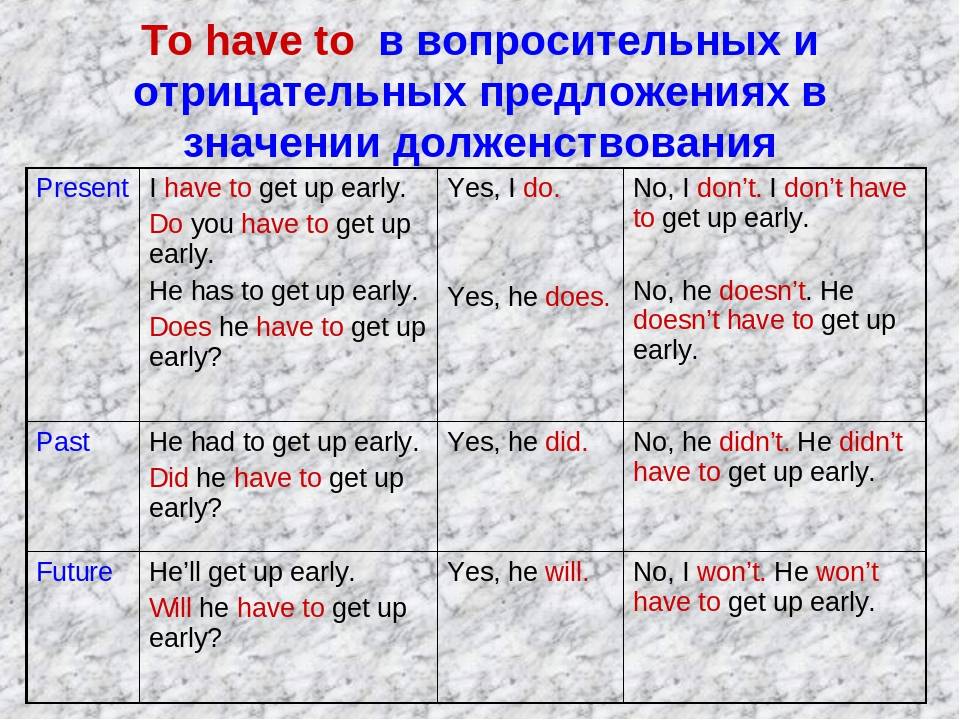
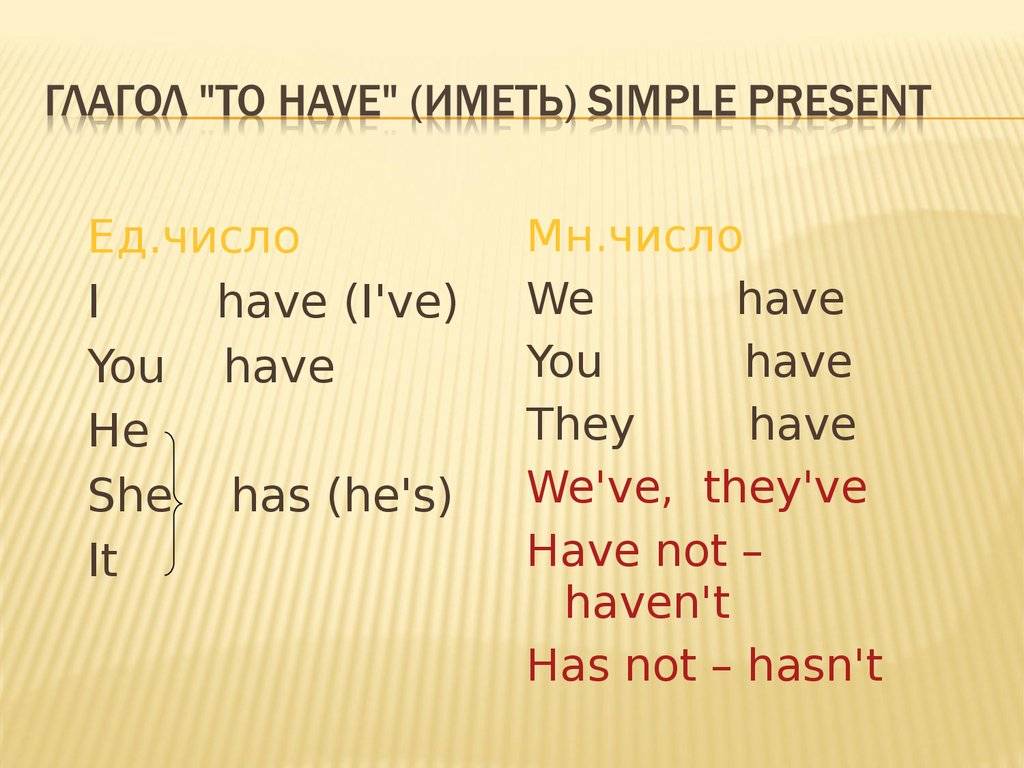
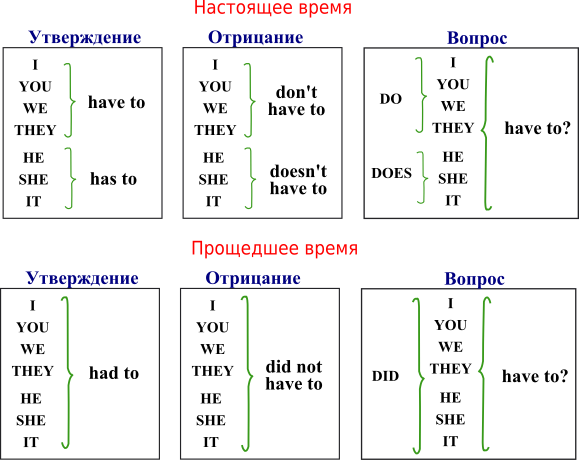
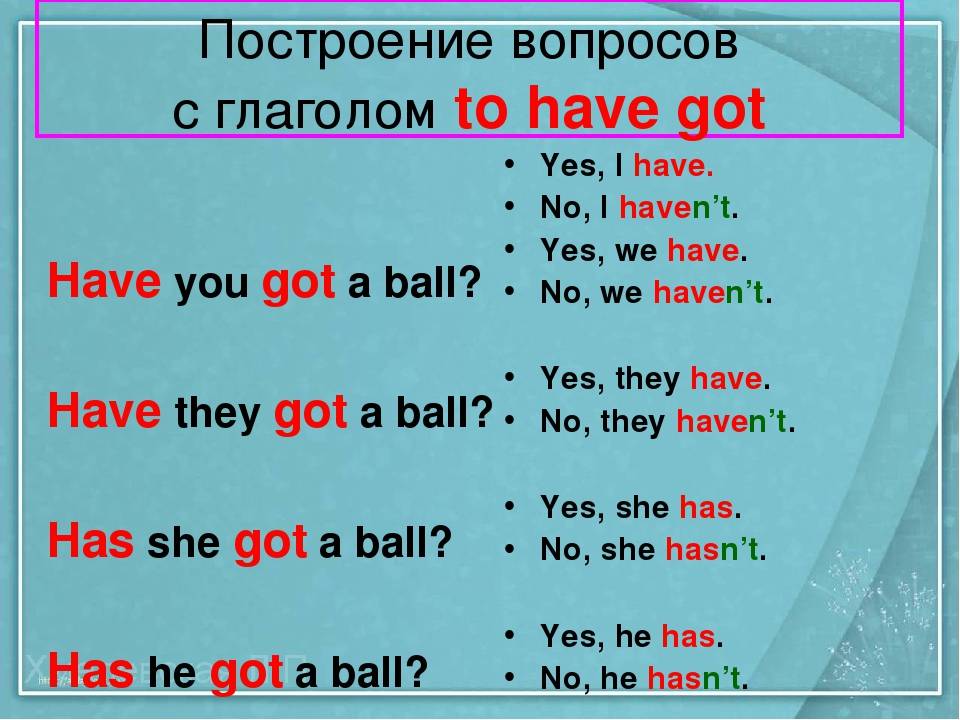
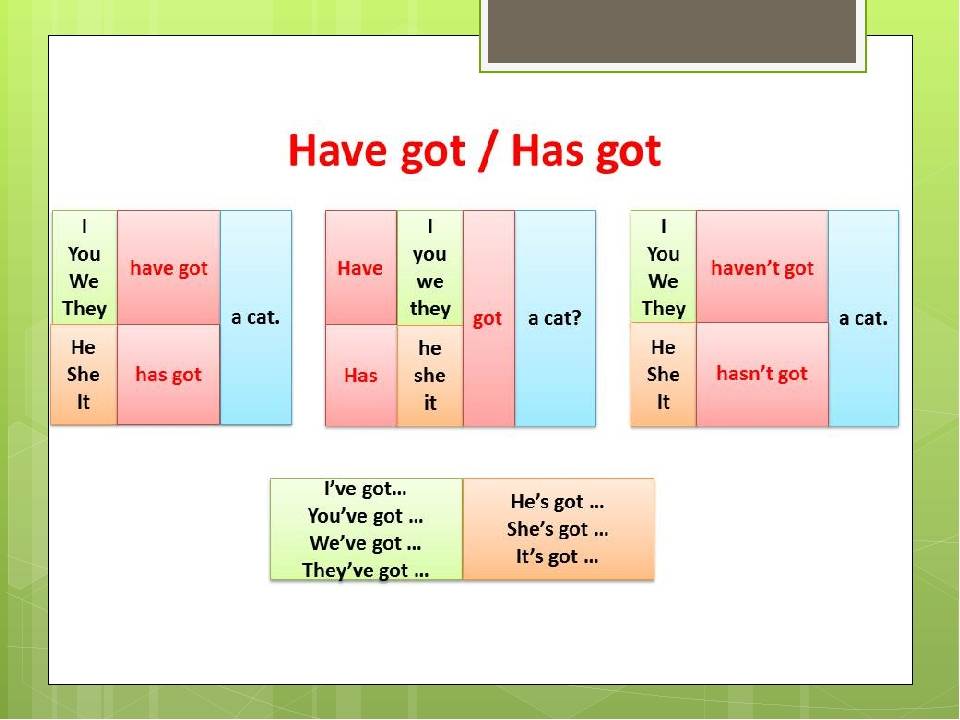

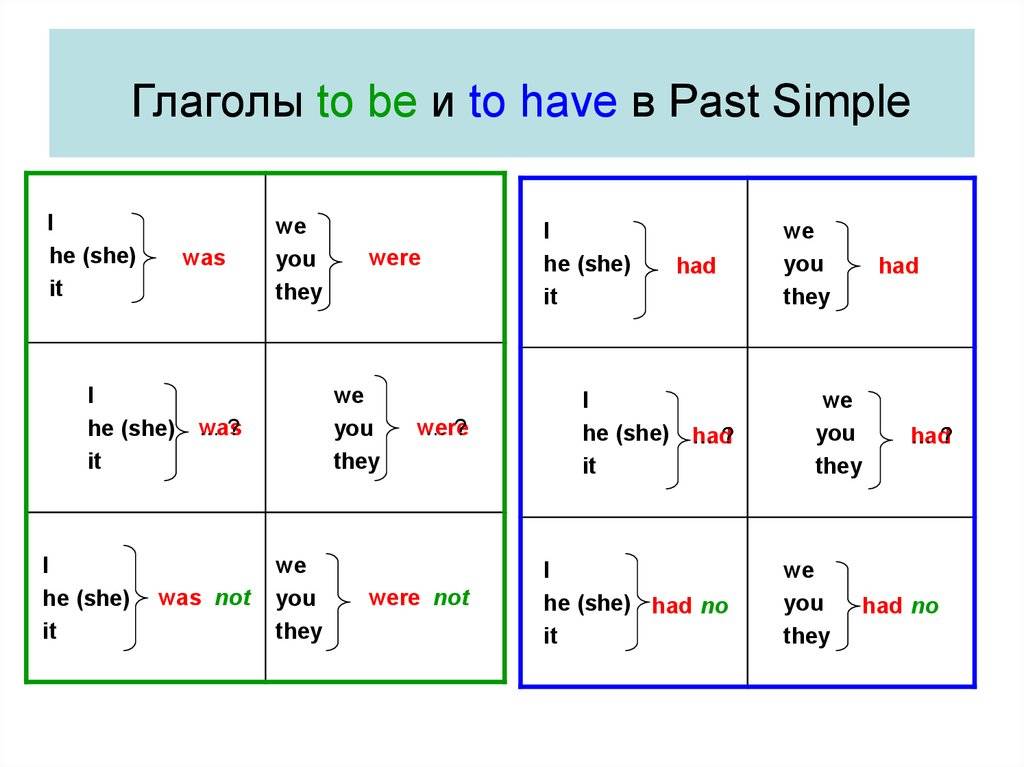
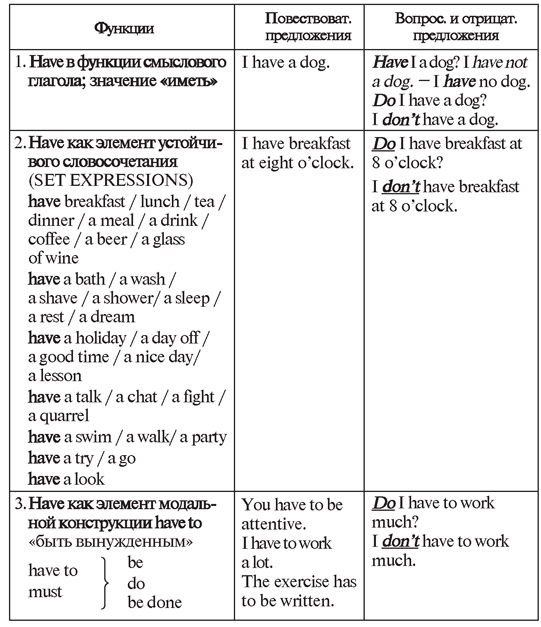
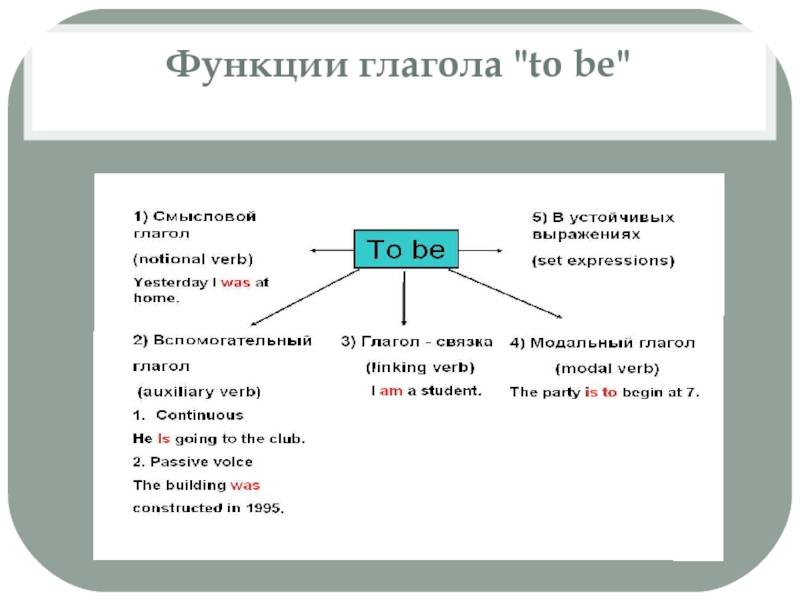
3. Have got to = have to
В третьем значении have got – это синоним модального глагола have to. Как и have to, have got показывает обязанность что-то сделать. Между ними нет никакой разницы, но have got более эмоционально насыщен, чем have to, поэтому сильнее выражает долженствование. Обычно мы выделяем have got в речи голосом.
В значении модального глагола have got to не может использоваться в прошедшем и будущем времени. В этом случае должен использоваться только have to (had to, will have to).
Посмотрите видео с преподавателем Alex. Он поведает вам о функциях have got в английском языке и расскажет еще несколько интересных особенностей этой конструкции.
Узнай родные глаголы чуть лучше
Относительно русских глаголов мы остановимся лишь на двух признаках: время и вид. Понимание этих категорий «даст нам силы» для постижения системы английских времен.
1. Время глагола выражает соотношение времени действия и момента речи.
Тут все просто: если действие протекало до момента речи – оно в прошлом, если будет протекать после – оно в будущем, если во время – в настоящем.
2. Вид характеризует действие как завершенное или незавершенное.
Если действие завершено и не может продолжаться (достигнут его предел), то глагол совершенный и отвечает на вопрос «что сделать?».
Пример: Заморозить, выспаться, пробежать, отлучиться и др.
Если действие протяженное, ему «конца и края не видно», то глагол несовершенный и отвечает на вопрос «что делать?».
Пример: морозить, спать, бежать, отлучаться и др.
Вид – это постоянный признак глагола, глагол не «изменяется по виду», а всегда либо совершенный, либо несовершенный.
Глаголы НЕСОВЕРШЕННОГО вида имеют все три формы времени.
Пример: искала – ищу – буду искать (составная форма будущего времени)
Глаголы СОВЕРШЕННОГО вида имеют формы только прошедшего и будущего времени.
Пример: нашел – найду.
Обрати на это внимание: если действие завершено (все, его предел достигнут), то в русском языке оно НЕ может находиться в настоящем времени
3. Не всегда реальное время и грамматическая форма глагола совпадают:
Пример: Он вчера приходит ко мне и говорит «Наконец на улице солнце!»
Действие происходит вчера (то есть в прошлом по отношению к моменту речи), но мы выражаем его формами настоящего времени.
Еще пример: «Поезд отходит в три часа»
Говорим о будущем, а используем форму настоящего времени.
Обрати на это внимание, поскольку в английском языке подобные «несостыковки» тоже есть (и не нужно этого пугаться)
4. Мы можем говорить об абсолютном и относительном временах.
Например, глаголы «ушла» и «заснул» – оба прошедшего времени (абсолютного). Но если мы вставим их в предложение «После того как я ушла, он заснул», то действие «ушла» будет находиться в прошлом относительно действия «заснул». Получается, что относительное время – то, которое мы видим только из контекста. Запомни этот момент.
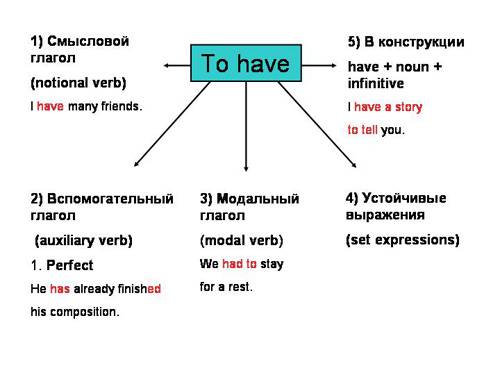
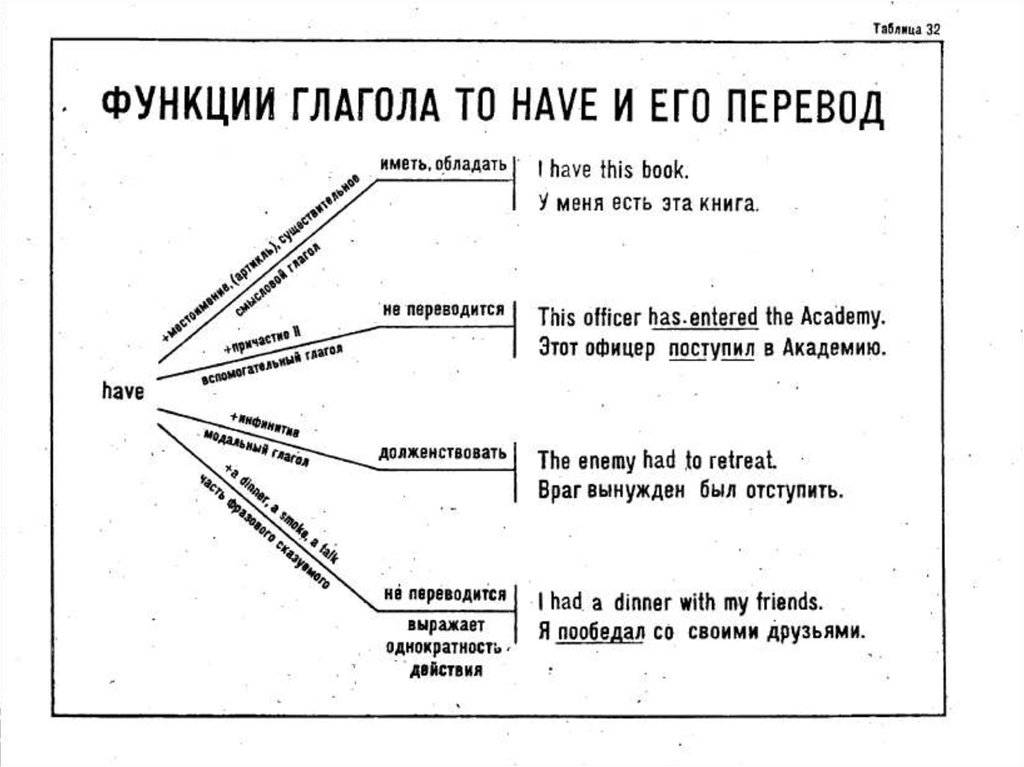
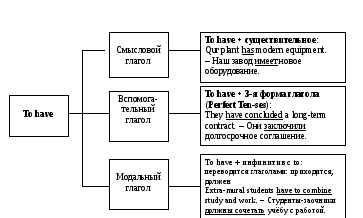
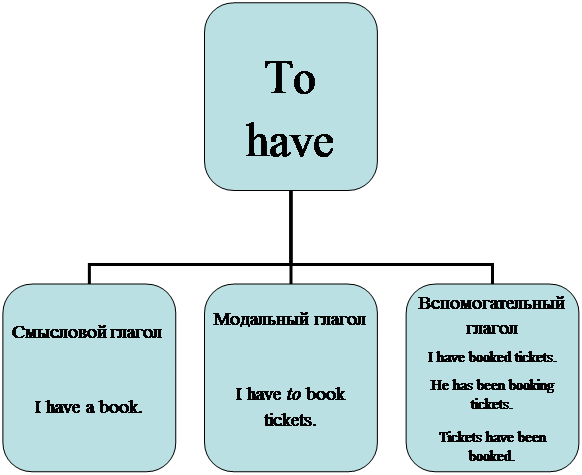
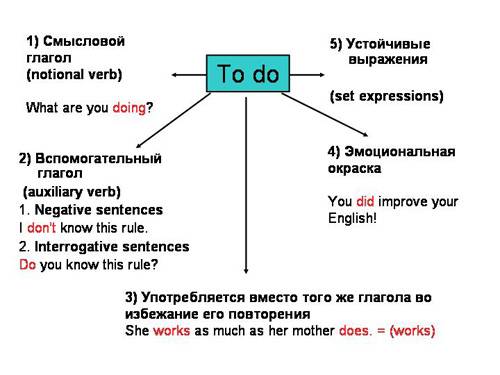
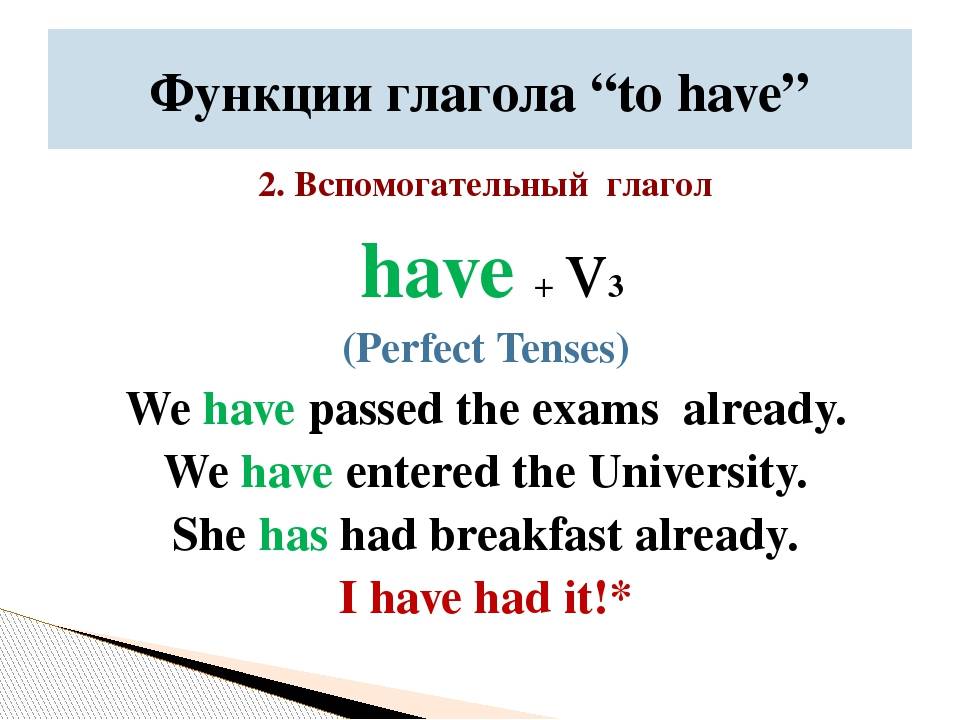
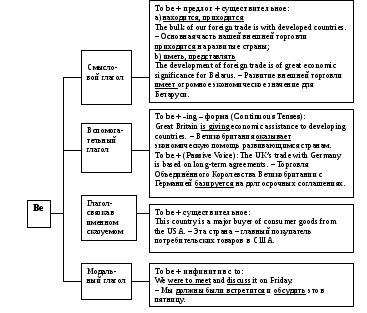
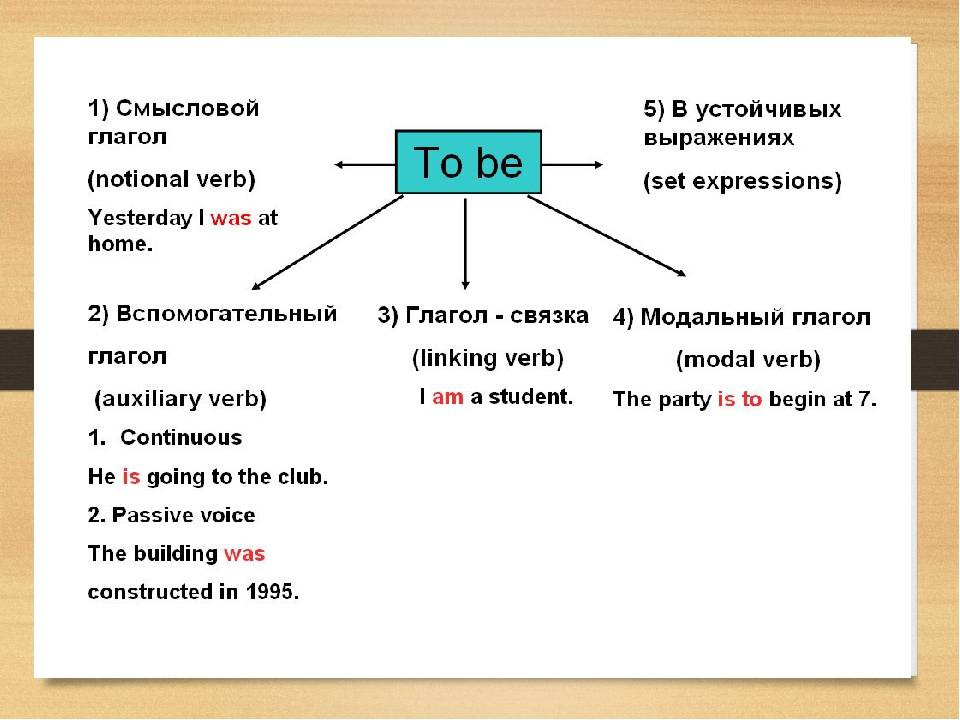
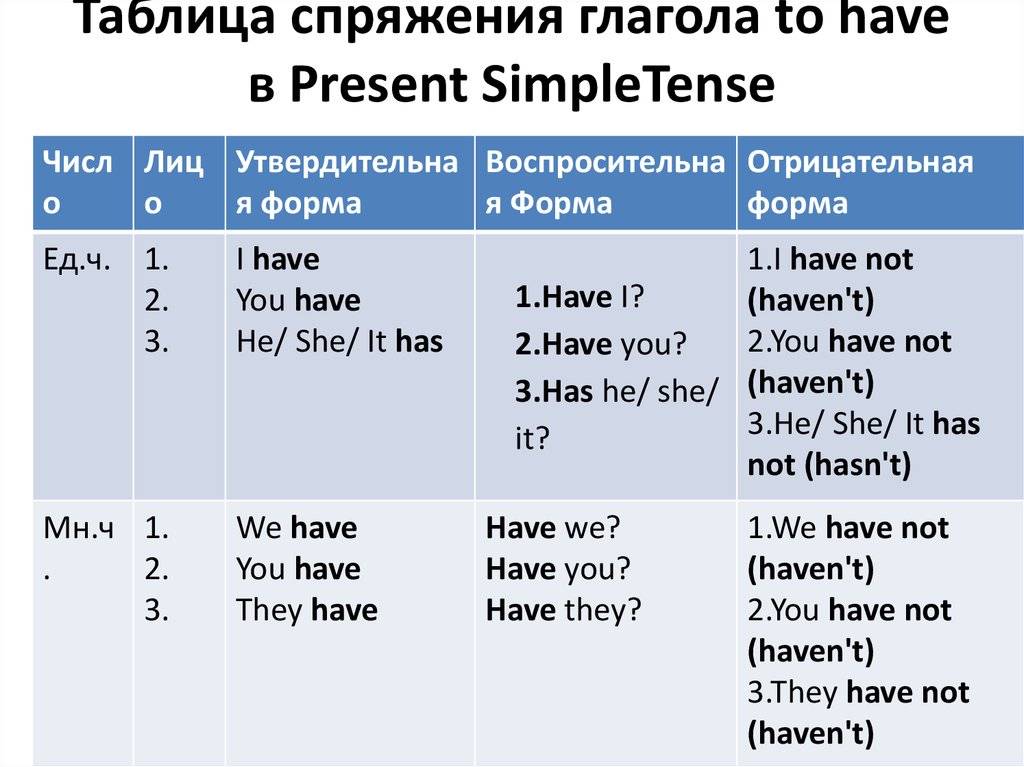
Относительное время может выражаться не только придаточными предложениями, как в примере выше, но и при помощи причастий, деепричастий.
Пример с деепричастием совершенного вида: Приготовив торт, она убрала его в холодильник. (сначала приготовила, а потом убрала, здесь одно действие идет за другим)
Пример с деепричастием несовершенного вида: Готовя торт, она читала книгу (действия одновременны, параллельны).
Пример с причастием: Убравшая квартиру мама легла отдохнуть (сначала убрала, а затем легла).
Формы глагола в предложениях разных типов
Употребление в разных по типу предложениях определяет то, какими будут формы этого глагола. Их необходимо знать, так как у этой единицы существует несколько вариантов спряжения.
Спряжение
Спряжение глагола to have не несет в себе никакой сложности и запомнить то, как он употребляется в разных временах, очень легко. В прошедшем времени используется форма had; в перфектных структурах она идентична. Ту же информацию предлагает таблица неправильных глаголов. В будущем времени глагол остается без изменений, к нему лишь добавляется один из соответствующих вспомогательных глаголов – will или shall.
Когда речь идет о настоящем времени, то здесь важно запомнить один нюанс: разобраться, когда пишется have, а когда has. Здесь все зависит от лица и числа местоимения, которое сопутствует действию
К глагольной форме, примыкающей к местоимению или существительному в единственном числе и в третьем лице, как известно, необходимо добавлять окончание –s. Соответственно, форма has необходима именно для этих целей. Например:
· She has quite a good car – У нее есть довольно хороший автомобиль · He has the same phone that I want to but – У него есть точно такой же телефон, который я хочу купить
Note: предложения с глаголом has актуальны не только в простом настоящем, но и в перфектном времени, где он выступает в роли вспомогательного элемента.
Но если речь идет, например, о семье как о едином целом, то актуально использование has. К примеру:
· My family have mobile phones – У моей семьи есть мобильные телефоны (имеется в виду каждый из членов семьи) · Our team has many important awards – У нашей команды есть много важных наград (команда подразумевается как единое целое)
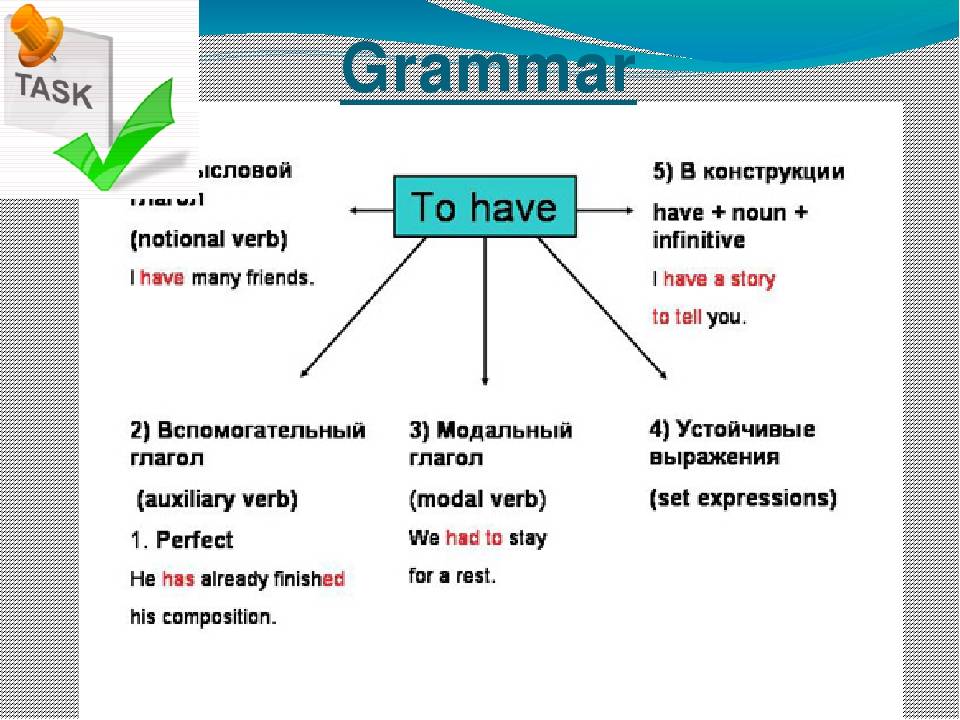
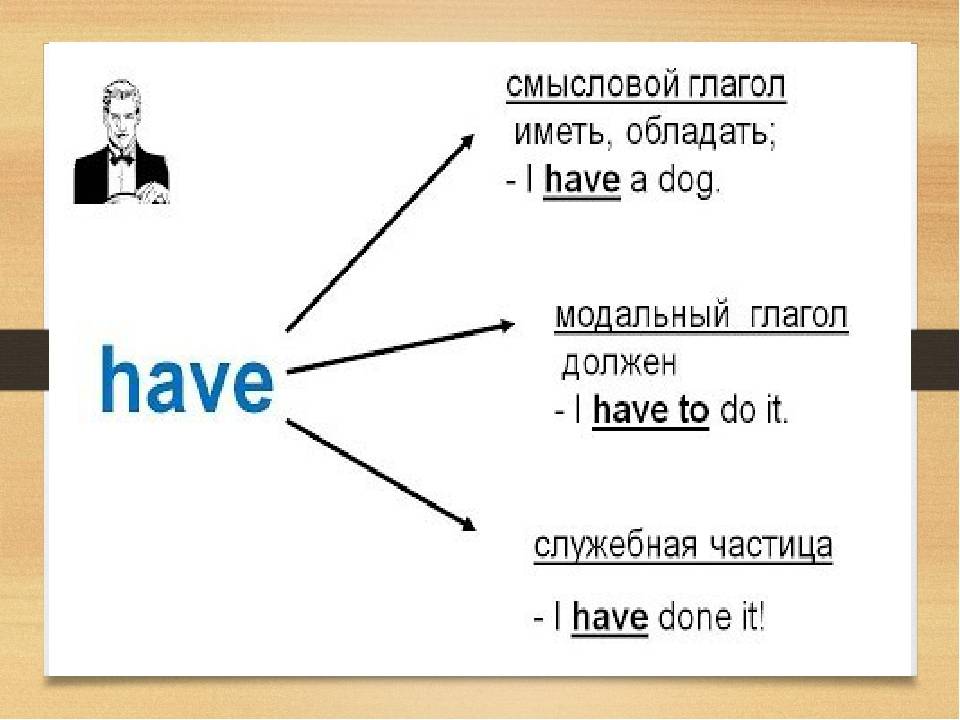

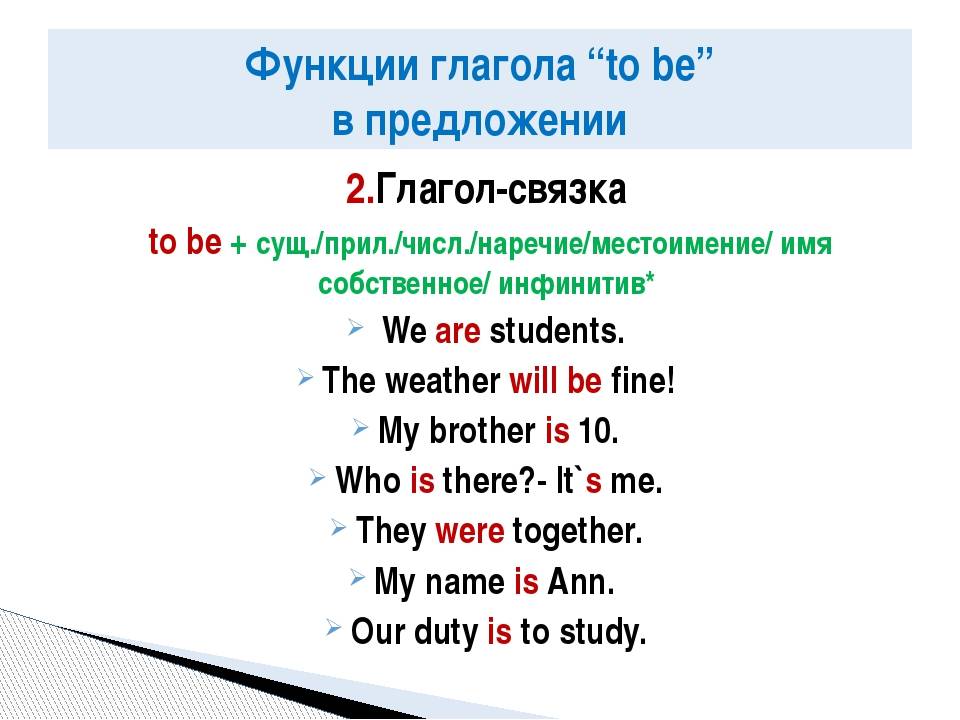
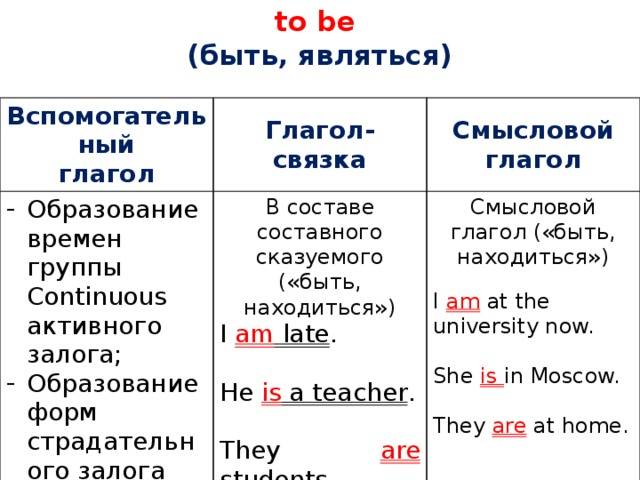
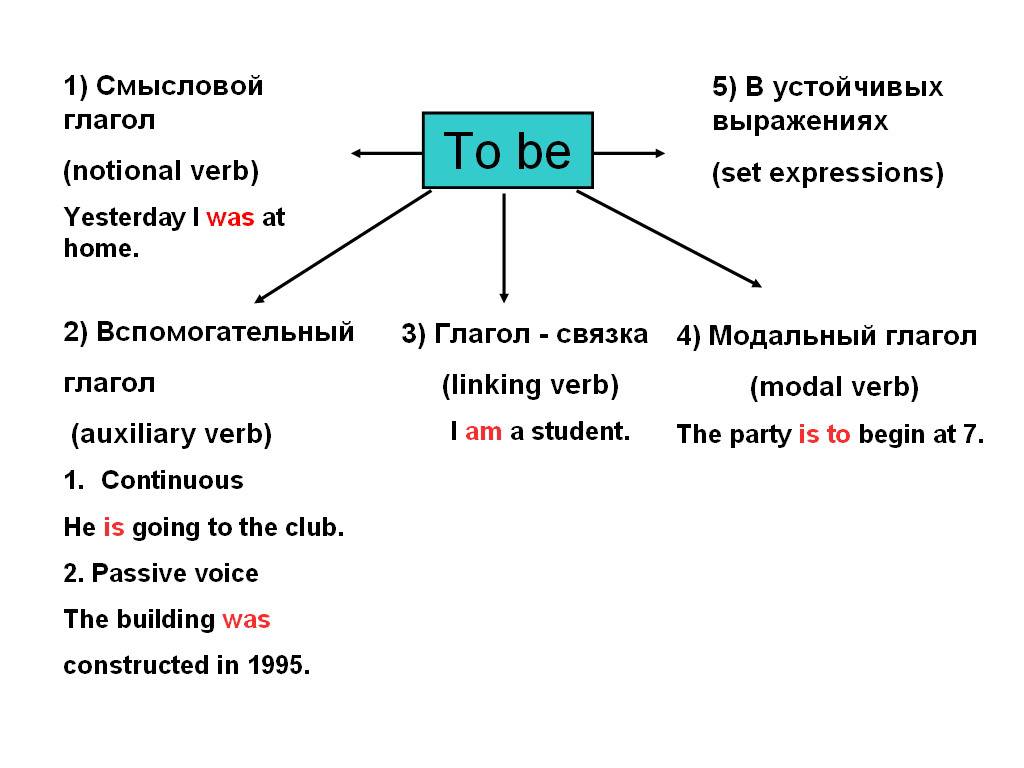

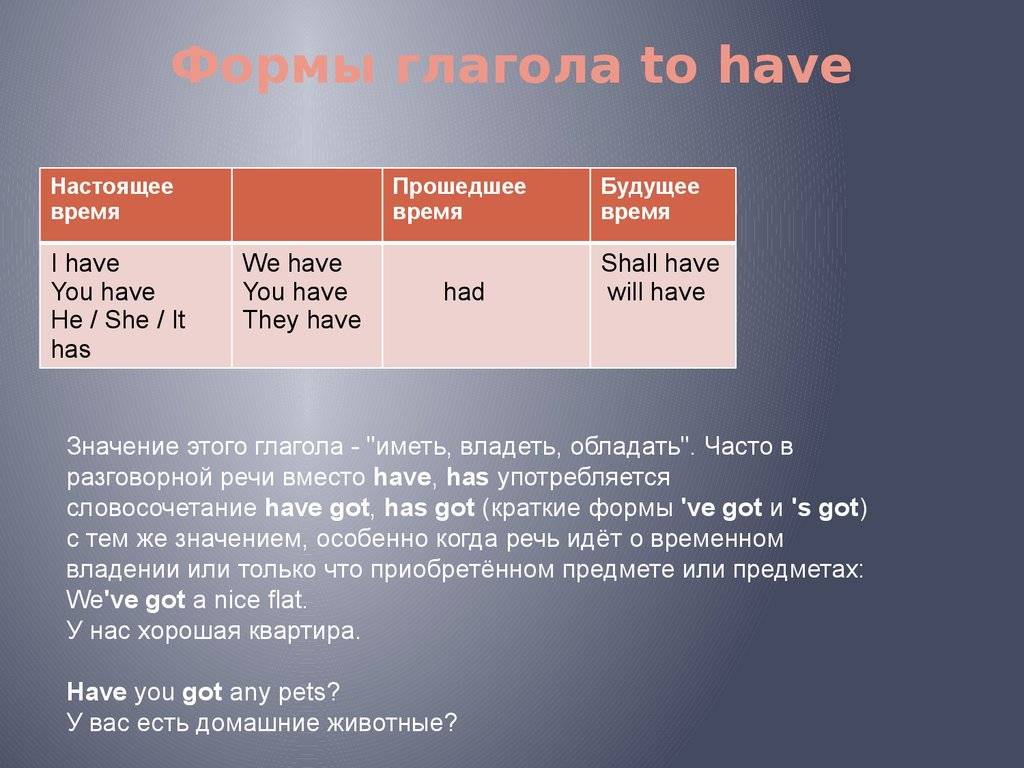

Вопросительные предложения
Использование этого глагола в вопросах во многом напоминает стандартный принцип образования этого типа предложений
Однако важно помнить, что в зависимости от того, какую функцию наш глагол выполняет в тексте, вопросительные предложения могут строиться по-разному
· Do you have this book? – У тебя есть эта книга?· Did they have money when they were there? – У них были деньги, когда они там были?
Однако если он выступает в роли вспомогательной части предложения, как, например, в Present или Past Perfect, он должен сам задавать вопрос, начиная предложение.
Употребление в отрицаниях
У отрицательных предложений принцип образования схож с вопросами. Если наш verb играет роль вспомогательного, отрицание добавляется непосредственно к нему, а если основного — то при помощи вспомогательного глагола do (does, did, etc) и частицы not.
We do not (don’t) have any desire to stay there.
Однако в разговорном английском есть тенденция добавлять частицу not непосредственно к самому глаголу даже в том случае, когда он имеет свое прямое значение «обладать, иметь». Кроме того, довольно часто и в письменной, и в разговорной речи принято употреблять сокращённые формы отрицания: haven’t или hasn’t; если это прошедшее время – hadn’t.
· She hasn’t any interesting films at home – Дома у нее нет никаких интересных фильмов
Презентация по английскому языку на тему «Have got / has got»
Курс повышения квалификации
Основы разработки онлайн-курса
Курс повышения квалификации
Современные педтехнологии в деятельности учителя
Курс повышения квалификации
Анализ урока как инструмент развития профессиональных компетенций учителя в соответствии с требованиями ФГОС
«Учись, играя: эффективное обучение иностранным языкам дошкольников»
Описание презентации по отдельным слайдам:
Употребление глагола “have” и“has”
Affirmative sentences
(утвердительные предложения)
Long form Short form
I have gotI’ve got
You have got You’ve got
He has got He’s got
She has got She’s got
It has got It’s got
We have got We’ve got
You have got You’ve got
They have got They‘ve got
Fill in the blanks with have got or has got
You ____________two dogs.
They __________a ship.
He __________a cat.
I ___________sweets.
John __________ a book.
We ________ a house.
Kate ________ dolls.
They _________ pens.
Mr. Black _____ a car.
You _______a bike.
You have got two dogs.
They have got a ship.
He has got a cat.
I have got sweets.
John has got a book.
We have got a house.
Kate has got dolls.
They have got pens.
Mr. Black has got a car.
You have got a bike.
Look at the pictures and write sentences with have got or has got.
The boy has got a bike.
The boy / a bike
The girl / a doll
The girl has got a doll.
The cat / three fish.
The cat has got three fish.
Kate / tulips.
Kate has got tulips.
The boys / cars.
The boys have got cars.
Kathy / a box/ has.
have / a plane / Boys.
has / cakes / Old Mary.
Jim Ross / Dolly Griffin / two bikes / and / have.
three mugs / has / Fred.
Kathy has a box.
Boys have a plane.
Old Mary has cakes.
Jim Ross and Dolly Griffin have two bikes.
Fred has three mugs.
Dogs ________ good.
We _________ a good dog.
My dad and mum __________ a car.
Their car ____________ red.
Alice ________ boxes.
Ben __________ a little boy.
He __________ cars.
I __________ a good pupil.
Dogs are good.
We have got a good dog.
My dad and mum have got a car.
Their car is red.
Alice has got boxes.
Ben is a little boy.
He has got cars.
I am a good pupil.
Homework!
Translate the sentences into English
У меня есть тюльпаны. Они – красные.
У нас есть письменный стол. Он – зеленый и большой.
Их сумка – большая. А у нас есть маленькая сумка.
У нее есть книжки. Ее книги – старые.
У них есть ручки. И у них есть большие лампы.
Thank you
for
your attention!
Рабочие листы и материалы для учителей и воспитателей
Более 3 000 дидактических материалов для школьного и домашнего обучения
Акция до 31 августа
«Начало учебного года современного учителя»
Свидетельство и скидка на обучение каждому участнику
Дистанционные курсы для педагогов
Видеолекции для
профессионалов
Найдите материал к любому уроку, указав свой предмет (категорию), класс, учебник и тему:
5 908 732 материала в базе
Материал подходит для УМК
«Английский язык. Второй иностранный», Афанасьева О.В., Михеева И.В.
Другие материалы
Вам будут интересны эти курсы:
Оставьте свой комментарий
Авторизуйтесь, чтобы задавать вопросы.
Настоящий материал опубликован пользователем Филячева Евгения Васильевна. Инфоурок является информационным посредником и предоставляет пользователям возможность размещать на сайте методические материалы. Всю ответственность за опубликованные материалы, содержащиеся в них сведения, а также за соблюдение авторских прав несут пользователи, загрузившие материал на сайт
Если Вы считаете, что материал нарушает авторские права либо по каким-то другим причинам должен быть удален с сайта, Вы можете оставить жалобу на материал.
Автор материала
Московский институт профессиональной
переподготовки и повышения
квалификации педагогов
Дистанционные курсы
для педагогов
663 курса от 490 рублей
Выбрать курс со скидкой
Выдаём документы
установленного образца!
«Буллинг: вызовы и решения в воспитании и образовании детей»
«Как закрыть гештальт: практики и упражнения»
«Ораторское искусство. Как говорить так, чтобы Вас было интересно слушать?»
Подарочные сертификаты
Ответственность за разрешение любых спорных моментов, касающихся самих материалов и их содержания, берут на себя пользователи, разместившие материал на сайте. Однако администрация сайта готова оказать всяческую поддержку в решении любых вопросов, связанных с работой и содержанием сайта. Если Вы заметили, что на данном сайте незаконно используются материалы, сообщите об этом администрации сайта через форму обратной связи.
Все материалы, размещенные на сайте, созданы авторами сайта либо размещены пользователями сайта и представлены на сайте исключительно для ознакомления. Авторские права на материалы принадлежат их законным авторам. Частичное или полное копирование материалов сайта без письменного разрешения администрации сайта запрещено! Мнение администрации может не совпадать с точкой зрения авторов.
Оборот have got и глагол have
Английский язык строится на трех китах – это три глагола: to be, to have и to do.
To have – означает иметь что-либо.
I have a dog – У меня есть собака. (дословно: Я имею собаку)
Оборот have got – по смыслу тоже самое, что и просто have (иметь).
I’ve got* a dog – У меня есть собака. (дословно: Я имею собаку)
*I’ve got = I have got
Часто этот оборот сокращается:
Чем же отличается оборот have got от просто глагола have?
А тем, что при помощи только одного этого оборота можно задать вопрос и сделать отрицание.
Короткие ответы:
Как в примере:
Have you got a car? – Yes, I have.
У тебя есть машина? – Да.
I haven’t got a girlfriend – У меня нет девушки.
Давайте сравним предложения с have и have got:
Утверждение:
I have a motor-bike = I have a motor-bike.
У меня есть мотоцикл (дословно: я имею мотоцикл).
Вопрос:
Do you have a camera? = Have you got a camera?
У тебя есть камера? (дословно: ты имеешь камеру?)
Отрицание:
He doesn’t have any children = He hasn’t got any children.
У него нет детей (дословно: он не имеет детей).
Можем сделать вывод такой, что оборот have got, в отличии от просто глагола have, более «самодостаточен» и не нуждается в «поддержке» вспомогательных глаголов (do, does …) в вопросах и отрицательных предложениях. Хотя, по смыслу они не отличаются между собой.
отрицательная форма глагола have got
Have got/Has got
Конструкция have got/has got. Утвердительные, вопросительные и отрицательные предложения
Помимо глагола to have (см. тема 4), в английском языке есть конструкция have got с таким же значением – иметь. Разница между ними стилистическая и грамматическая. Стилистическое различие небольшое – have got используется преимущественно в разговорной устной и письменной речи, а To Have в официальной.
Грамматические различия данных форм более существенные.
Не трудно предположить, что have got склоняется по лицам аналогично to have. Обычно в этой конструкции используются краткие формы.
Утвердительные предложения
| Полная форма | Краткая форма | |
| I | have got | I’ve got |
| She | has got | she’s got |
| He | has got | he’s got |
| It | has got | it’s got |
| We | have got | we’ve got |
| You | have got | you’ve got |
| They | have got | they’ve got |
Порядок слов: на первом месте подлежащее, на втором – сказуемое (have got), затем идут второстепенные члены предложения.
I’ve got some questions to you.
Jack’s got many friends.
They’ve got some good ideas.
Конструкция have got является самодостаточной в плане образование отрицательных и вопросительных форм. Вспомогательные глаголы здесь не нужны.
Отрицательные предложения
Отрицательные предложения образуются путем добавления отрицательной частицы not после have/ has. Краткие отрицательные формы употребляются чаще.
| Полная форма | Краткая форма | |
| I | I have not got | I haven’t got |
| She | she has not got | she hasn’t got |
| He | he has not got | he hasn’t got |
| It | it has not got | it hasn’t got |
| We | we have not got | we haven’t got |
| You | you have not got | you haven’t got |
| They | they have not got | they haven’t got |
This pupil hasn’t got any mistakes in the test.
I haven’t got a TV set in my bedroom.
We haven’t got much time.
Общий вопрос
Порядок слов в общем вопросе: на первом месте стоит have/has, на втором – подлежащее, на третьем месте находится got, затем идут второстепенные члены предложения.
| 1 | 2 | 3 | 4 | 5 |
| Have | I | got | any | interesting books? |
| We | ||||
| You | ||||
| They | ||||
| Has | she | any | pets | |
| He | ||||
| It (TV set) | got | a remote control? |
Специальные вопросы
Порядок слов в специальном вопросе: на первое место ставится вопросительное слово, на второе – have/ has, на третьем месте находится подлежащее, на четвертом – got, затем идут второстепенные члены предложения.
Глагол to have в английском языке
Спряжение глагола to have — см. таблицу.
Глагол to have имеет сокращенные формы в утвердительных предложениях в настоящем и прошедшем времени, когда он сливается с подлежащим, выраженным любым личным местоимением, или с подлежащим-существительным в 3 л. ед. ч. В отрицательных предложениях в настоящем и прошедшем времени он может сливаться с отрицательной частицей not, в которой выпадает буква о, и вместо нее употребляется апостроф.
Спряжение глагола have в Present Tense
| Утвердительная форма | Отрицательная форма | Вопросительная форма |
|---|---|---|
| I have (I’ve) | I have not (haven’t) | Have I? |
| you have (you’ve) | you have not (haven’t) | Have you? |
| he has (he’s) | he has not (hasn’t) | Has he? |
| she has (she’s) | she has not (hasn’t) | Has she? |
| it has (it’s) | it has not (hasn’t) | Has it? |
| we have (we’ve) | we have not (haven’t) | Have we? |
| you have (you’ve) | you have not (haven’t) | Have you? |
| they have (they’ve) | they have not (haven’t) | Have they? |
Для британского варианта английского языка характерно образование вопросительной и отрицательной форм с этим глаголом без вспомогательного глагола do, если имеются в виду единичные случаи (действия), и с помощью вспомогательного глагола do, если имеется в виду постоянное обладание (наличие). При этом в настоящем времени в первом случае в разговорной речи чаще употребляется конструкция с глаголом get.
Have you (got) time for a game of chess?
У вас (сейчас) есть время, чтобы сыграть в шахматы?
Have you (got) any brothers?
У вас есть братья?
Для американского варианта английского языка и вариантов, характерных для других англоязычных стран, во всех случаях предпочтительно употребление форм со вспомогательным глаголом do.
Например, там, где американец может сказать: Can you help me now? Do you have time?, англичанин скажет: Can you help me now? Have you got time?
В случаях, когда глагол have употребляется без вспомогательного глагола do, отрицательная форма образуется при нем при помощи отрицания not (в краткой форме haven’t) или отрицания по перед существительным, которое в данном случае употребляется без артикля.
Have you (got) a sister? — У вас есть сестра? —
No, I have not. Нет.
I have no sister. У меня нет сестры.
В 3-м лице единственного числа сокращения для глаголов be и have одинаковы, т. е. ‘s.
She’s a doctor. = She is a doctor.
She’s a book. = She has a book.
Спряжение глагола have в Past Tense
| Утвердительная форма | Отрицательная форма | Вопросительная форма |
|---|---|---|
| I had (I’d) | I had not (hadn’t) | Had I? |
| you had (you’d) | you had not (hadn’t) | Had you? |
| he had (he’d) | he had not (hadn’t) | Had he? |
| she had (she’d) | she had not (hadn’t) | Had she? |
| it had | it had not (hadn’t) | Had it? |
| we had (we’d) | we had not (hadn’t) | Had we? |
| you had (you’d) | you had not (hadn’t) | Had you? |
| they had (they’d) | they had not (hadn’t) | Had they? |
Употребление
Глагол to have употребляется:
We have a summer cottage. У нас есть дача.
Как уже отмечалось выше, значение «иметь», «обладать» в британском варианте передает также сочетание have got.
I have (have got = I’ve got) an interesting book.
У меня интересная книга.
Have you got the latest newspaper? —
У тебя есть последний номер газеты (свежая газета)? —
No, I haven’t got it.
Нет, у меня его (её) нет.
В вопросительной и отрицательной формах для выражения обычных действий используется вспомогательный глагол do (но не с сочетанием have got).
Do you have dinner at home?
Ты обедаешь дома?
I don’t have dinner at home very often.
Я не очень часто обедаю дома.
Вопросительная и отрицательная формы с глаголом have в значении «иметь» могут быть образованы двумя способами.
| Время | Утвердительная форма | Отрицательная форма | Вопросительная форма |
|---|---|---|---|
| Present Tense | have (got) или have | haven’t (got) или don’t have | have I got? или do I have? |
| Past Tense | had | hadn’t или didn’t have | had you? или did you have? |
| Present Perfect | I have worked |
|---|---|
| Past Perfect | I had worked |
| Future Perfect | I shall have worked |
| Present Perfect Continuous | I have been working |
| Past Perfect Continuous | I had been working |
| Future Perfect Continuous | I shall have been working |
| Perfect Conditional | I shall have worked |
I have been in hospital. Я был в больнице.
Не has dug the patch for potatoes. Он вскопал участок для картофеля.
Have you heard the new rock-group? Вы слушали новую рок-группу?
I have to go there. Я должен идти туда (т. е. мне приходится идти туда, я вынужден идти туда).
He has to take a bus to get to his office. Ему приходится ехать автобусом до своей работы.
В диалогах сочетания have to/had to часто употребляются самостоятельно, т. е. сам инфинитив опускается, но подразумевается.
Why do you put on your raincoat? — Почему ты надеваешь плащ? —
I have to. It looks like rain. Мне приходится (его надевать). Похоже, что будет дождь.
Why do you wear spectacles? — Почему ты носишь очки? —
I have to (wear them). I am short-sighted. Я вынужден (носить их). Я близорукий.
I didn’t want to stop but I had to (stop) as I needed petrol.
Я не хотел останавливаться, но был вынужден, так как у меня кончился бензин (мне нужен был бензин).
to have a talk — поговорить
to have supper — поужинать
to have a smoke — покурить
to have lunch — позавтракать
to have a swim — поплавать
to have a bath — принять ванну
to have a rest — отдохнуть
to have difficulties/troubles — столкнуться с трудностями/ неприятностями
to have a good holiday — хорошо провести праздник/ отпуск
to have dinner — пообедать
Вопросительная (если это общий вопрос или вопрос не к подлежащему) и отрицательная формы с этими выражениями образуются при помощи вспомогательного глагола do.
When do you have supper? Когда вы ужинаете?
Did you have breakfast? Ты завтракал?
Читайте также:
Личные местоимения
Личные местоимения в английском языке являются показателем лица, имеют форму именительного падежа (Nominative Case), а в 3-м лице единственного числа — форму объектного падежа (Objective Case) и выражают число.
Употребление глаголов have и have got в английском языке
Глагол have переводится как «иметь» и используется, когда мы говорим, что у нас что-то есть.
Если вы учили английский в школе, то знаете, что мы также можем сказать это с помощью have got. Так как правила использования этого глагола немного изменились, многие путают, когда же надо использовать have, а когда have got.
В этой статье я расскажу, как правильно использовать этот глагол и как строить предложения с ним.
Использование have в английском языке
Глагол have в предложении может быть:
1. Вспомогательным, то есть никак не переводиться и использоваться в качестве помощника-указателя времени. Например, времени Present Perfect.
I have lost my keys.
Я потерял ключи.
2. Смысловым, то есть нести смысл. В этом случае have переводится как «иметь, обладать чем-то».
I have a car.
У меня есть машина (Дословно: я имею машину).
Именно в качестве смыслового глагола мы будем рассматривать have в этой статье.
Как построить предложения с глаголом have в английском языке
Глагол have переводится как «иметь, владеть, обладать чем-то». Его мы можем использовать в настоящем, прошедшем и будущем времени. Давайте подобно рассмотрим все 3 случая.
Глагол have в настоящем времени
Чтобы сказать, что у кого-то есть что-то/кто-то, мы используем глагол have. Для этого мы ставим have после главного действующего лица в предложении (я, ты, он, они, дети, Том).
В зависимости от действующего лица have может иметь следующие формы:
После have мы ставим то, чем обладаем/что имеем.
Примечание: если мы говорим о предмете или живом существе в единственном числе, то перед этим словом мы ставим артикль a/an.
Подробно про артикли я рассказывала вам в этой статье.
Давайте посмотрим на схему предложения с глаголом have.
Действующее лицо + have/has + предмет/существо/человек.
| I | ||
| You | ||
| We | have | a car |
| They | a sister | |
| She | a cat | |
| He | has | |
| It |
They have a dog.
У них есть собака.
She has a phone.
У нее есть телефон.
We have a flat.
У нас есть квартира.
Глагол have в прошедшем времени
Если мы хотим сказать, что имели что-то, обладали чем-то в прошлом, то используем прошедшее время (Past Simple).
В прошедшем времени глагол have имеет форму had. Она никак не изменяется в зависимости от действующего лица.
Действующее лицо + had + предмет/существо/человек.
| I | ||
| You | ||
| We | a car | |
| They | had | a phone |
| She | a problem | |
| He | ||
| It |
They had the book.
У них была эта книга.
She had a bicycle.
У нее был велосипед.
Глагол have в будущем времени
Чтобы сказать, что вы будете иметь что-то/кого-то в будущем, нам нужно поставить have в будущее время (Future Simple). Для этого мы ставим вспомогательный глагол will перед have.
При этом have мы никак не изменяем в зависимости от действующего лица.
Действующее лицо + will have + предмет/существо/человек.
| I | |||
| You | |||
| We | a car | ||
| They | will | have | a phone |
| She | a cat | ||
| He | |||
| It |
We will have a dog.
У нас будет собака.
He will have a house.
У него будет дом.
Отрицательные предложения с глаголом have в английском языке
Мы можем сказать, что у нас нет, не было, не будет чего-то. Для этого мы используем отрицание.
Раньше для образования отрицательных предложений с have не требовалось вспомогательного глагола. Нужно было просто поставить отрицательную частицу после нашего глагола.
I have not a car.
У меня нет машины.
Такие предложения вы можете встретить в книгах.
Сейчас в английском мы образуем отрицание с помощью вспомогательного глагола (do, does, did, will) и отрицательной частицы not.
Для каждого из времен, конечно, мы используем свой вспомогательный глагол.
Отрицательные предложения с have в настоящем времени
В настоящем времени мы образуем отрицание с помощью вспомогательного глагола do и отрицательной частицы not.
Если мы говорим о ком-то в единственном числе (он, она, Том), то используем вспомогательный глагол does и отрицательную частицу not. Сам глагол have мы не меняем.
Подробно с этим правилом вы можете ознакомиться в статье Present Simple.
Мы можем сократить do/does с отрицательной частицей not следующим образом:
do + not = don’t;
does + not = doesn’t.
А сейчас давайте посмотрим на схему такого предложения.
Действующее лицо + do/does + not + have + предмет/существо/человек.
| I | |||
| You | |||
| We | do | a car | |
| They | not | have | a sister |
| She | a cat | ||
| He | does | ||
| It |
I don’t have a brother.
У меня нет брата.
She doesn’t have a rabbit.
У нее нет кролика.
Отрицательные предложения с have в прошедшем времени
Чтобы сказать, что у нас не было чего-то, кого-то в прошлом, мы ставим вспомогательный глагол did c отрицательной частицей not в английском языке.
Мы можем использовать сокращение:
Схема такого предложения будет:
Действующее лицо + did + not + have + предмет/существо/человек.
| I | ||||
| You | ||||
| We | a car | |||
| They | did | not | have | a phone |
| She | a problem | |||
| He | ||||
| It |
They didn’t have a cat.
У них не было кошки.
She didn’t have friends.
У нее не было друзей.
Отрицательные предложения с have в будущем времени
Чтобы сказать, что в будущем у нас не будет чего-то, мы ставим not после нашего will.
Действующее лицо + will + not + have + предмет/существо/человек.
| I | ||||
| You | ||||
| We | a car | |||
| They | will | not | have | a phone |
| She | a problem | |||
| He | ||||
| It |
They won’t have problems.
У них не будет проблем.
She won’t have time.
У нее не будет времени.
Вопросительные предложения с глаголом have в английском языке
Мы можем спросить есть, было, будет ли что-то у человека.
Также как и с отрицанием, раньше можно было образовать вопрос, просто поставив have на первое место в предложении.
Have you a sister?
У тебя есть сестра?
Но сейчас, чтобы образовывать вопрос, мы пользуемся вспомогательными глаголами, которые ставим на первое место в предложении. Для каждого из времен мы используем свой вспомогательный глагол.
Вопросительные предложения с have в настоящем времени
Чтобы спросить есть ли у человека что-то, мы ставим вспомогательный глагол do на первое место в предложении.
Если действующим лицом является он, она, оно, то мы используем вспомогательный глагол does.
Do/does + действующее лицо + have + предмет/существо/человек?
| I | ||
| you | ||
| Do | we | a car? |
| they | have | a sister? |
| she | a cat? | |
| Does | he | |
| it |
Do you have a pen?
У тебя есть ручка?
Does he have a wife?
У него есть жена?
Вопросительные предложения с have в прошедшем времени
Чтобы спросить, было ли что-то у человека в прошлом, нам нужно поставить вспомогательный глагол did на первое место в предложении.
Did + действующее лицо + have + предмет/существо/человек?
| I | |||
| you | |||
| we | a car? | ||
| Did | they | have | a phone? |
| she | a problem? | ||
| he | |||
| it |
Did they have a plan?
У них был план?
Did he have a scooter?
У него был скутер?
Вопросительные предложения с have в будущем времени
Чтобы спросить, будет ли что-то у человека, мы переносим вспомогательный глагол will на первое место в предложении.
Will + действующее лицо + have + предмет/существо/человек?
| I | |||
| you | |||
| we | a car? | ||
| Will | they | have | a phone? |
| she | a problem? | ||
| he | |||
| it |
Will they have a car?
У них будет машина?
Will she have a solution?
У нее будет решение?
Использование выражения have got в английском языке
Вы можете встретить такое сочетание, как have got. Оно часто используется в разговорном английском, особенно в британском английском.
По смыслу have got ничем не отличается от have. Мы также используем его, когда говорим, что владеем чем-то. Только конструкция have got является более неформальной.
Используется это выражение только в настоящем времени. Давайте рассмотрим все виды предложений с ним.
Утвердительные предложения с have got
На первом месте в предложении идет действующее лицо. В зависимости от действующего лица have got может иметь следующие формы:
Схема предложения будет следующей:
Действующее лицо + has got/have got + предмет/существо/человек.
| I | ||
| You | ||
| We | have got | a car |
| They | a phone | |
| She | a problem | |
| He | has got | |
| It |
I have got a watch.
У меня есть часы.
She has got a bag.
У нее есть сумка.
Отрицательные предложения с have got
В отличает от глагола have выражение have got не требует вспомогательного глагола. Поэтому мы просто ставим not после have.
При этом have, также как и в утвердительных предложениях, меняется в зависимости от действующего лица.
При этом мы можем использовать следующие сокращения:
have + not = haven’t
has + not = hasn’t.
Действующее лицо + have/has + not + got + предмет/существо/человек.
| I | |||
| You | |||
| We | have | a car | |
| They | not | got | a sister |
| She | a cat | ||
| He | has | ||
| It |
I haven’t got a map.
У меня нет карты.
She hasn’t got a cup.
У нее нет чашки.
Вопросительные предложения с have got
Также как и в отрицании, чтобы задать вопрос, нам не нужен вспомогательный глагол. Мы просто переносим have на первое место в предложении.
Для she, he, it мы используем has.
Have + действующее лицо + got + предмет/существо/человек?
| I | ||
| you | ||
| Have | we | a car |
| they | got | a sister |
| she | a cat | |
| Has | he | |
| it |
Have you got a bottle of water?
У тебя есть бутылка воды?
Has she got a pen?
У нее есть ручка?
Итак, мы разобрали, как строить предложения с одним из самых популярных глаголов — have. А теперь давайте закрепим теорию на практике.
Задание на закрепление
Переведите следующие предложения на английский язык:
1. У тебя есть печенье?
2. У нее не было тетрадки.
3. У них есть эта книга.
4. У нас будет бассейн.
5. У нее есть браслет?
6. У него нет девушки.
have you got
1 have you (got)
The form «do you have» is both more formal and more technically correct, and therefore if you insisted on preferring one over the other, then «do you have» should be preferred to «have you got».
2 have you (got)
The form «do you have» is both more formal and more technically correct, and therefore if you insisted on preferring one over the other, then «do you have» should be preferred to «have you got».
The form «do you have» is both more formal and more technically correct, and therefore if you insisted on preferring one over the other, then «do you have» should be preferred to «have you got».
4 have you got a card with a suitable sentiment?
5 have you got any paper?
6 have you got any jack?
7 have you got all you require?
8 have you got any brass on you?
9 have you got a pencil on you?
10 Have you got pratique?
11 Have you got that?
12 have you got a match?
13 have you got a pencil to spare?
14 have you got the gen on the new house?
15 have you got transport?
16 have you got your cholera jabs yet?
17 have you got your cholera jobs yet?
18 have you got anything special to do?
19 Have you got anything special to do?
20 have you got a camera with an automatic light meter
См. также в других словарях:
Have You Got Any Castles? — Infobox Hollywood cartoon cartoon name = Have You Got Any Castles series = Merrie Melodies (re issued as Blue Ribbon) caption = Blue Ribbon title card director = Frank Tashlin story artist = Jack Miller animator = Ken Harris voice actor = Mel… … Wikipedia
how long have you got? — how long have you ˈgot? idiom (BrE) (NAmE how long do you ˈhave?) (informal) used to say that sth is going to take a long time to explain • … Useful english dictionary
what have you got to say for yourself? — spoken phrase used for asking someone what explanation or excuse they have for their bad behaviour Thesaurus: ways of asking questions and making requestshyponym to ask a question or questionssynonym Main entry: say … Useful english dictionary
You Got the Right One, Baby — was a popular slogan for Pepsico s Diet Pepsi brand in the United States and Canada from 1990 to 1993. A series of television ads featured singer Ray Charles, surrounded by models, singing a song about Diet Pepsi, entitled You Got the Right One,… … Wikipedia
Have You Seen Your Mother, Baby, Standing In The Shadow? — Single par The Rolling Stones extrait de l’album Big Hits (High Tide and Green Grass) Face B Who s Driving Your Plane? Sortie 23 septembre 1966 (UK) 24 septembre 1966 (US) … Wikipédia en Français
Have You Seen Your Mother, Baby, Standing in the Shadow — Have You Seen Your Mother, Baby, Standing in the Shadow? Have You Seen Your Mother, Baby, Standing in the Shadow? Single par The Rolling Stones extrait de l’album Big Hits (High Tide and Green Grass) Face B Who s Driving Your Plane? Sortie 23… … Wikipédia en Français
Have You Seen Your Mother Baby — Have You Seen Your Mother, Baby, Standing in the Shadow? Have You Seen Your Mother, Baby, Standing in the Shadow? Single par The Rolling Stones extrait de l’album Big Hits (High Tide and Green Grass) Face B Who s Driving Your Plane? Sortie 23… … Wikipédia en Français
Have You Seen Your Mother Baby? — Have You Seen Your Mother, Baby, Standing in the Shadow? Have You Seen Your Mother, Baby, Standing in the Shadow? Single par The Rolling Stones extrait de l’album Big Hits (High Tide and Green Grass) Face B Who s Driving Your Plane? Sortie 23… … Wikipédia en Français
you have only (got) yourself to blame — phrase to say or think that someone or something is responsible for an accident, problem, or bad situation He’s only got himself to blame if no one will talk to him. Thesaurus: ways of making or receiving criticism or blamehyponym to criticize,… … Useful english dictionary
Have You Seen Your Mother, Baby, Standing in the Shadow? — Single par The Rolling Stones extrait de l’album Big Hits (High Tide and Green Grass) Face B Who s Driving Your Plane? Sortie 23 septembre 1966 (UK) 24 septembre 1966 (US) Enregistr … Wikipédia en Français
When to use «have» and «have got»
When do I use have and have got?
Are «I have the answer» and «I’ve got the answer» both correct?
3 Answers 3
sounds more formal and somber, and it is often used as a statement of fact or as a direct response to the questions: Do you have the answer? Who has the answer? etc.
I’ve got the answer/I have got the answer
is more of an eureka moment remark, something one is likely to hear often in such a place as a college physics common room where students are bashing heads on seemingly intractable problems.
The have got construction is more of a Britishism. In the US, one would be more likely to hear:
I got the answer/Got the answer
«Have got» is certainly more informal. So if you never use «have got», you will be fine. However, if you want to use «have got», this is how it works.
Have and «have got» are sometimes interchangeable and sometimes not.
When have is being used as a modal verb (or helper verb), then you cannot use «have got».
When have is being used as a main verb, you can replace it with «have got», but only in the present tense.
This is true for possessive uses of have:
And also obligation:
Lastly, if you are constructing an imperative sentence, you can only use have:
A note on «have got» when referring to acquisition: this is not possible in US/Canadian English, where «have gotten» is the preferred form.
Всё, что нужно знать об английском глаголе HAVE

Смотрите видео урок об английском глаголе HAVE на YouTube
HAVE в прямом значении – иметь, владеть
Если говорить о have, как о смысловом глаголе (т.е. когда он переводится на русский язык), то have означает «владеть, иметь, (у меня) есть».
Например: I have a lot of friends. – У меня есть много друзей.
We have a big house. – У нас большой дом.
Обратите внимание, «have» можно вовсе не переводить. Ведь в русском варианте мы по контексту понимаем, что говорим о том, чем владеем: [У нас имеется большой дом]. В связи с особенностями английской грамматики, мы должны указывать и подлежащее, и сказуемое. В русском мы можем упустить и подлежащее, и сказуемое, если по смыслу и так понятно, что имеется в виду.
Грамматически, I have – это Present Simple. Мы задаем вопрос и говорим отрицание по тем же правилам, что и для остальных глаголов.
Например: Do you have many friends? – У тебя много друзей
I don’t have many friends. – У меня немного друзей.
Have в значении «иметь» не употребляется во временах группы Continuous. Т.е. нельзя сказать «I am having many friends», в значении у меня [сейчас] много друзей.
Смотрите таблицу, как смысловой глагол have изменяется в трех основных временах (настоящем, прошлом и будущем): Глагол HAVE в трех основных временах в одной таблице
Очень часто в значении «иметь, владеть, получить» англоговорящие люди используют оборот have got. Он обозначает то же самое, что и просто have. Have got можно использовать только в настоящем времени.
Например: I have Mercedes. = I have got Mercedes. — У меня есть мерседес.
Но грамматически, have got – это уже не Present Simple, а Present Perfect. Т.е. реально на русский мы переводим слово «got» (получить, иметь), а have здесь является вспомогательным глаголом.
В утверждениях особой разницы нет. Но вот, чтобы задать вопрос и сделать отрицание, нужно пользоваться правилами Present Perfect:
Have you got Mercedes? – У тебя есть мерседес?
I haven’t got Mercedes. – У меня нет мерседеса.
Подробно отличия have и have got описаны в статье: Разница между have got и have
HAVE как часть устойчивого выражения
В английском языке часто have является частью устойчивых выражений и словосочетаний, и оно уже не переводится, как «иметь, владеть». Have здесь передает значения других глаголов. Так же отменяется правило, по которому have нельзя употреблять в Continuous.
Но 10 словосочетаний я предлагаю вам выучить прямо сейчас.
have dinner – поужинать
have a good time – хорошо проводить время
have an appointment – назначать встречу
have fun – веселиться
have a talk – беседовать
have a baby – рожать ребенка
have a day off – взять выходной
have a rest – отдыхать
have a good journey – добраться без проблем
have a ride – прокатиться, проехаться
Если после have стоит частица to, то have to – это уже модальный глагол, и переводится он, как «должен, обязан».
I have to do something – Я должен что-то сделать
Контекст этого выражения – у меня есть обязанности (перед кем-то); я обязан делать так, а не иначе.
Например: Children have to go to school – Дети должны ходить в школу.
Для вопросов и отрицаний используем те же правила, что в Present Simple. Но не забываем о частице to.
Например: Do you really have to go? – Тебе действительно нужно уходить?
You don’t have to follow all the rules. – Ты не обязан следовать всем правилам.
HAVE как вспомогательный глагол в Present Perfect
В английской системе времен есть некоторые особенности. Одна из них – действие выражается не только с помощью основного (смыслового) глагола, но и с помощью вспомогательного глагола. Вспомогательный глагол не переводится, но заставляет наc переводить смысловой глагол в определенном времени.
Английское время Present Perfect – это именно то время, где have выступает в роли вспомогательного глагола. Т.е. мы его никогда не переводим, но следующий за ним смысловой глагол переводим в прошлом времени (несмотря на слово present в названии).
Present Perfect:
Have (has) + глагол в 3 форме
Это время означает, что что-то случилось, получился какой-то результат. Подробно вы сможете изучить Present Perfect в этом уроке: Present Perfect (I have done)
Правила употребления Present Perfect те же, что и для have got.
Например: I have met Mike before. – Я уже встречал Майка.
—
Have является вспомогательным глаголом еще нескольких времен, которые мы просто перечислим:
Глагол HAVE имеет 4 варианта употребления:
Полезные видео по теме have:
Надеюсь, вы многое узнали о глаголе have. Если статья была вам полезна, обязательно порекомендуйте ее друзьям.
English Grammar: When to Use “Have Got”
November 27, 2009 by Melanie
Is have got acceptable English grammar? When can you use have or have got in English?
In this post, I answer these questions and more! I explain when you can use have or have got, the correct form of have got (hint: “Does she have got?” is NOT the correct question form!), and also when you can’t use have got!
In spoken and informal written English, have got can be used instead of have in four situations. You can use have got to talk about …
1. Things we own or possess
We have a house in Vancouver.
We’ve got a house in Vancouver.
She doesn’t have any money.
She hasn’t got any money.
He has a new car!
He’s got a new car!
Do you have a minute?
Have you got a minute?
I don’t have time right now.
I haven’t got time right now.
I have an idea!
I’ve got an idea!
2. Family and relationships
I have a new boyfriend.
I’ve got a new boyfriend.
Mike doesn’t have any brothers.
Mike hasn’t got any brothers.
Do you have any children?
Have you got any children?
3. People and physical characteristics
Carol has brown eyes.
Carol’s got brown eyes.
He doesn’t have blond hair.
He hasn’t got blond hair.
Does your sister have long hair?
Has your sister got long hair?
4. Illness or saying that you don’t feel well
She doesn’t have a headache anymore.
She hasn’t got a headache anymore.
Do you have the flu?
Have you got the flu?
NOTES:
a. Have got CANNOT be used for any other use of have (for example, talking about actions and experiences):
I usually have dinner at 18:00.
NOT: I usually have got dinner at 18:00
b. Have got is ONLY used in the present simple tense. It CANNOT be used in any other tense:
I had a bad cold last week.
NOT: I had got a bad cold last week.
c.Continuous / progressive forms are NOT possible with these meanings of have and have got.
d.Have got has NOTHING to do with get. It is NOT the present perfect form of get. [In North American English, have gotten is the present perfect of get.]
e.Sometimes the have is left out of have got in SPOKEN English (it is not acceptable to leave out have in written English).
Here are some examples:
Got Milk?
This is a popular advertising campaign for milk in North America. It should be “Have you got milk?
Got a minute?
In English a minute is often used to mean a short amount of time. People often say: “Got a minute?” which is short for “Do you have a minute?” or “Have you got a minute?”
I Gotta Feeling
This is the title of a song by the Black Eyed Peas. It should actually be ‘I have got a feeling.’ Gotta is not a proper English word. It is what native speakers sometimes SAY instead of ‘got a’ or ‘got to.’
You have got
Авторизуясь в LiveJournal с помощью стороннего сервиса вы принимаете условия Пользовательского соглашения LiveJournal
 |
| |||||||||||||||||||||||||||||||||||||||||||||||||||||||||||||||||||||||||||||||||||||||||||||||||||||||||||||||||||||||||||||||||||||||||||||||||||||||||||||||||||||||||||||||||||||||||||||||||||||||||||||||||||||||||||||||||||||














